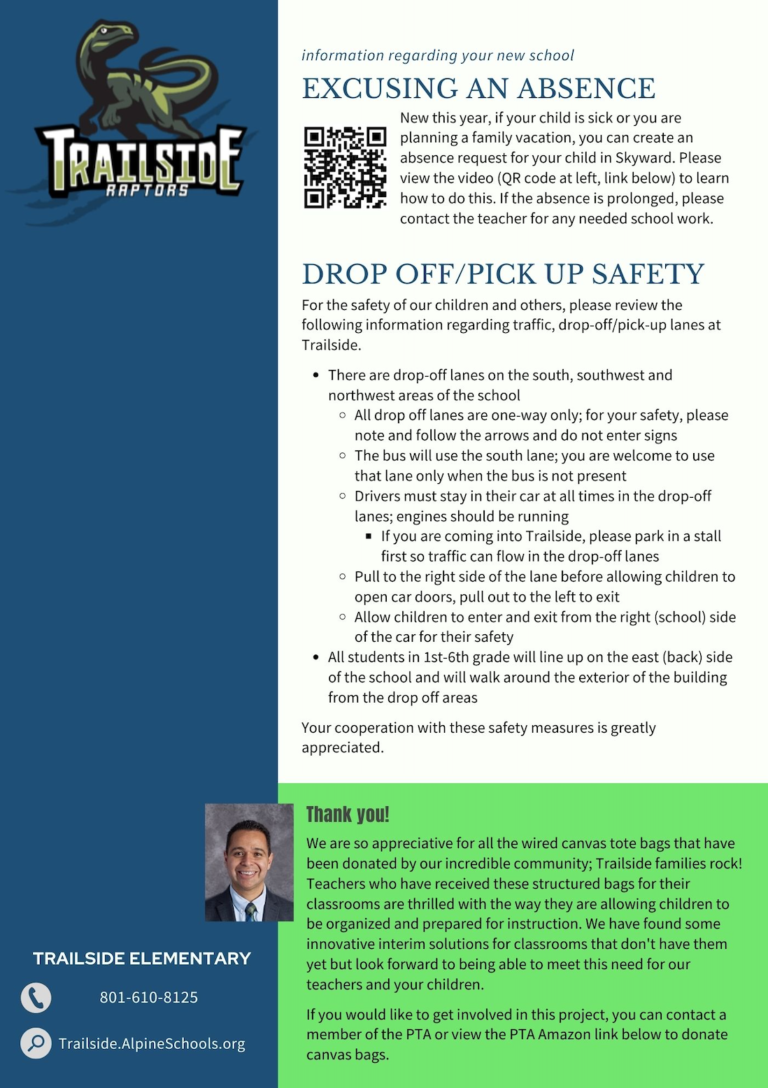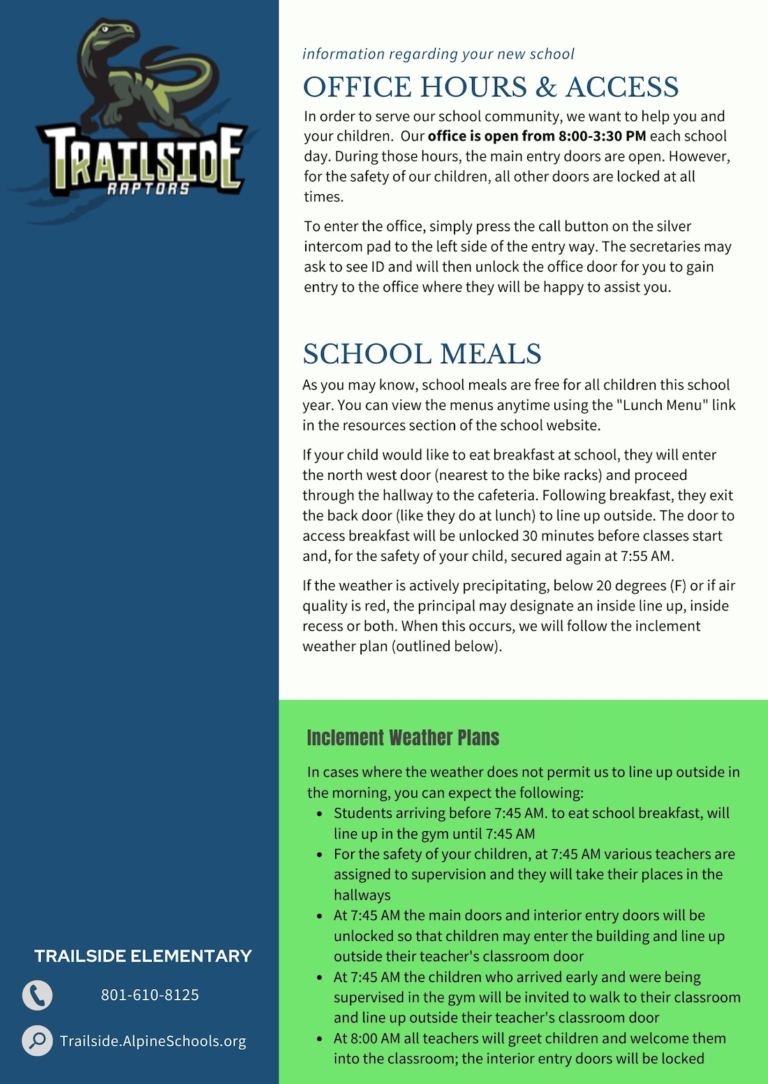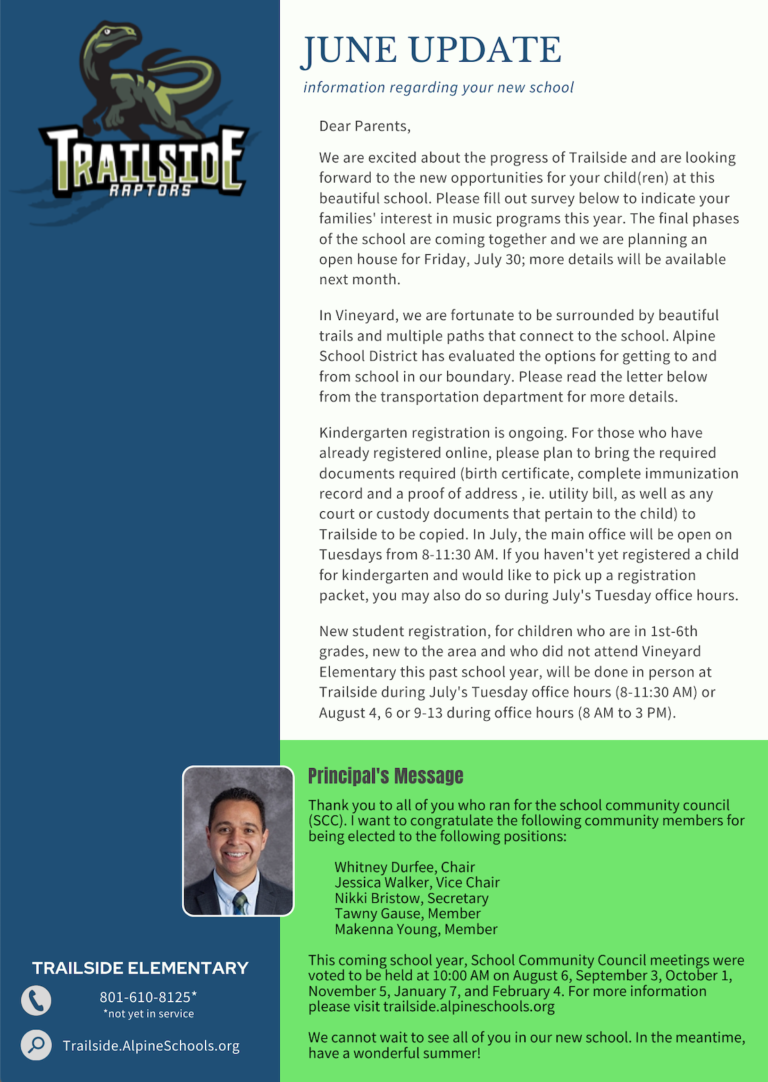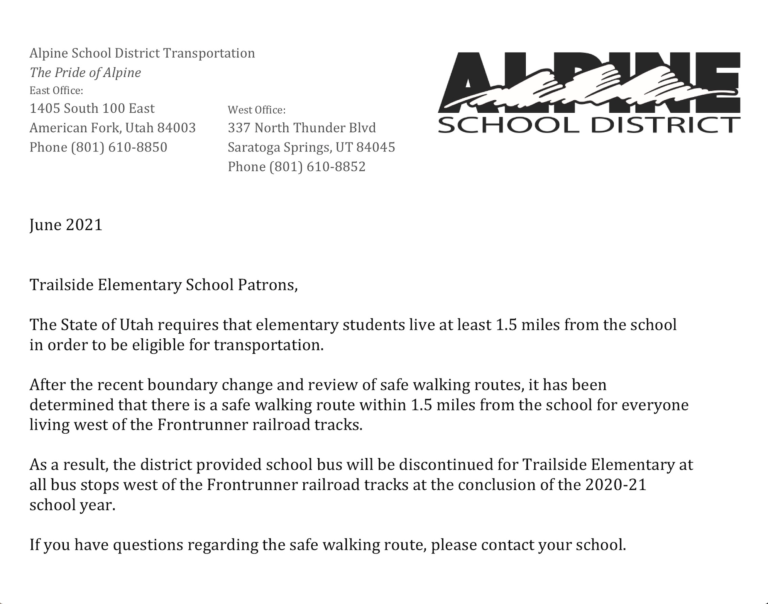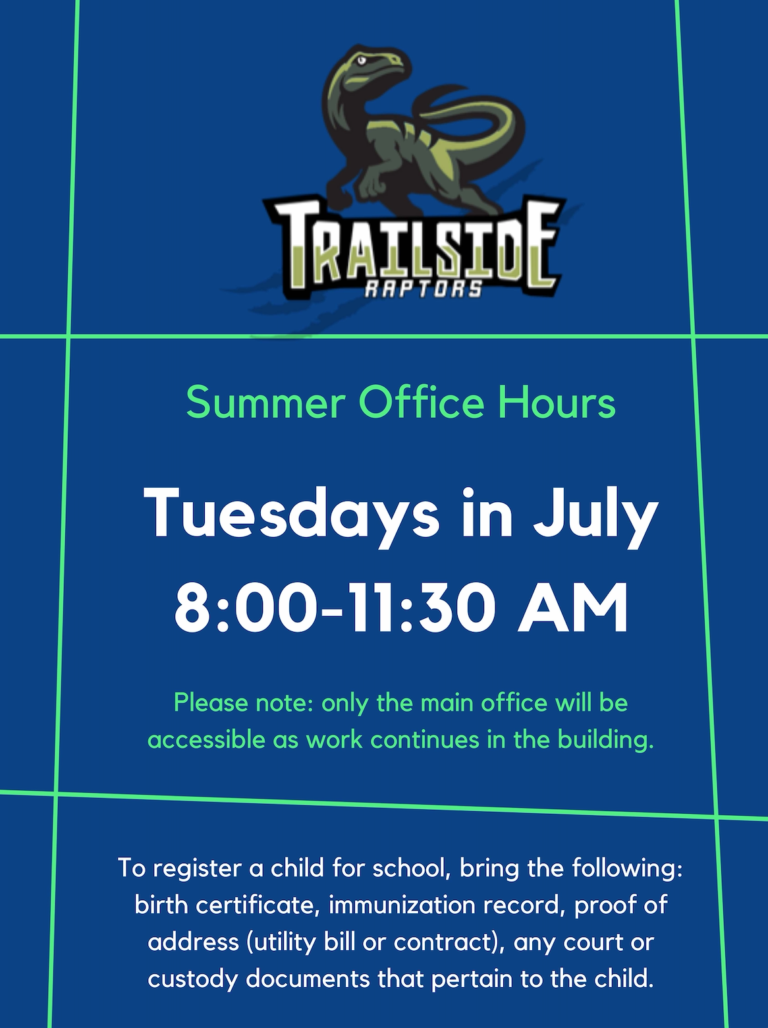April 2024
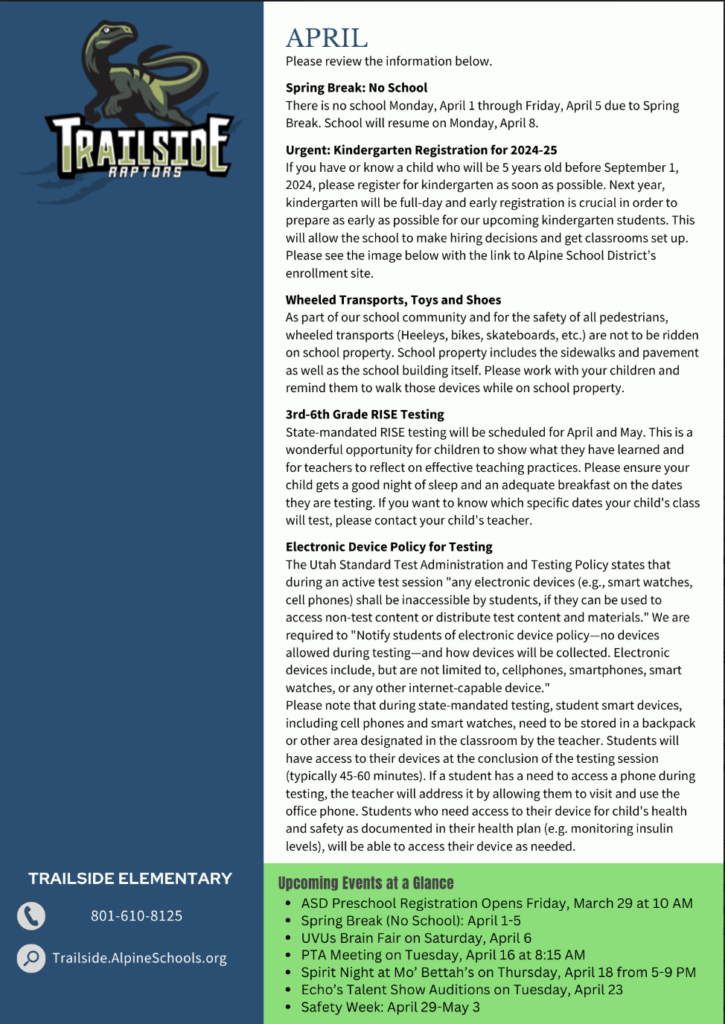
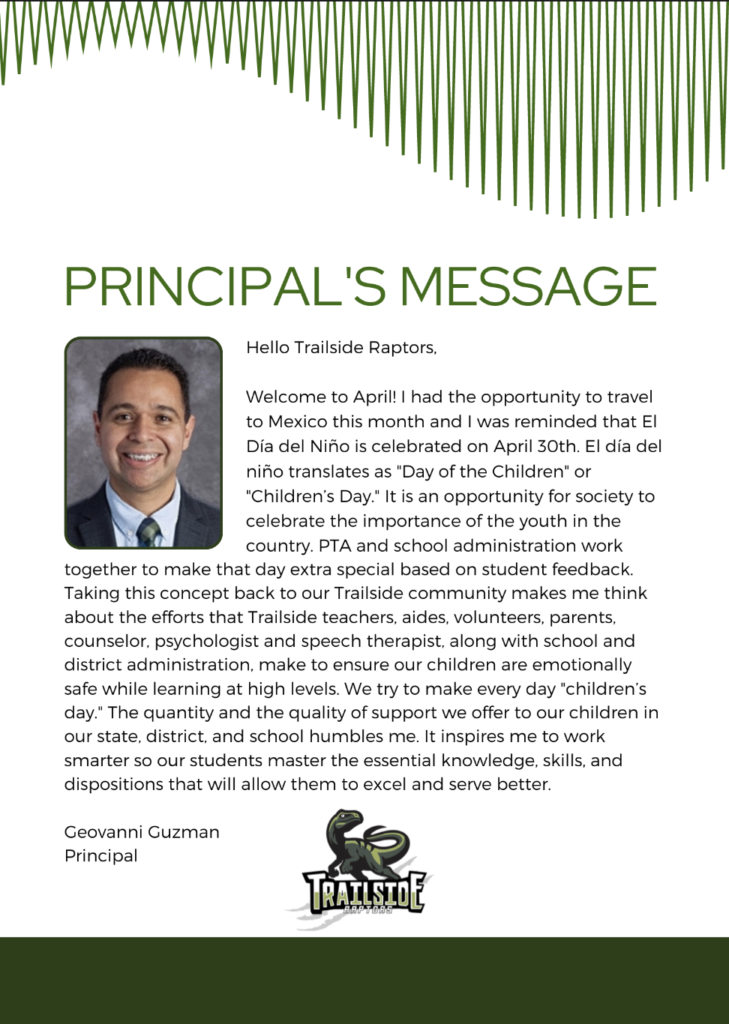
March 2024
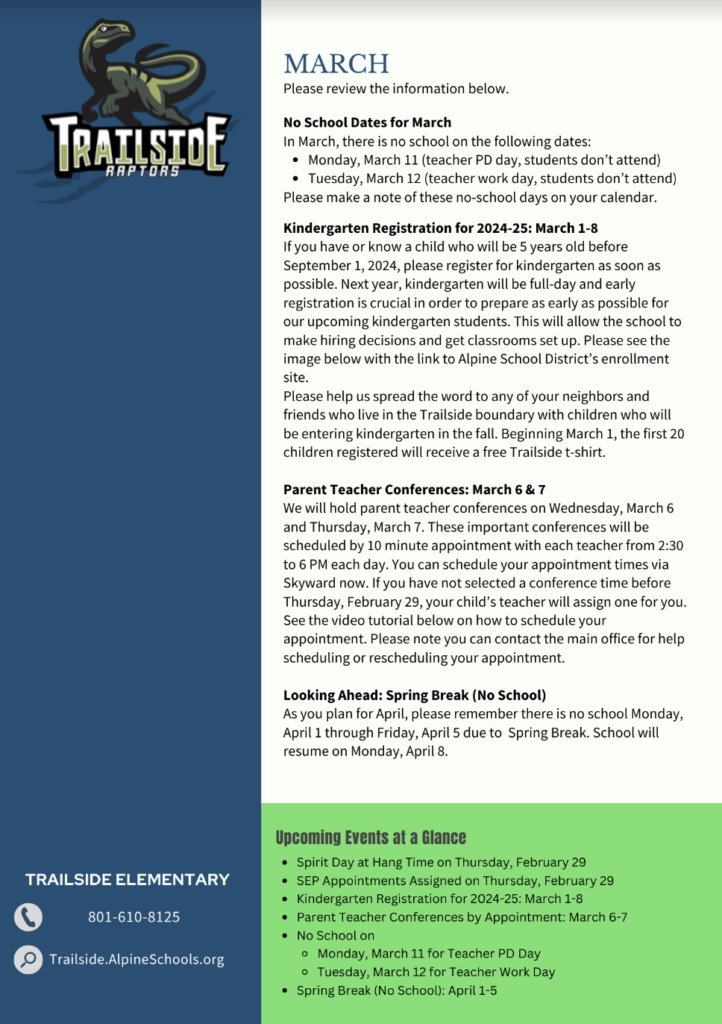
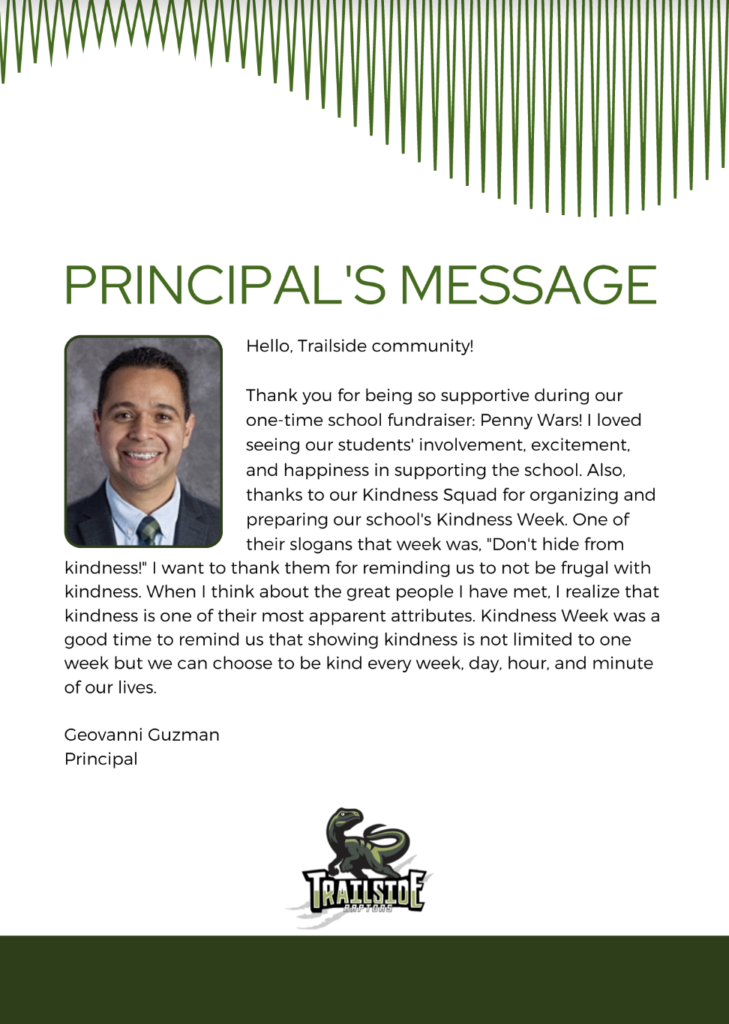
February 2024

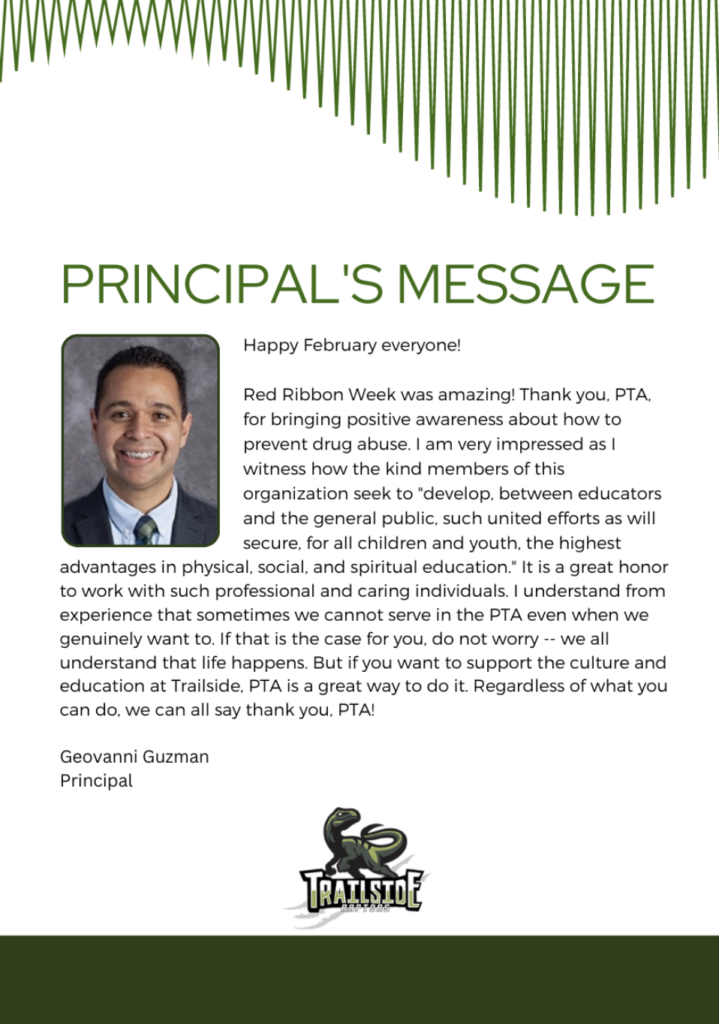
January 2024
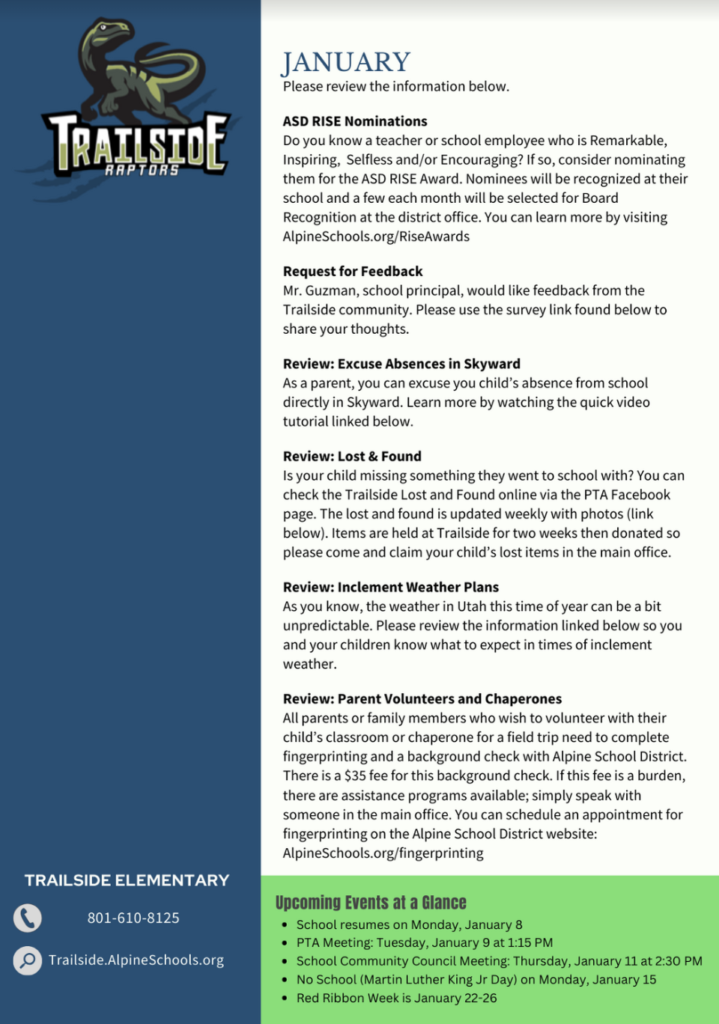
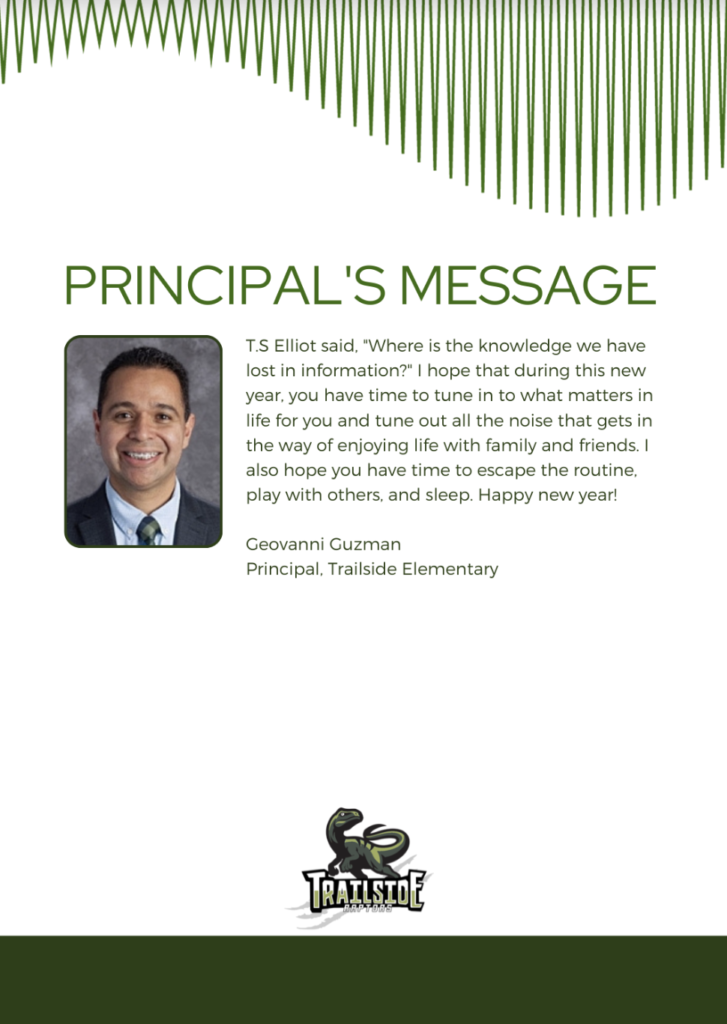
December 2023
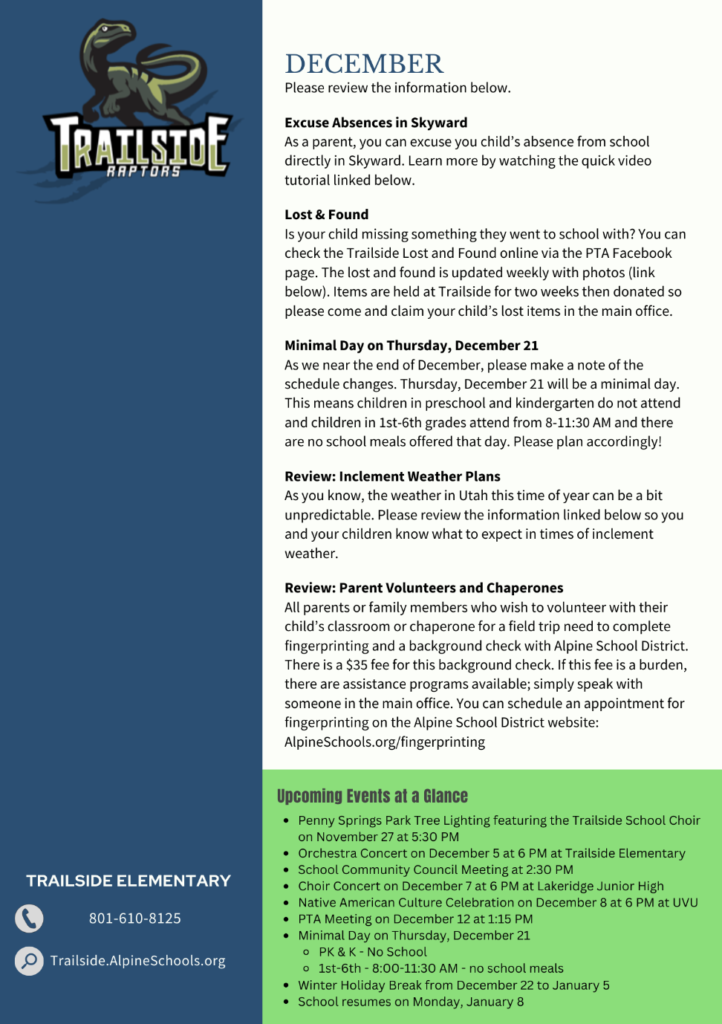

November 2023
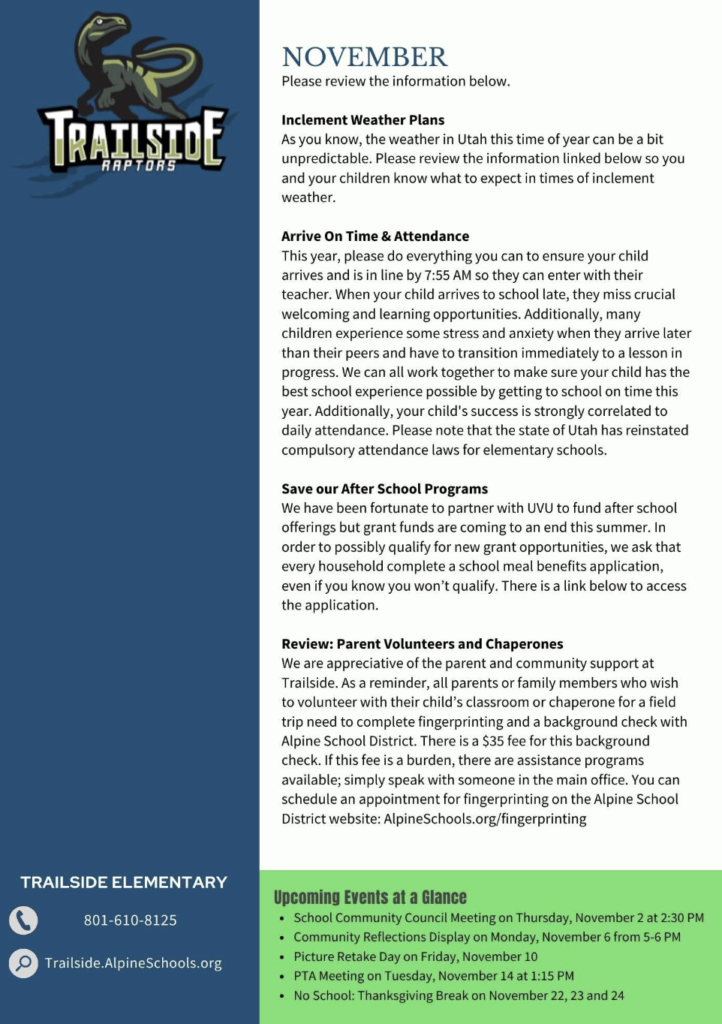
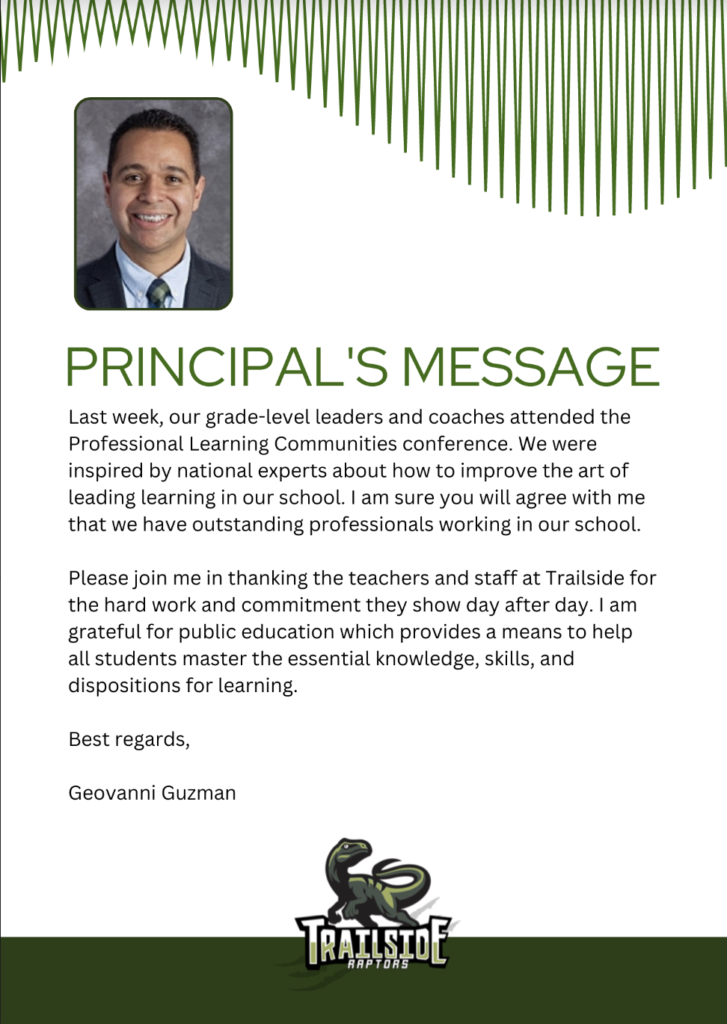
October 2023
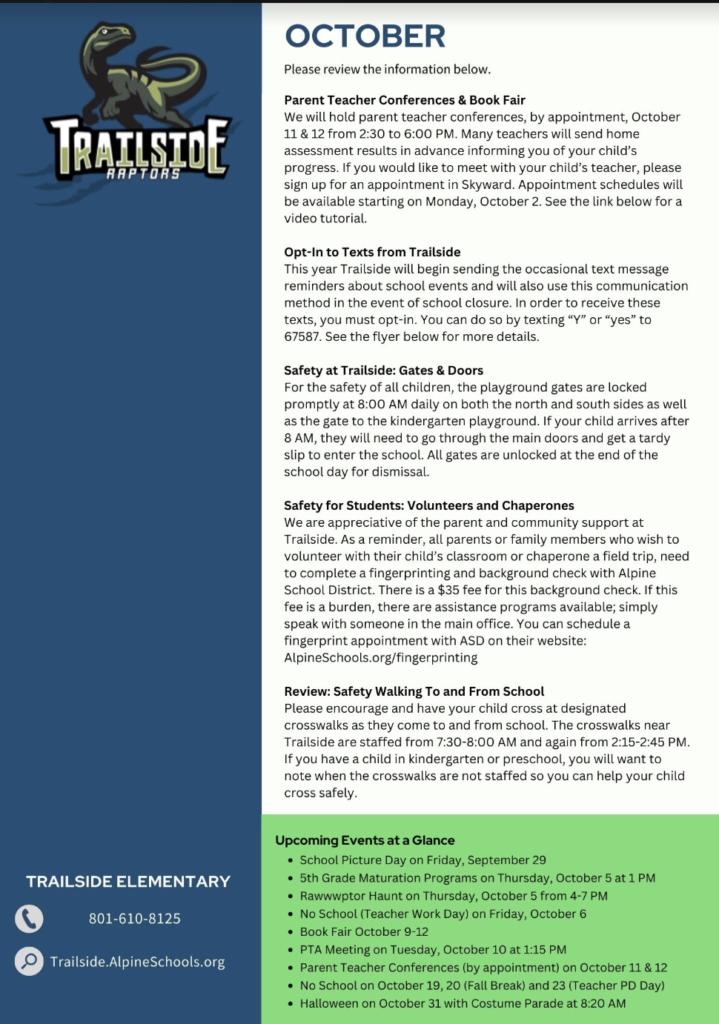
September 2023
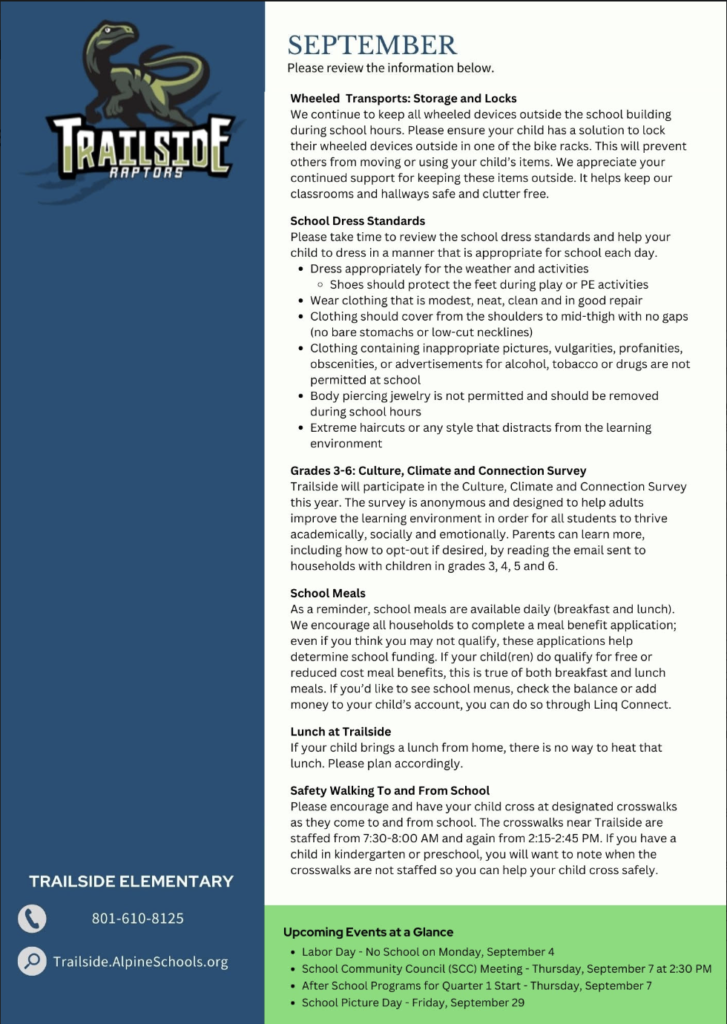
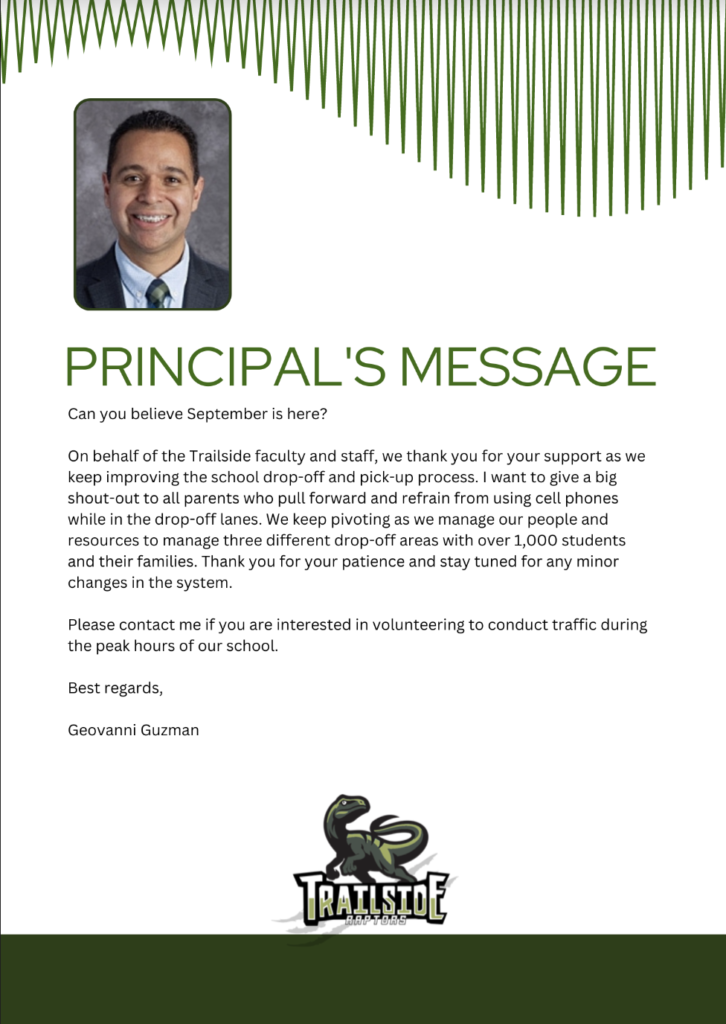
August 2023
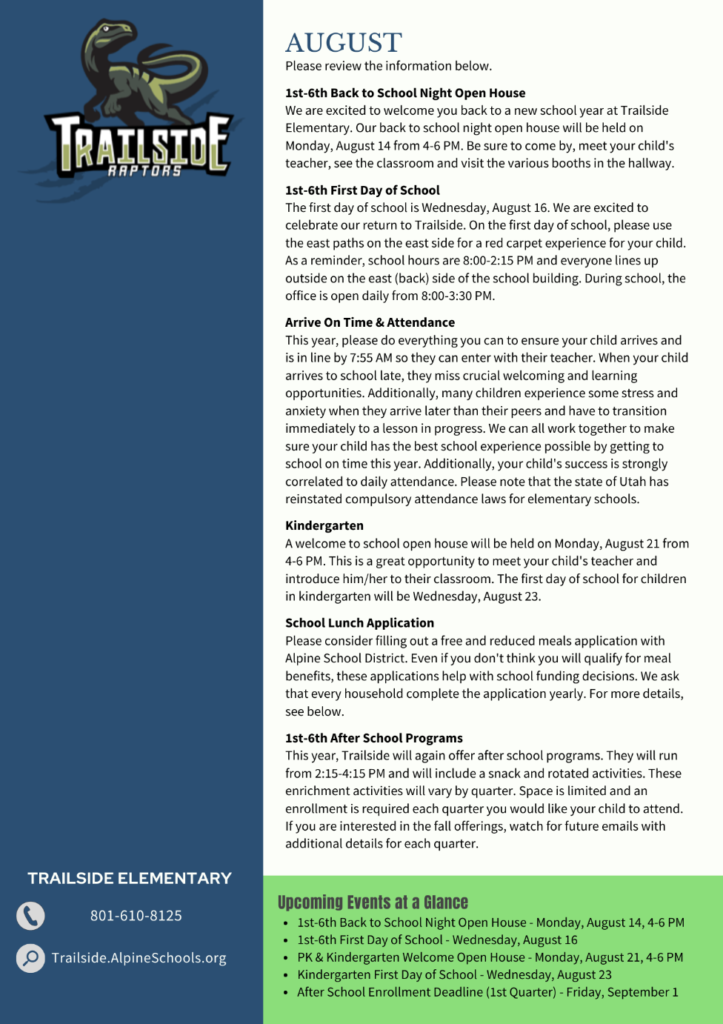
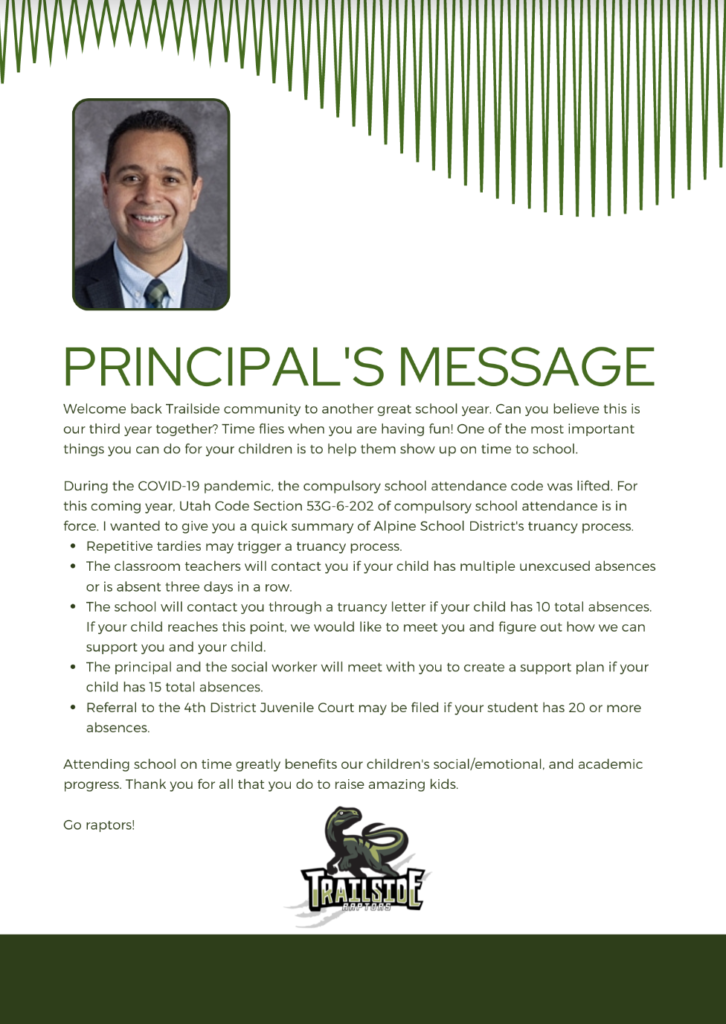
May 2023
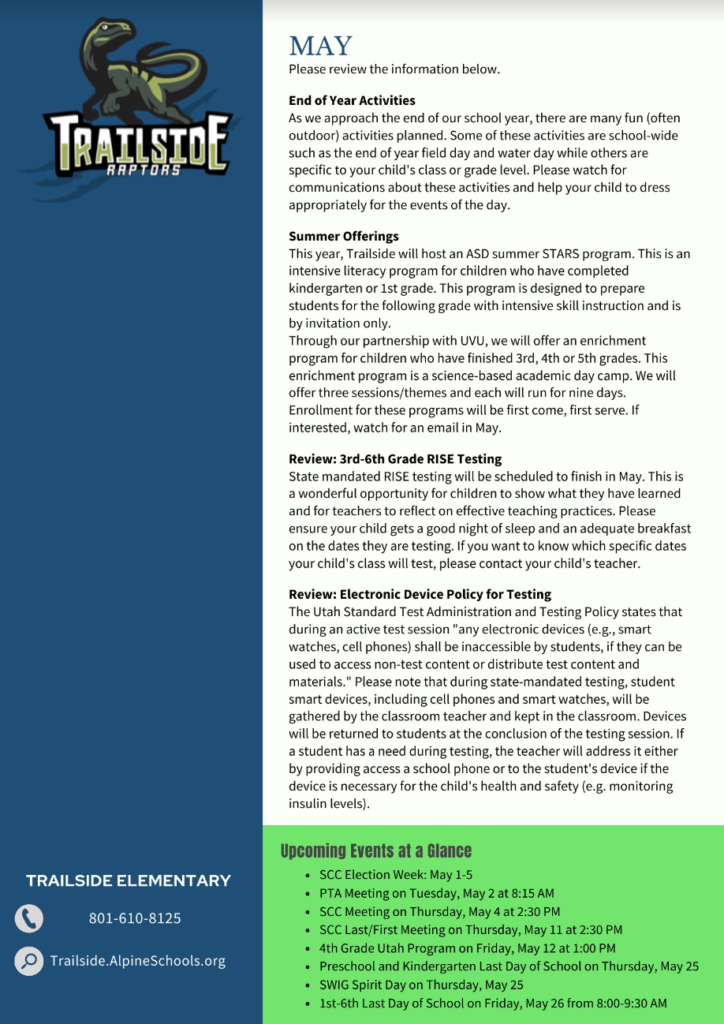
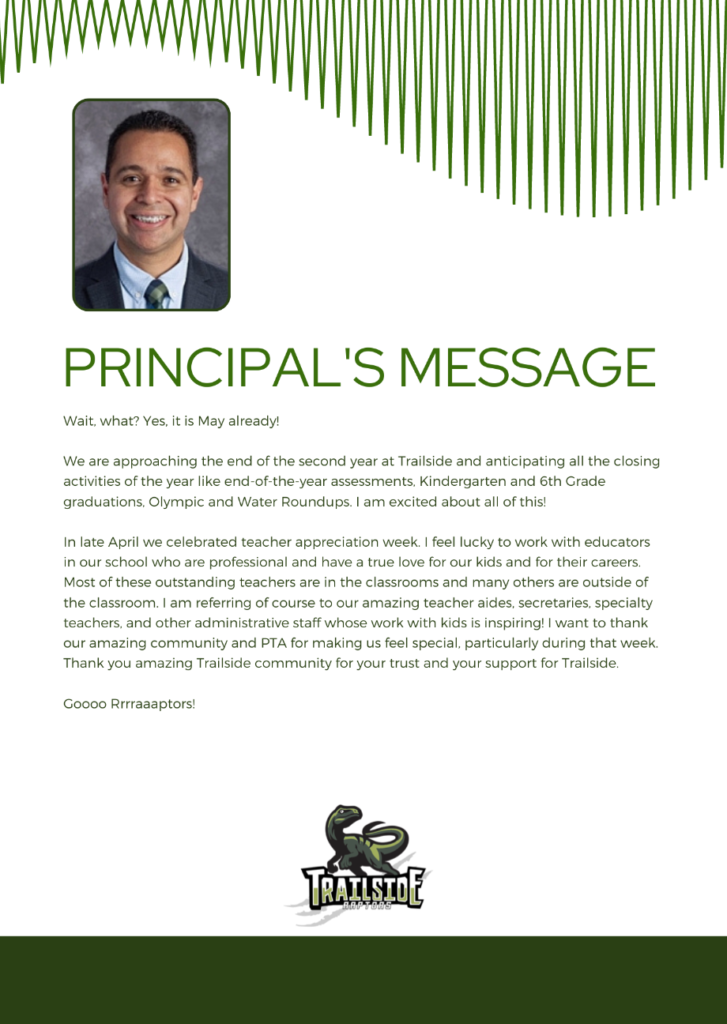

Parents are the first people to teach and set standards for your family–including electronics! Phones and electronics help kids feel connected and confident, but we also must learn when to turn them off! Take time to teach your child about finding a balance when using electronics.
Make sure you are intentional about electronic use in your home!
Tips for helping kids learn how to unplug–
- Model behavior
- Educate yourself about electronics
- Create “Technology-Free Zones”
- Set aside times to unplug
- Use parental controls
- Talk to kids about too much screen time
- Offer alternative activities
When talking about trusting your child with handling electronics, Michelle Porcelli said, “Let them know you have confidence in them.”
Building trust in your relationship with your child will make all the difference!
April 2023
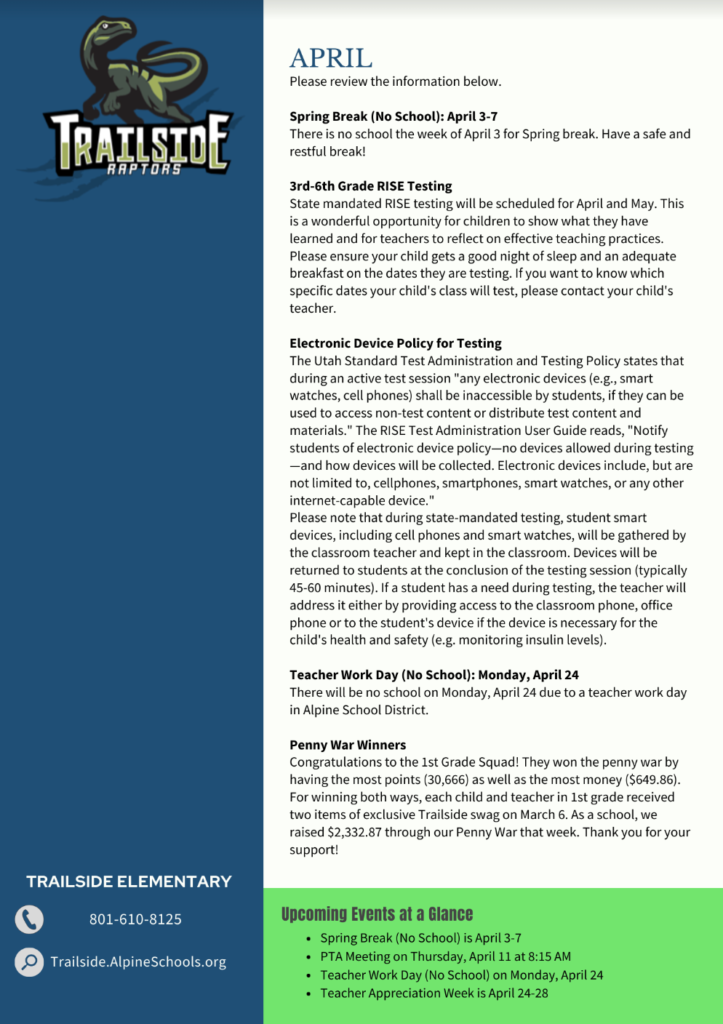
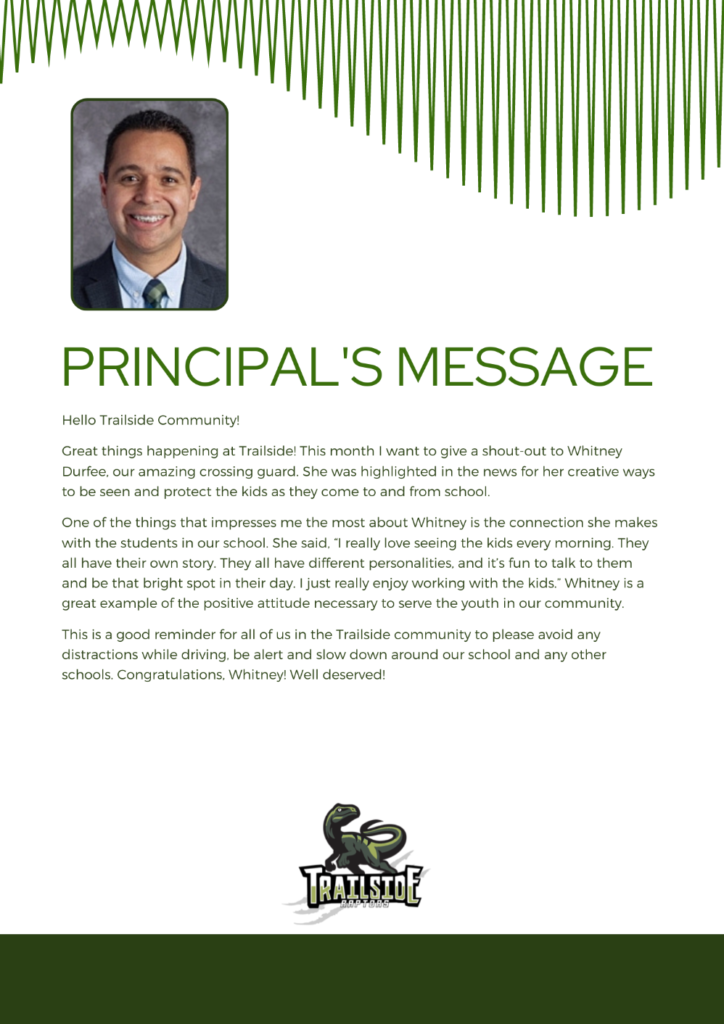
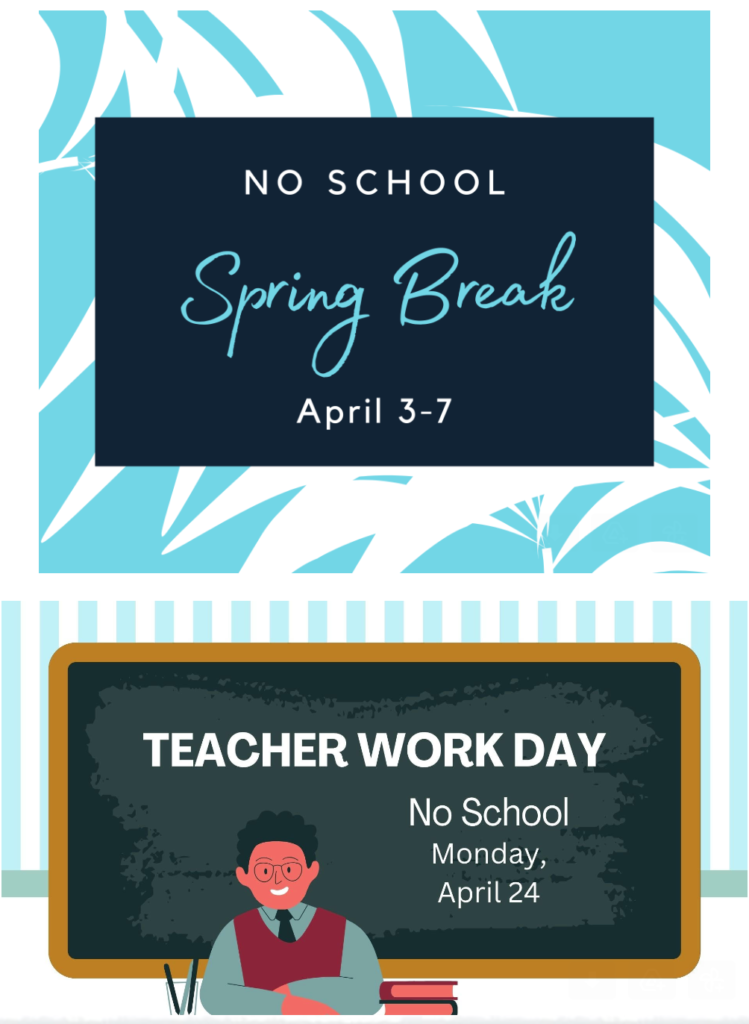

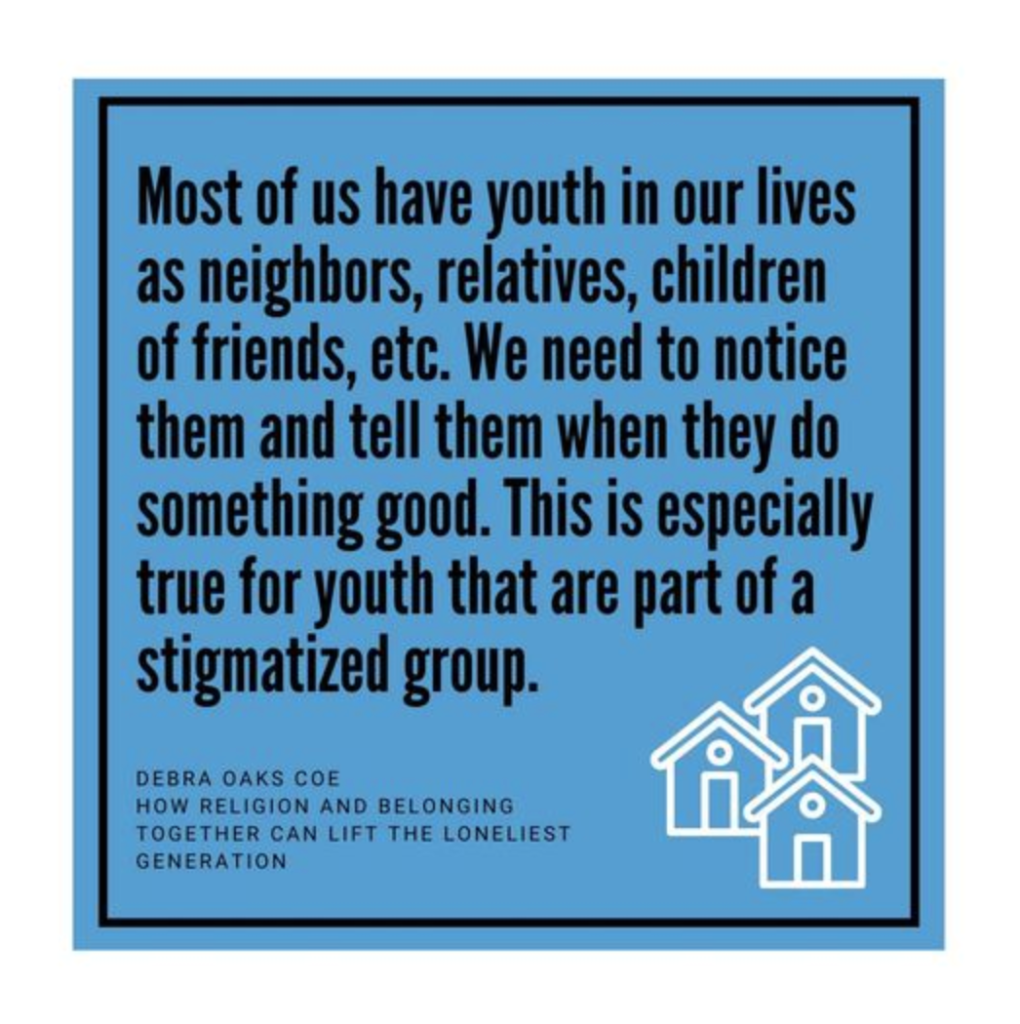
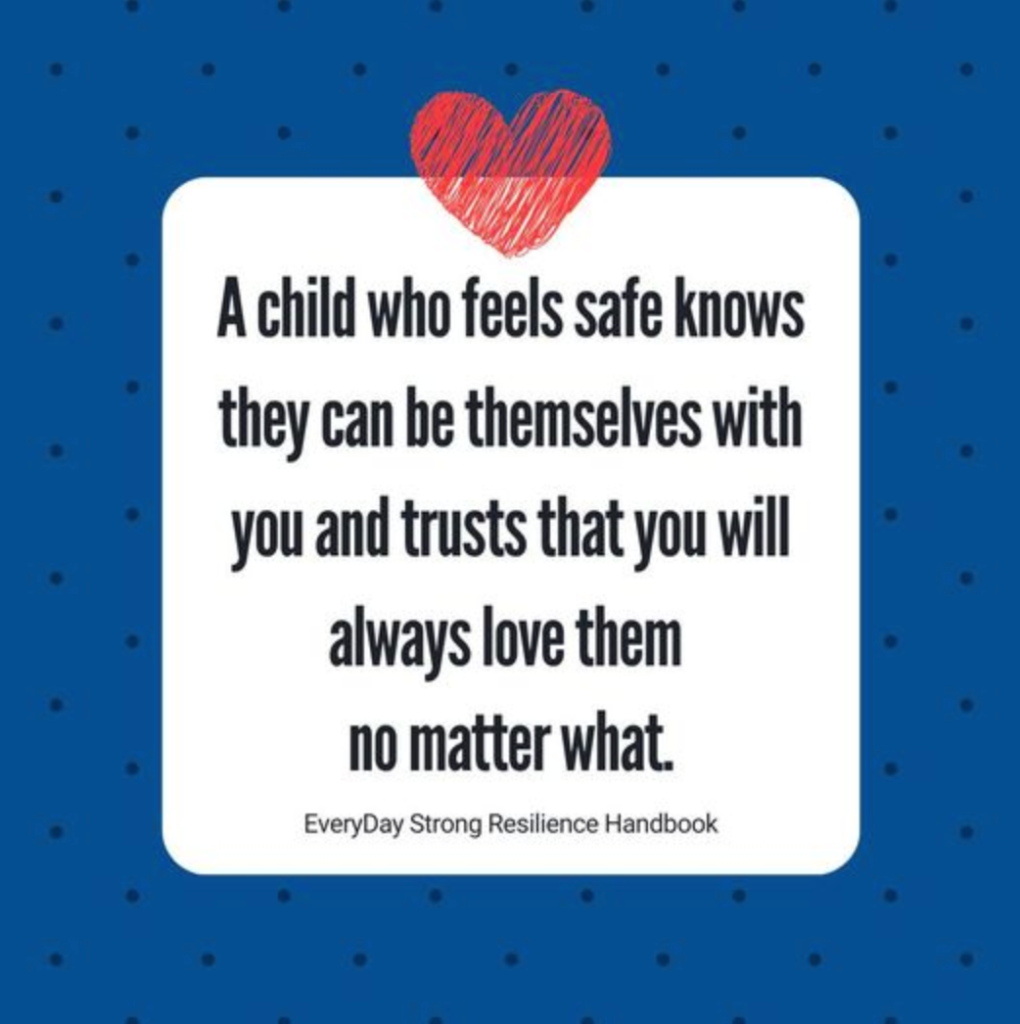
March 2023
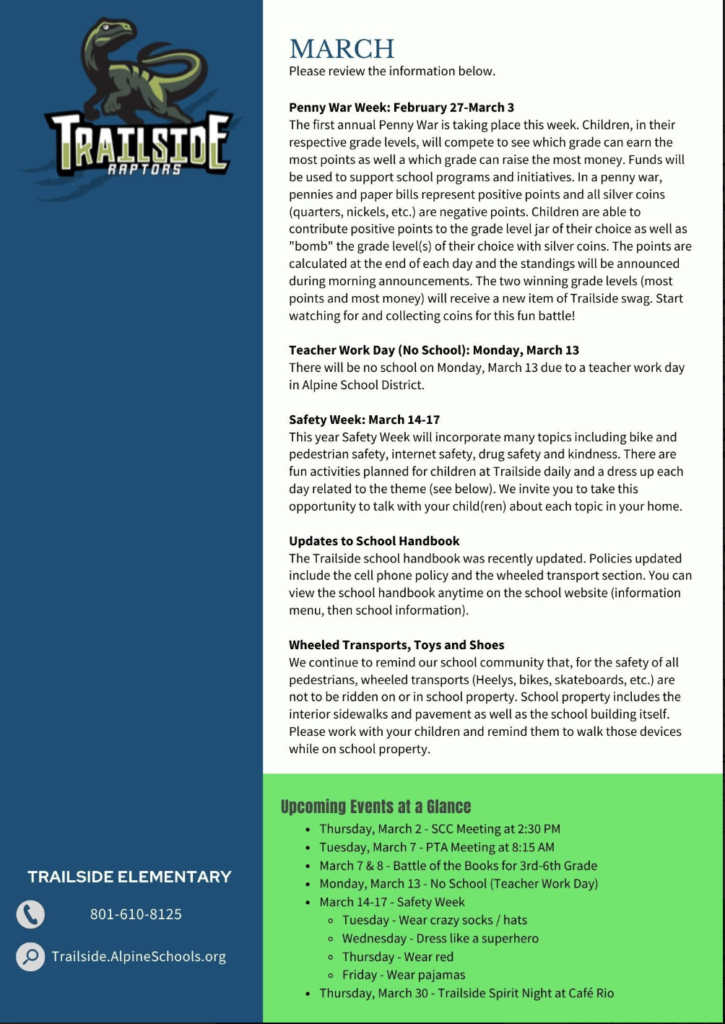
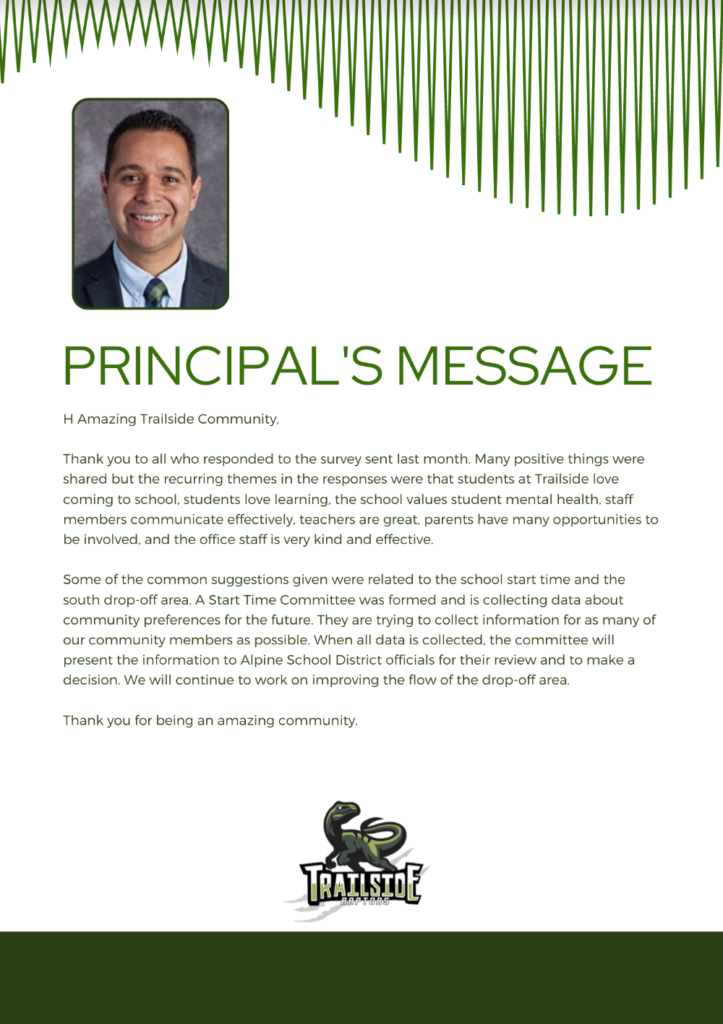
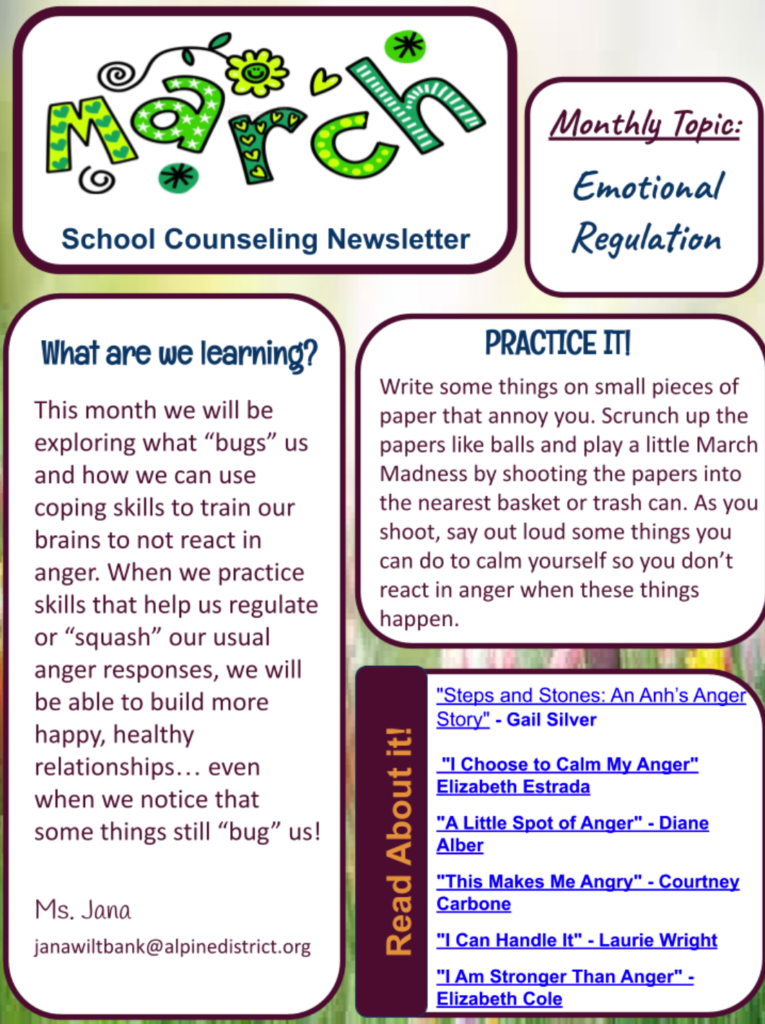
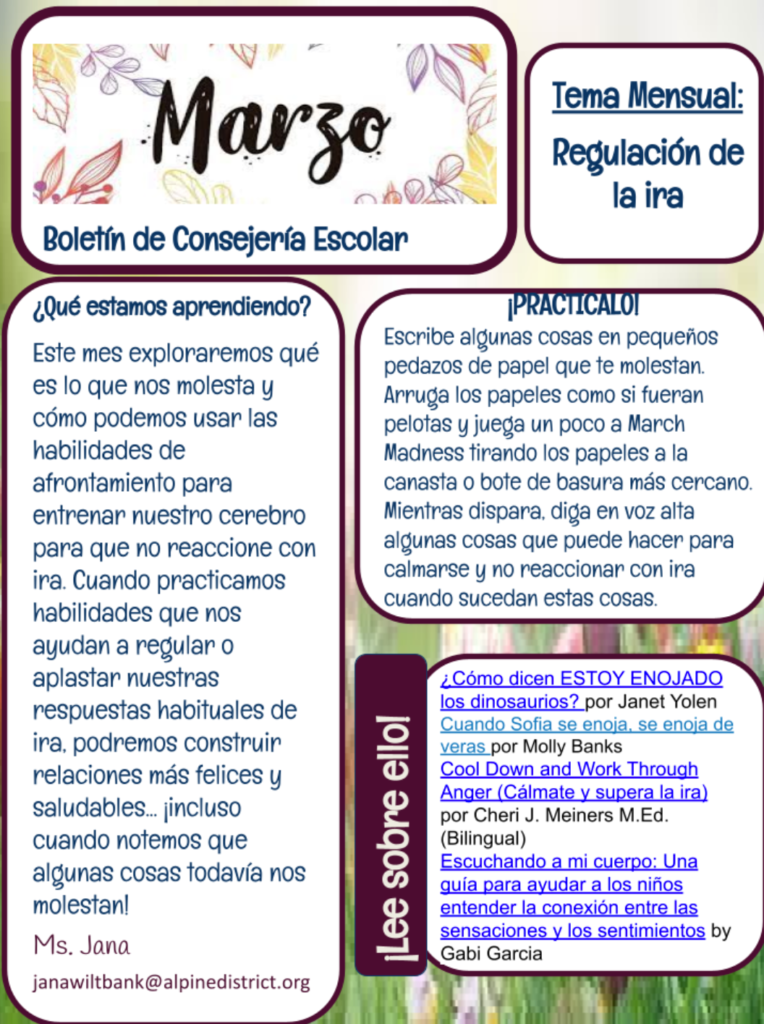
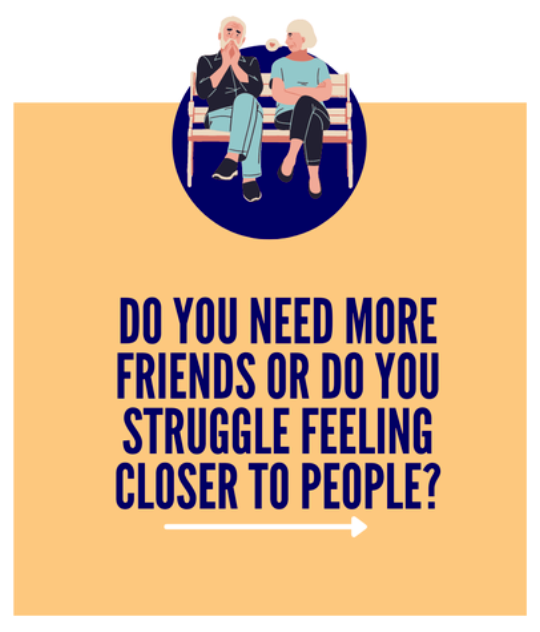
Read this article from Kaiser Permanente Healthcare about how to build resilience within yourself!
Spoiler alert: We need friends! We need them to thrive. We need to feel connected.
It can be challenging to have enough time and effort to make and maintain friendships.
If you have trouble making meaningful connections, be okay with being vulnerable. Validate that being vulnerable is awkward. Take that risk of opening up. Showing our true selves and being vulnerable will help build a support network.
Stop comparing yourself to others with larger or “better” friendships. Comparing yourself will only hinder your ability to make friendships.
Don’t assume. Reach out to that friend; even if you feel like they have their own friends, they’re busy.
You can’t give from an empty bucket. If you are carrying things that are not helping you meet your needs, maybe you need to offload some of them to have space in your life for meaningful connections.
We need other people to support us in times of need, in times of celebration, and in times of ordinary moments. Seek out friendships despite the challenges. They help fill our needs up, which makes us that much stronger to feel the needs of those around us, like our kids.
Click the link here to hear what Collette Loveless has to say about connecting with others better and strategies if you struggle to make and maintain friendships. You’ll actually start to feel like you can connect with your kids better.
February 2023
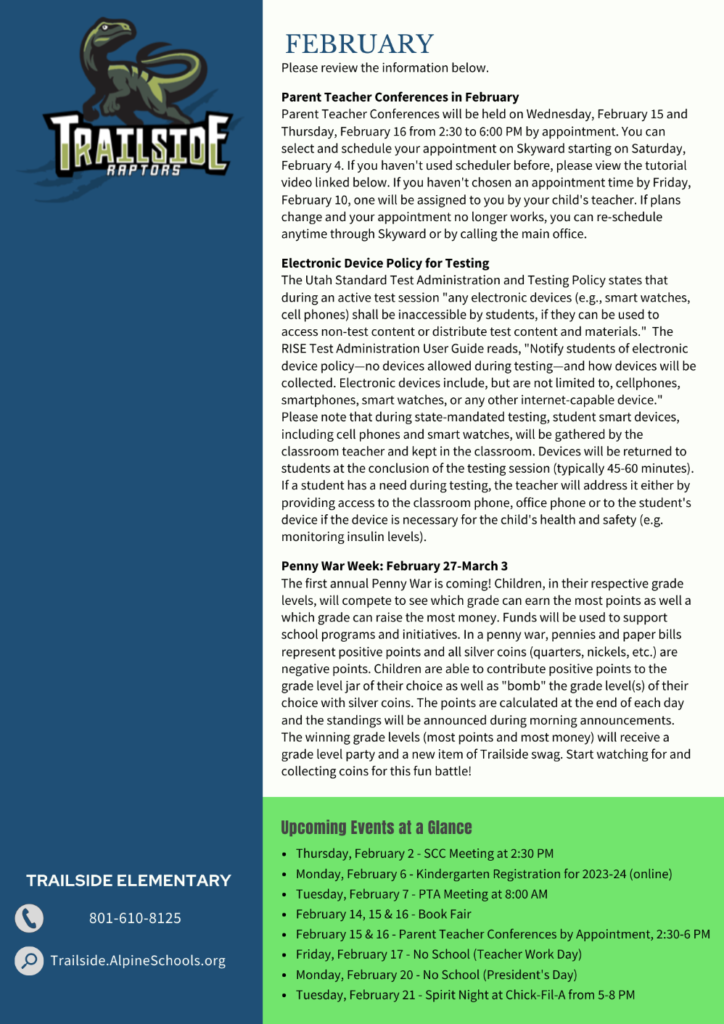
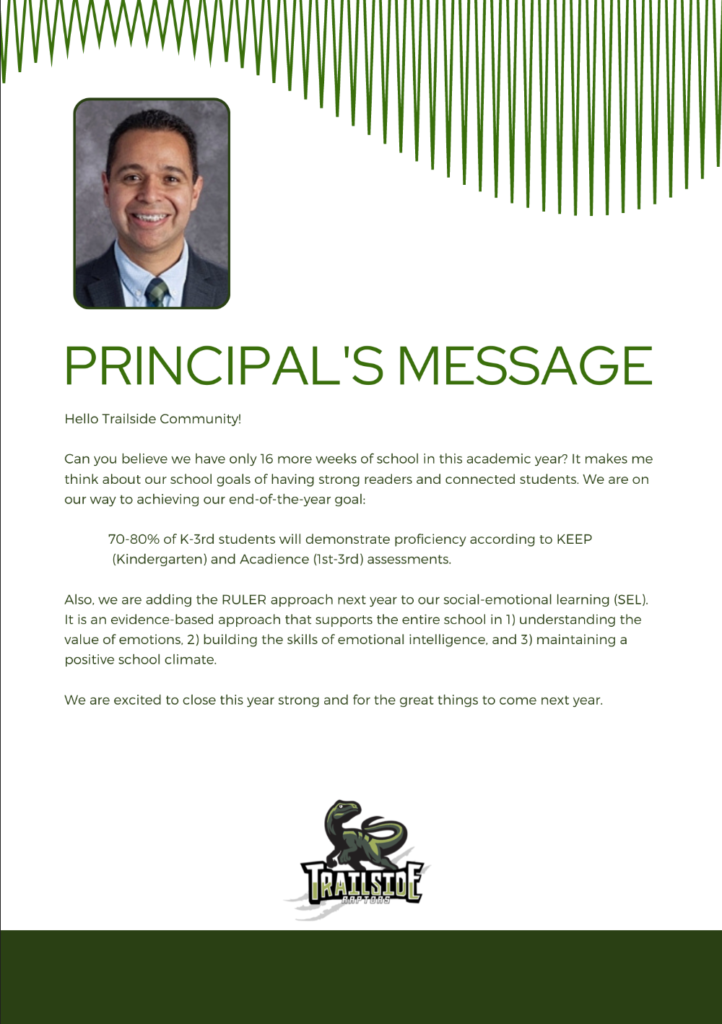

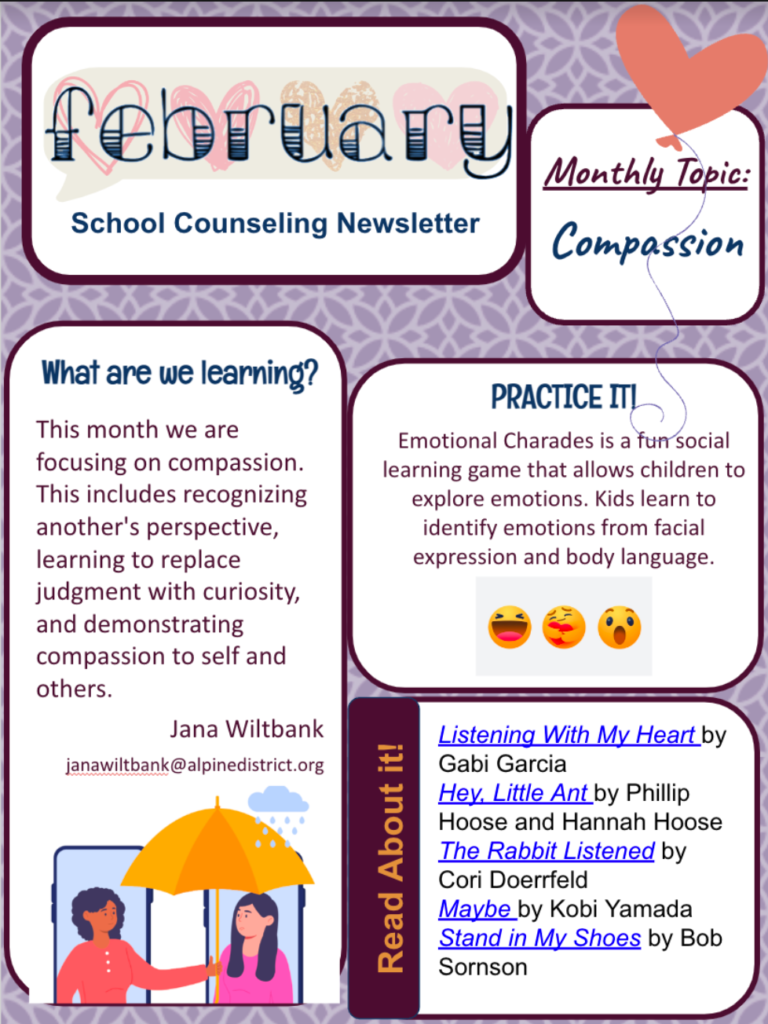
January 2023
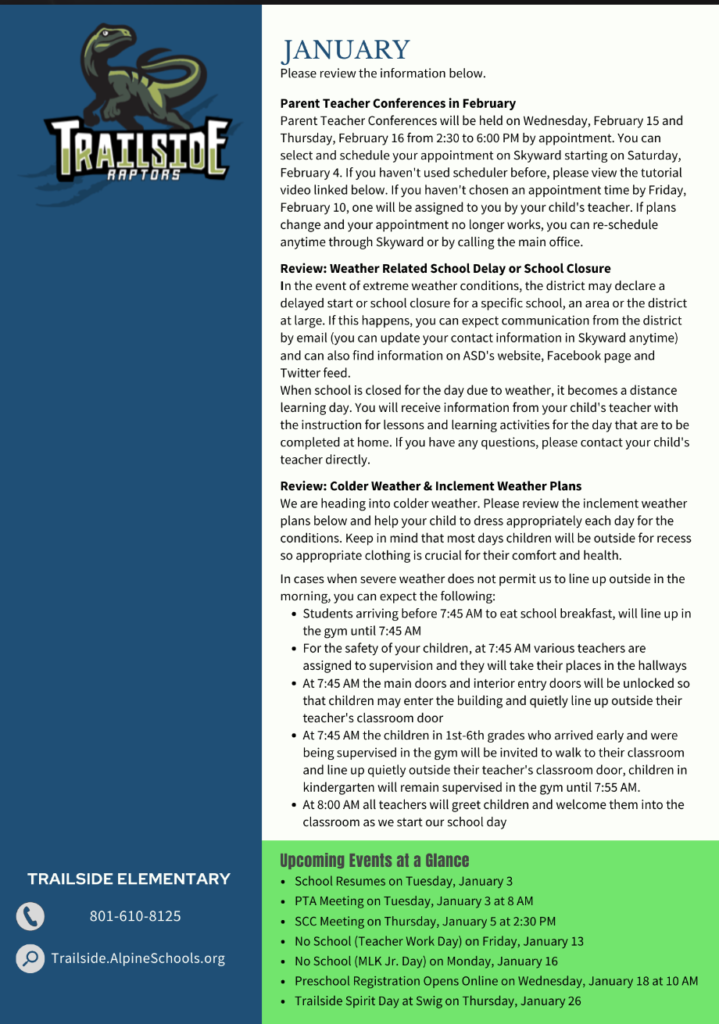
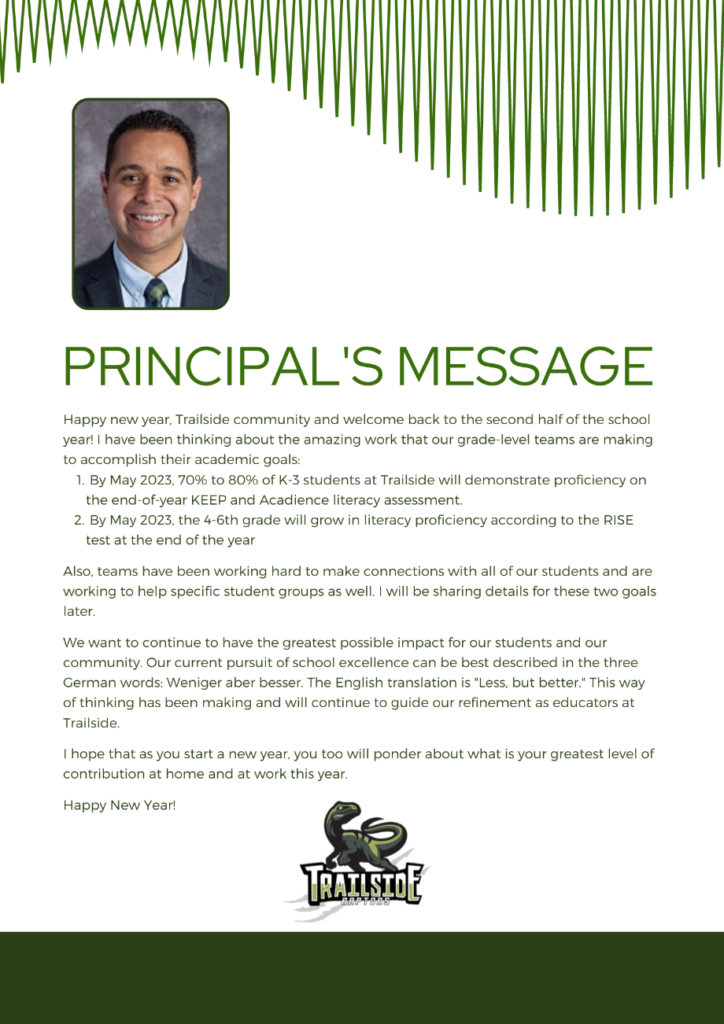



“I can be creative to get my needs met.”
At EveryDay Strong, we talk a lot about figuring out what our child needs. Do they need more sleep, do they need me to spend more time with them, do they need me to teach them a new skill? There are so many needs our child has.
When was the last time you got really strategic about getting your needs met?
When was the last time you took your own needs seriously?
I know, I know. You often simply don’t have the *time* to get a nap in. Meeting up with friends to care for your need for connection feels like one more thing on your to-do list, not a joyful activity.
But here’s the question I want you to ponder: are you not taking that nap because you really, truly don’t have time–or because deep down you secretly believe that everyone else’s needs are more important than your own?
Are you not going out with friends because it really does feel like a drag–or because secretly you feel like if you don’t get everything done on your to-do list, you’re going to be letting people down?
Where can you be a little bit kinder to yourself? Where can you get creative and strategic about getting your needs met? Your needs matter. Caring for yourself matters. You matter.
December 2022
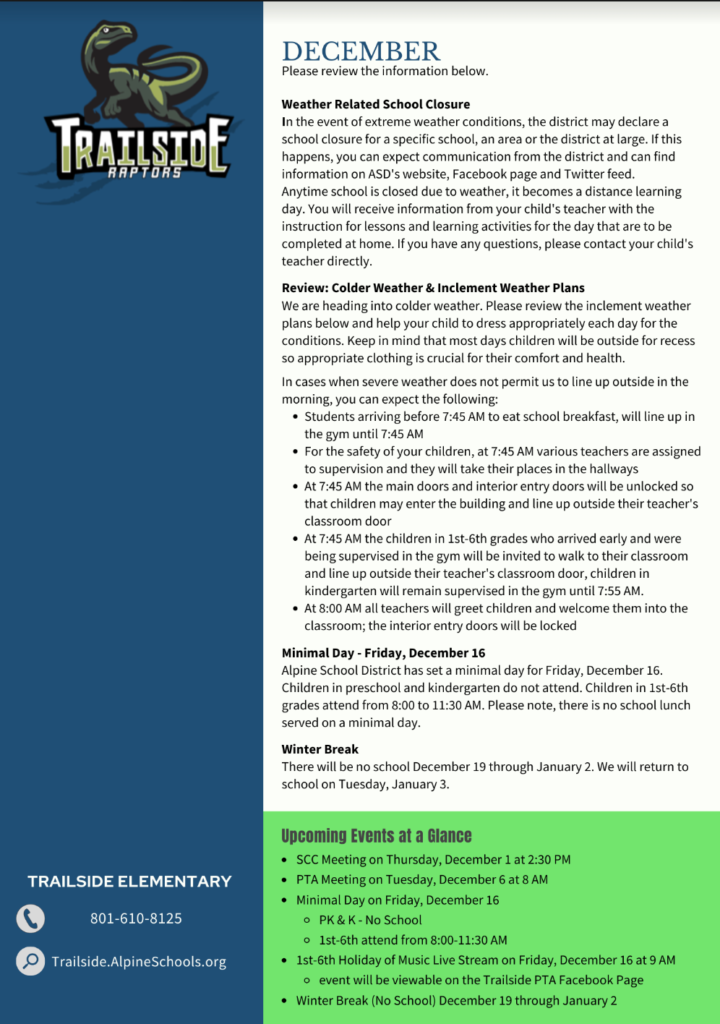
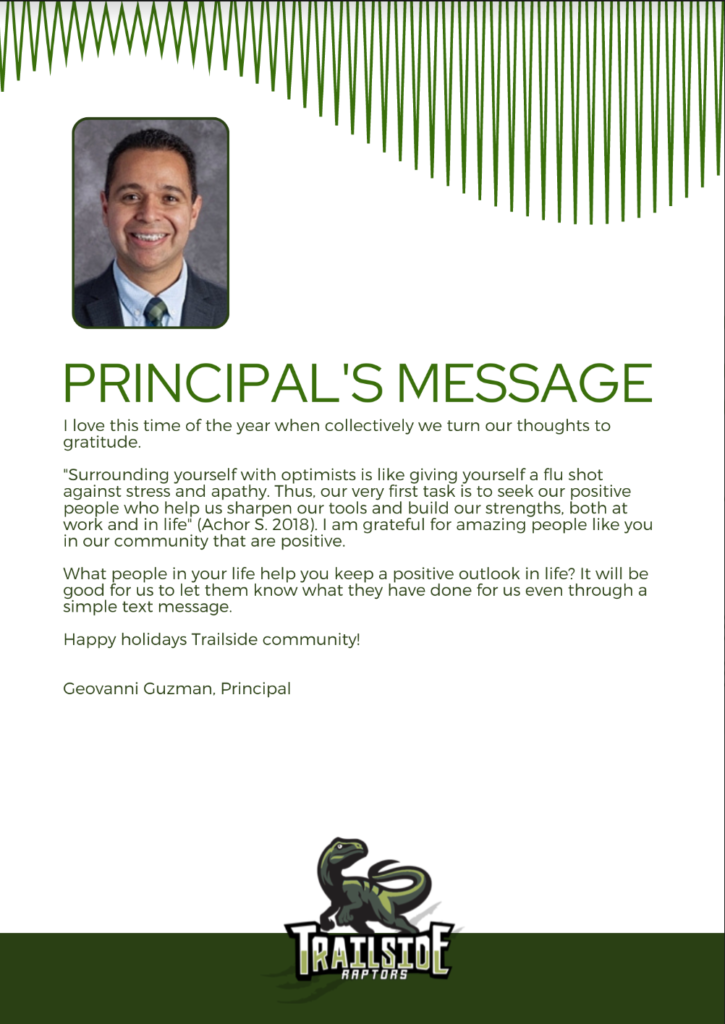
November 2022
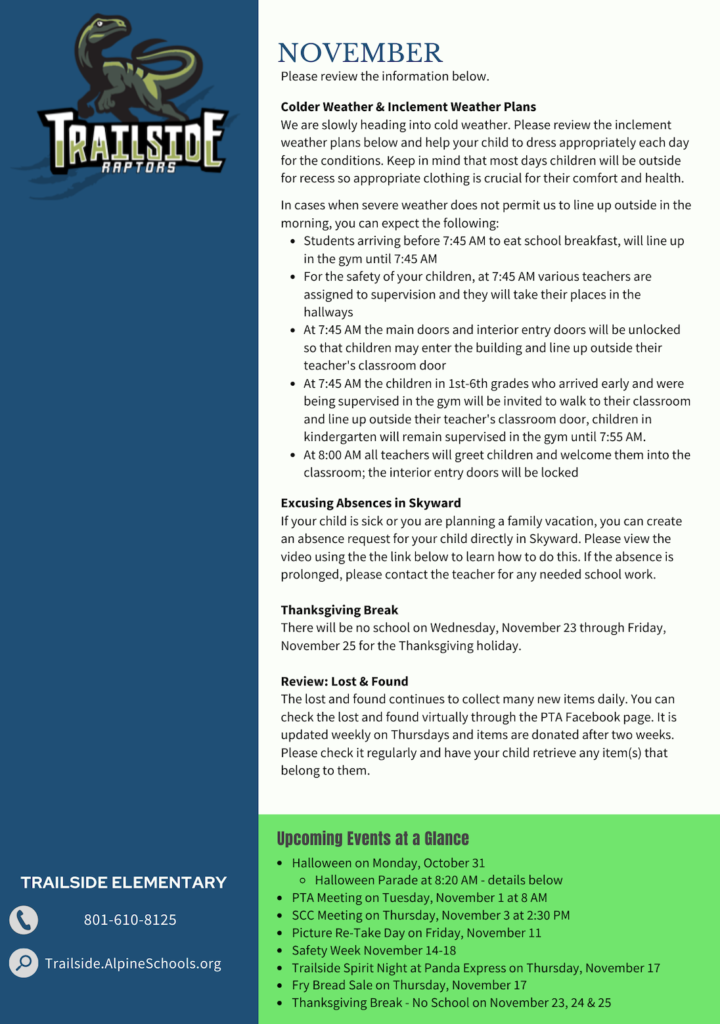
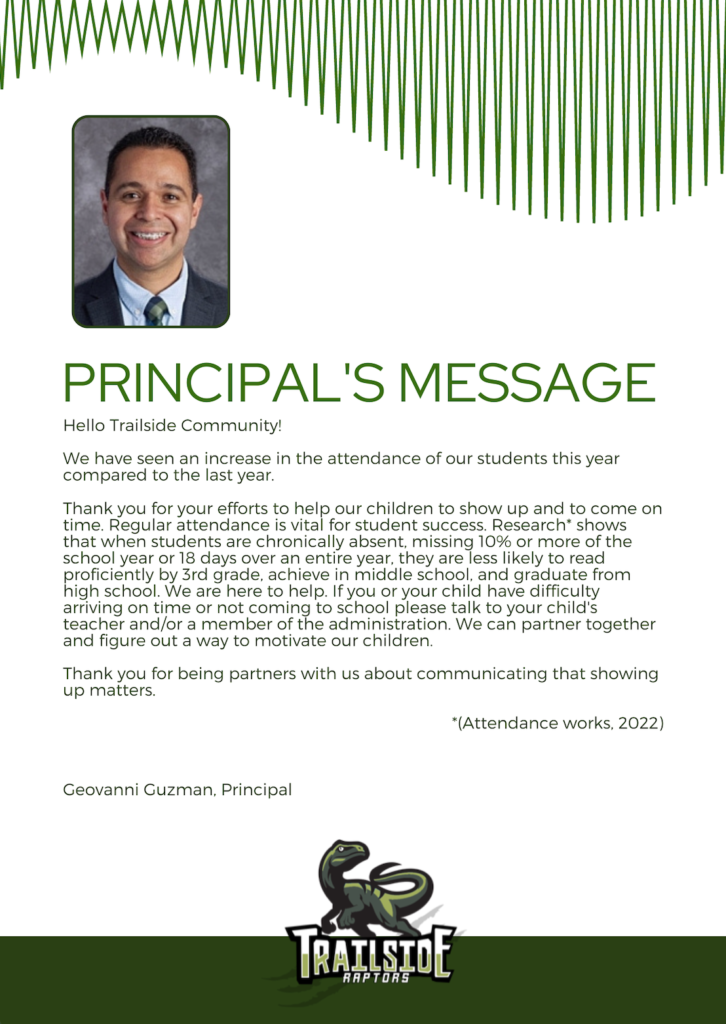


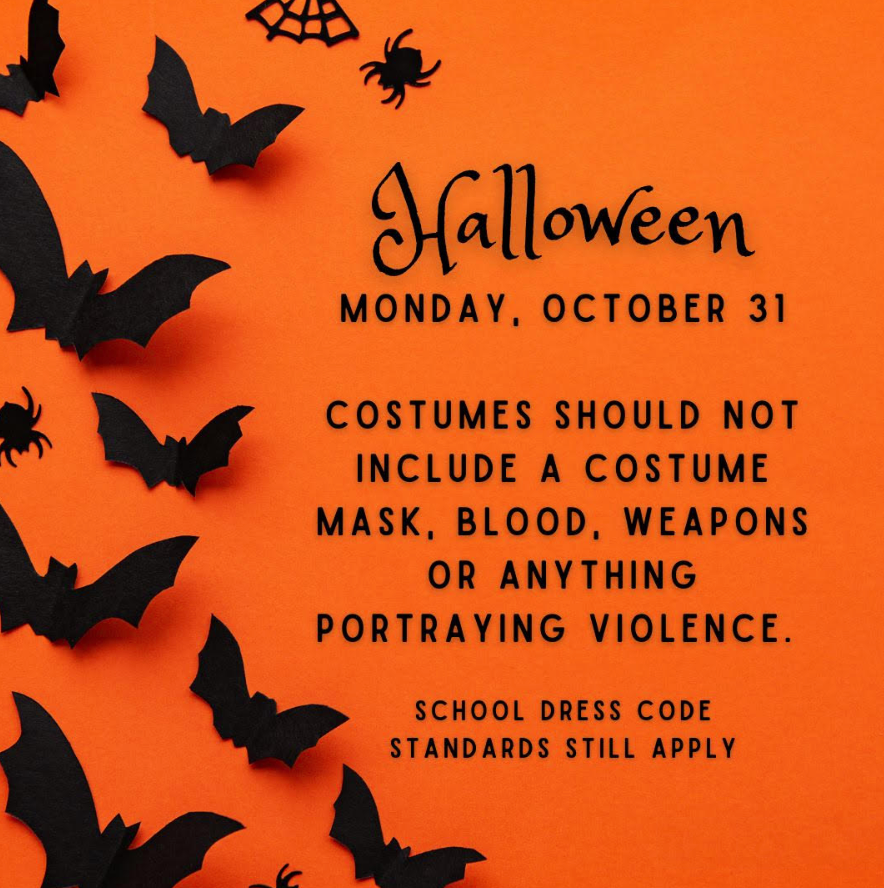
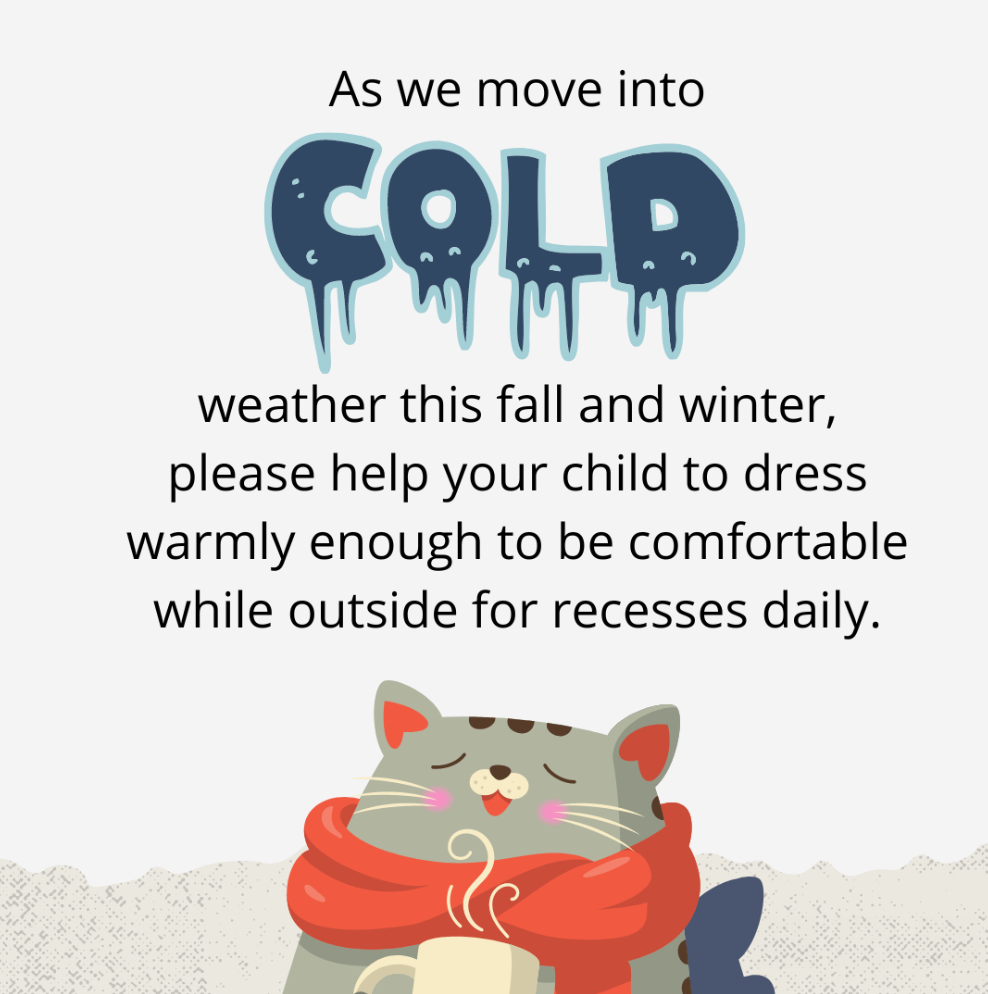

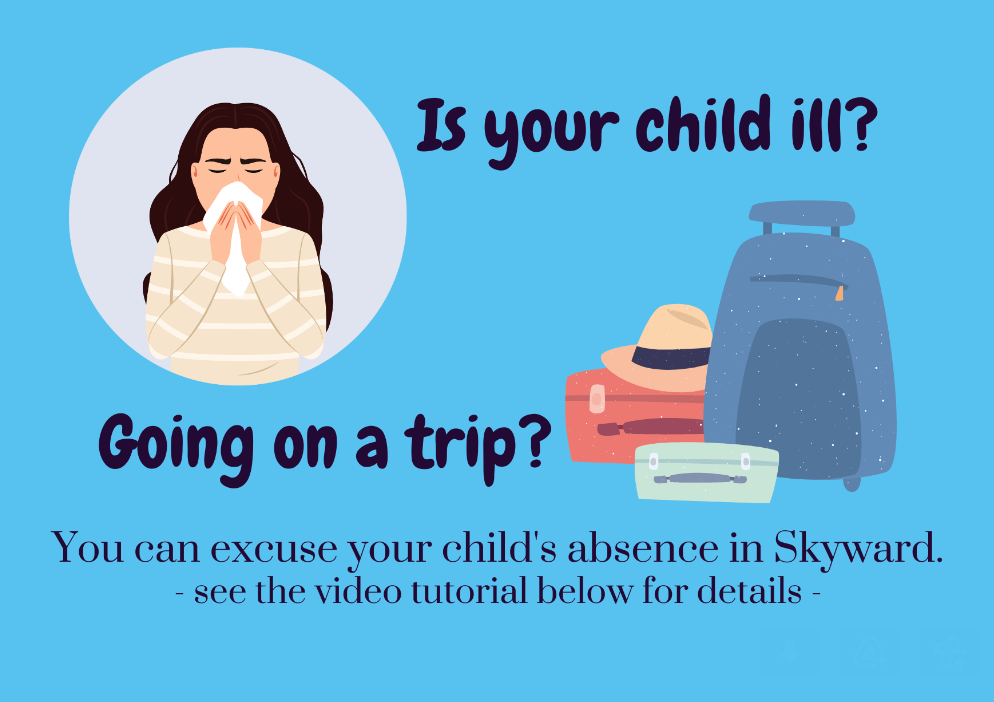
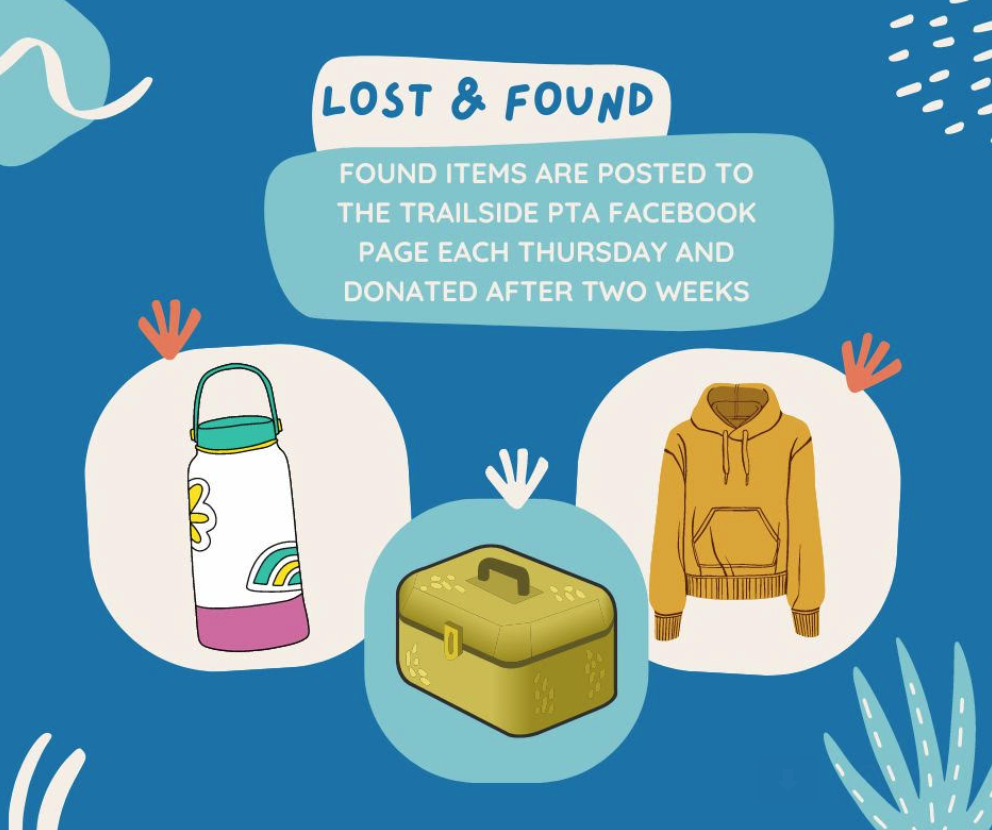
October 2022
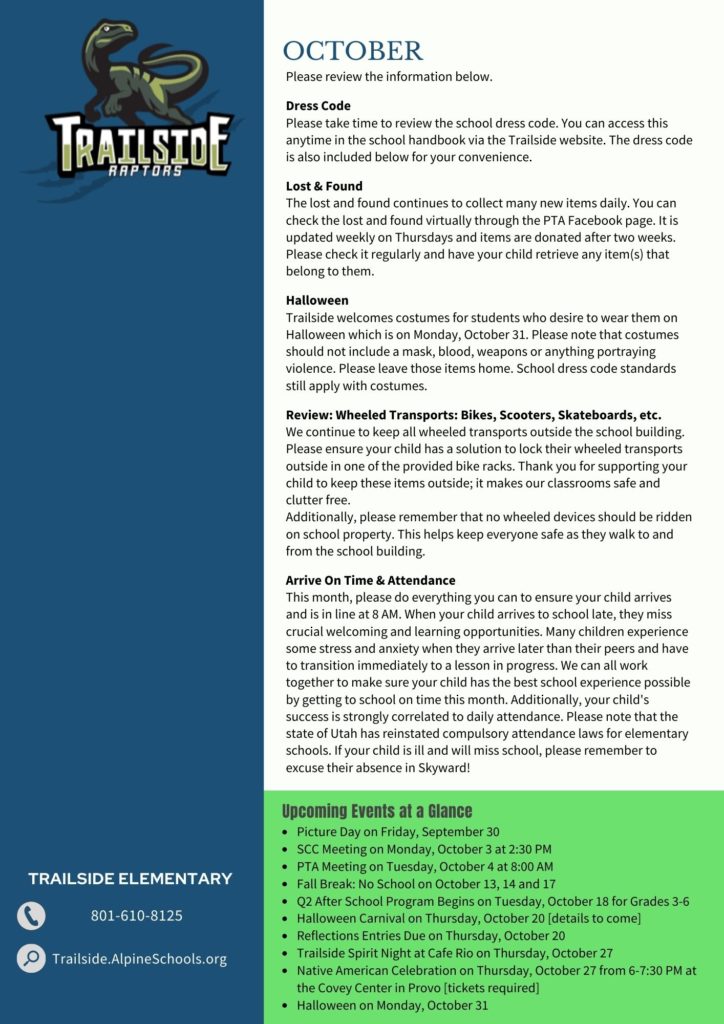
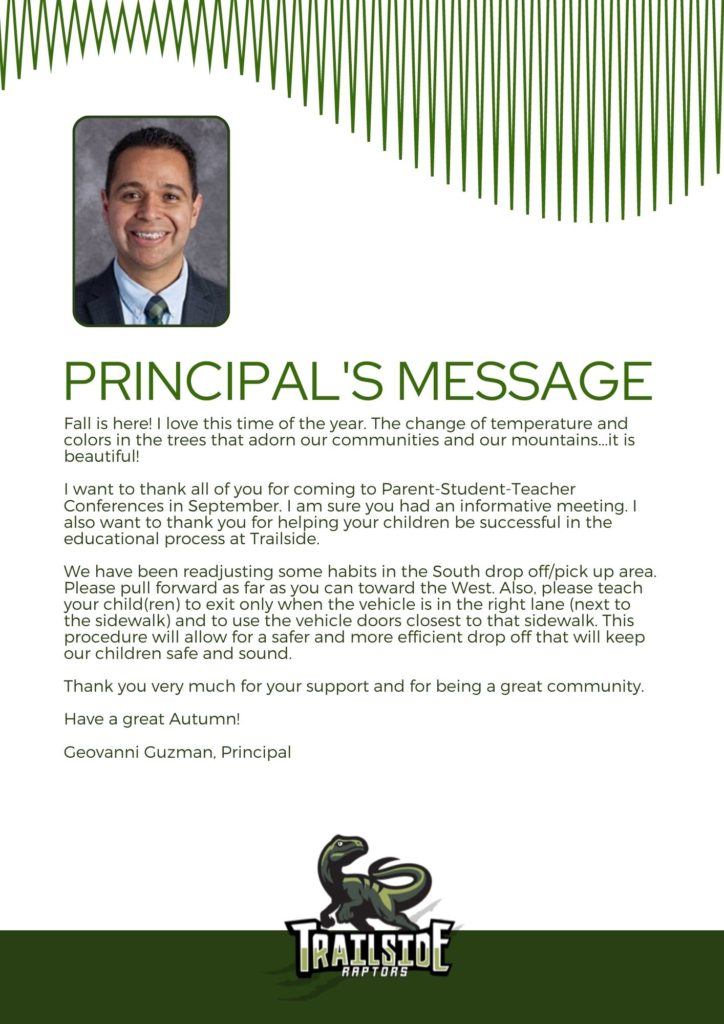
September 2022
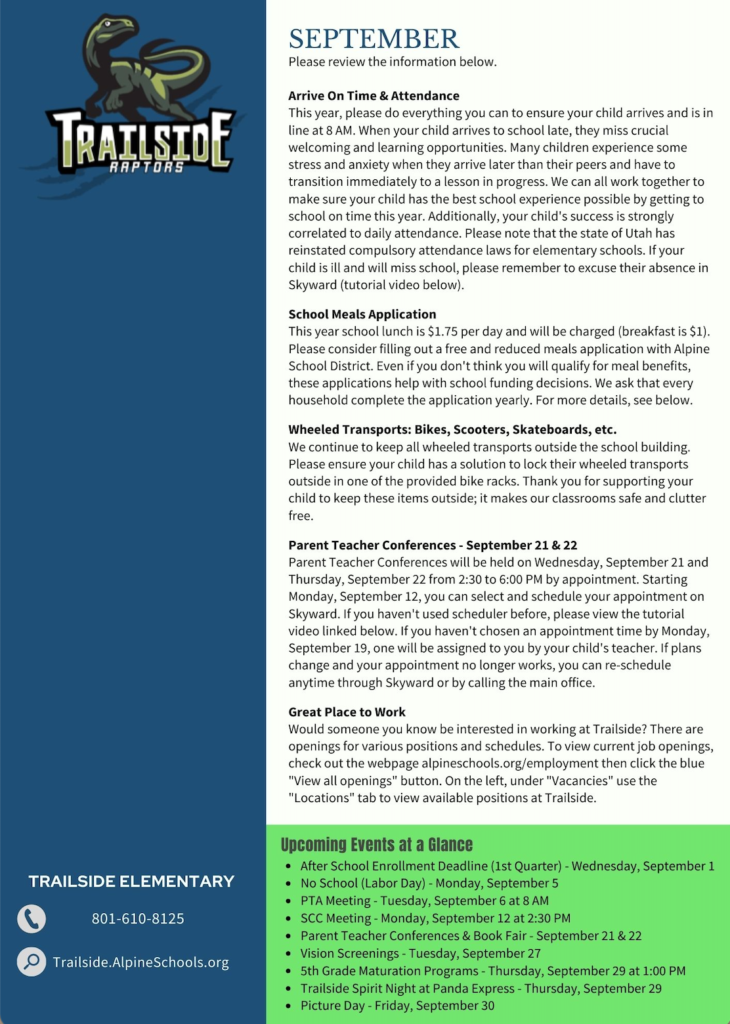
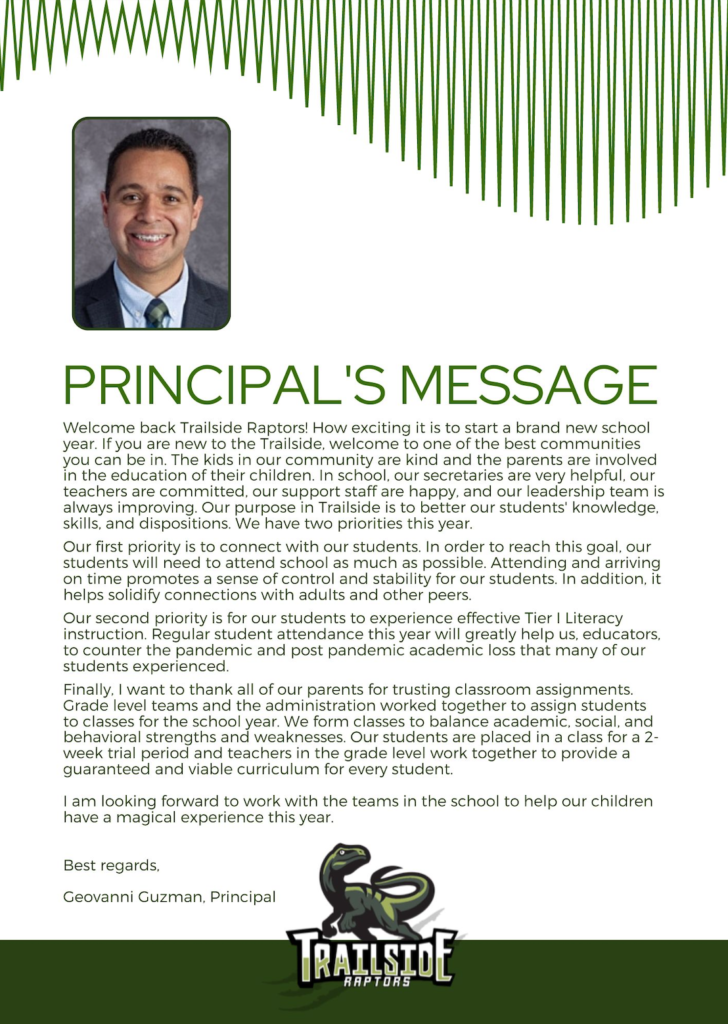
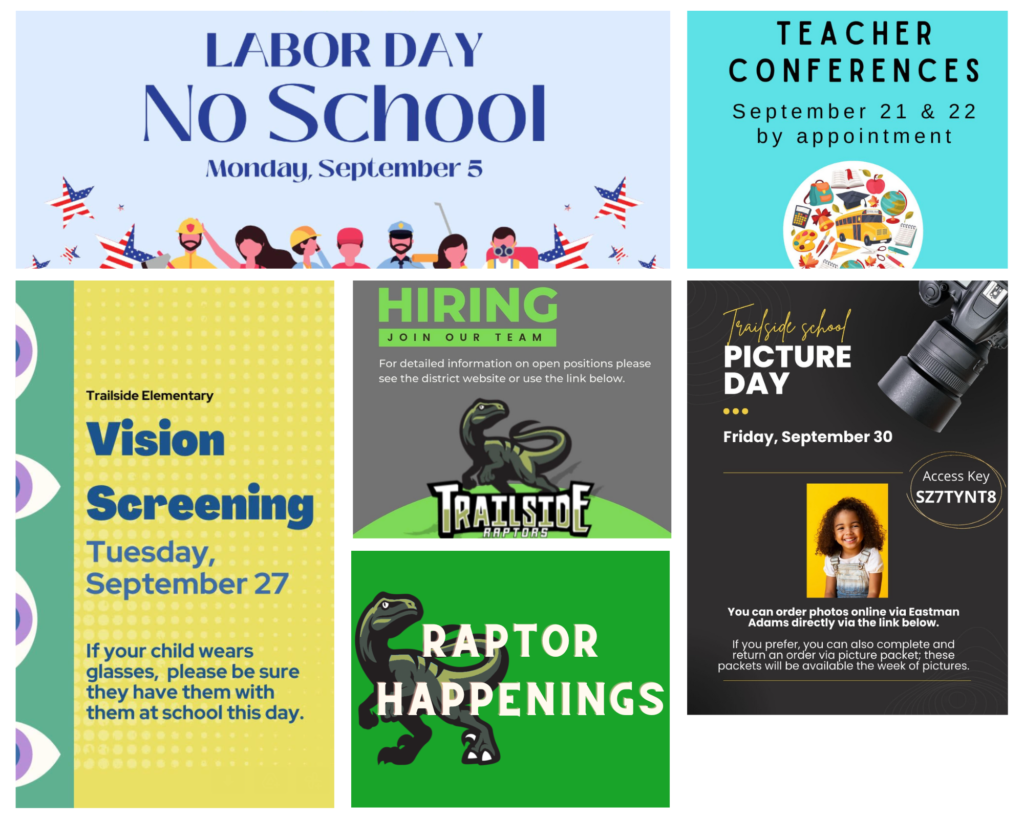
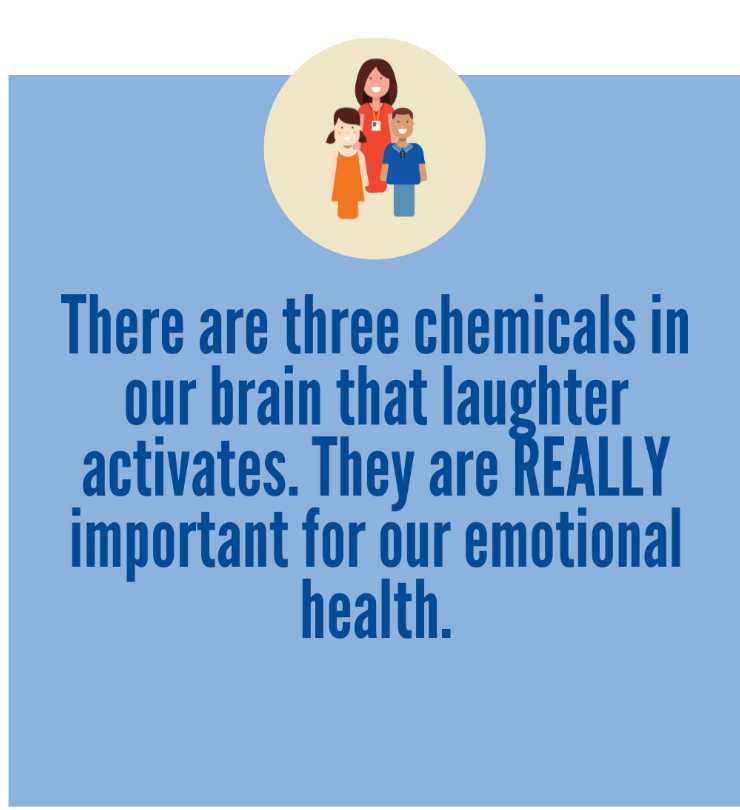
You know how laughing feels really good? There’s science behind that!
There are three chemicals in our brain that laughter activates. They are REALLY important for our emotional health.
![]() Dopamine: helps you experience feelings of pleasure and reward.
Dopamine: helps you experience feelings of pleasure and reward.
![]() Oxytocin: helps you feel love, generosity, trust, and wellbeing.
Oxytocin: helps you feel love, generosity, trust, and wellbeing.
![]() Endorphins: These hormones relieve some pain. They also reduce the amount of hormones that make us feel stressed. This means you might feel less anxious or stressed when you laugh.
Endorphins: These hormones relieve some pain. They also reduce the amount of hormones that make us feel stressed. This means you might feel less anxious or stressed when you laugh.
This all means that humor and laughter can help prevent feelings of anxiety and depression in your teenager. It can also help them cope if they are currently going through something hard! If you need help figuring out how to connect with your teenager through laughter and jokes, catch our video at uwayuc.org/everydaystrongvideo
August 2022
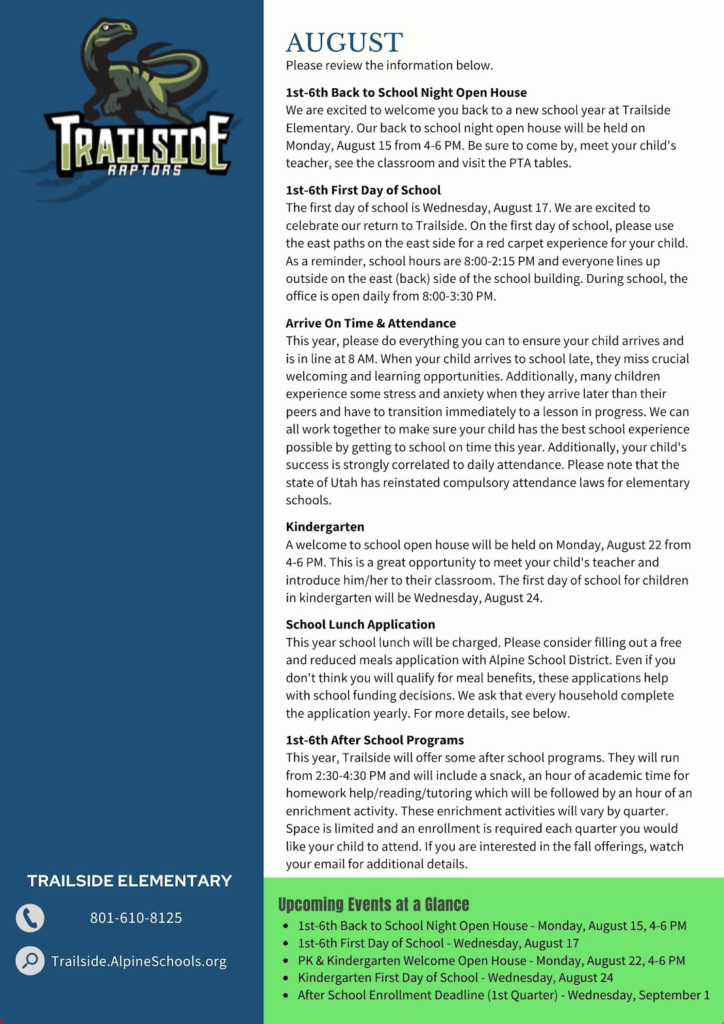
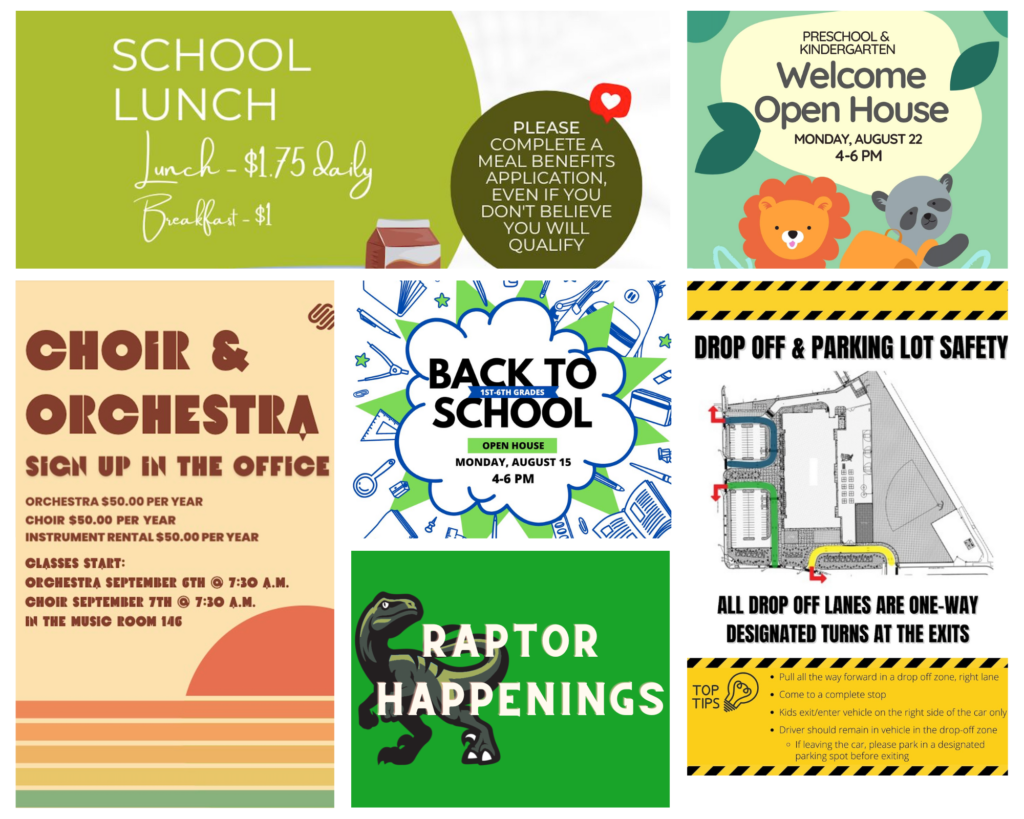
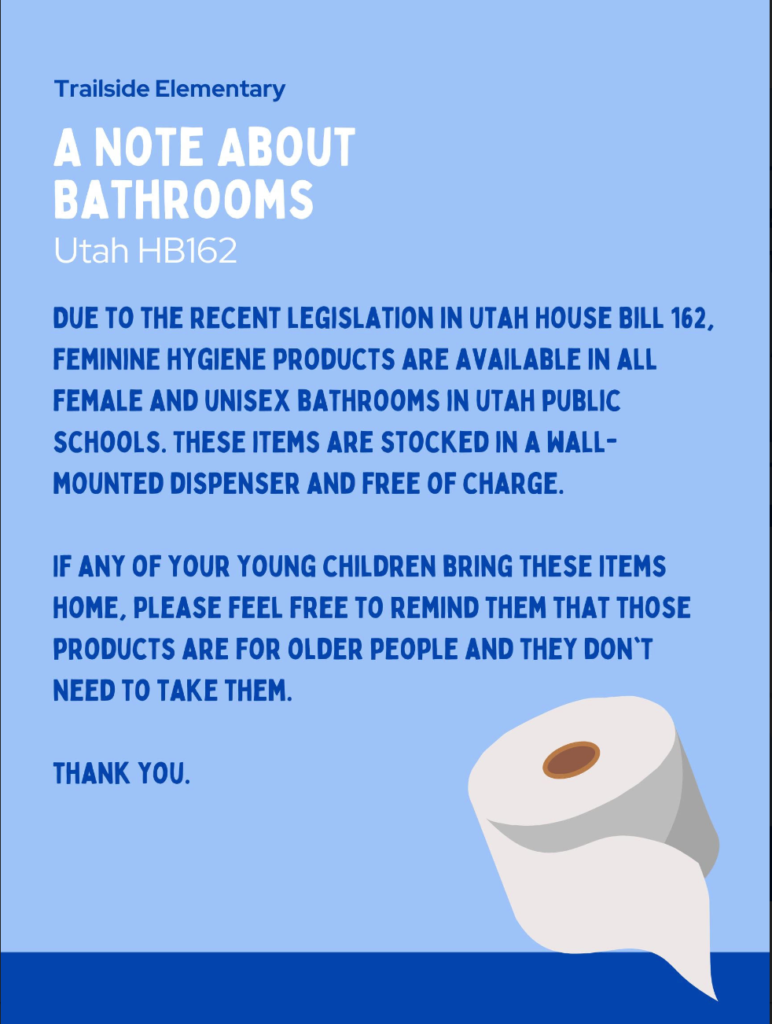
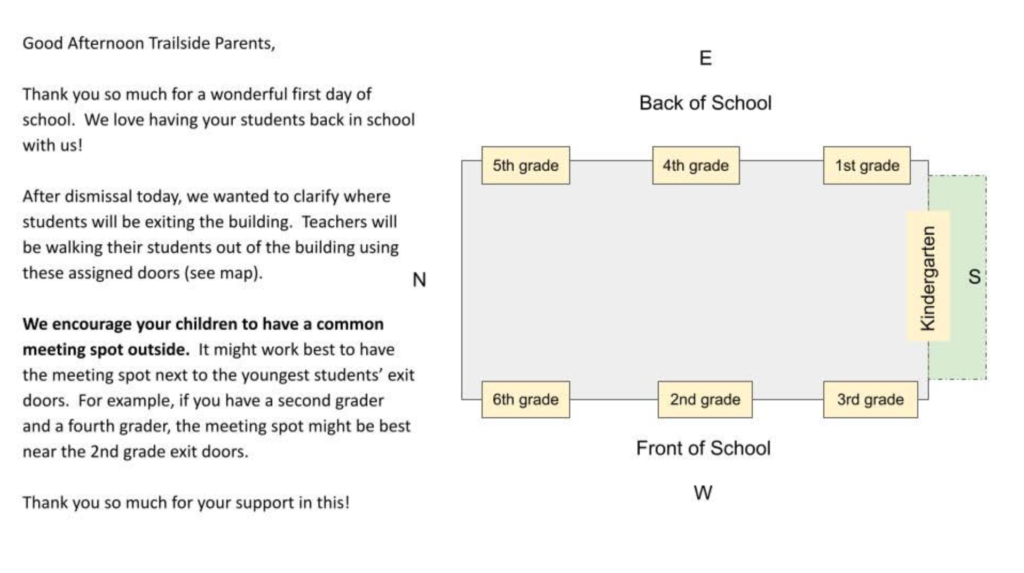
May 2022
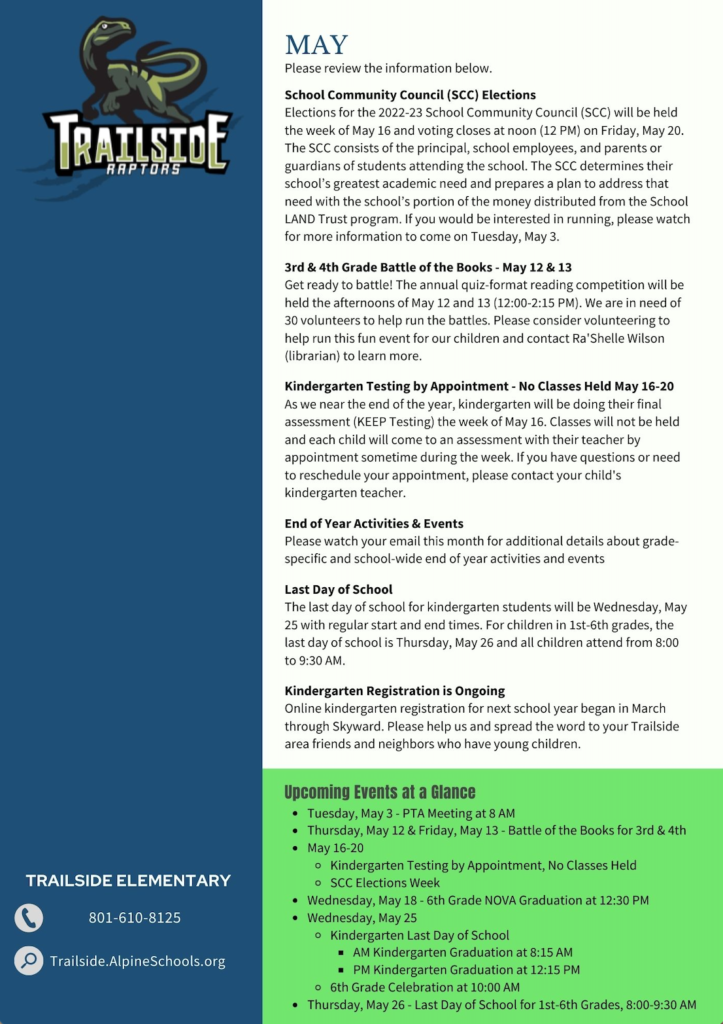
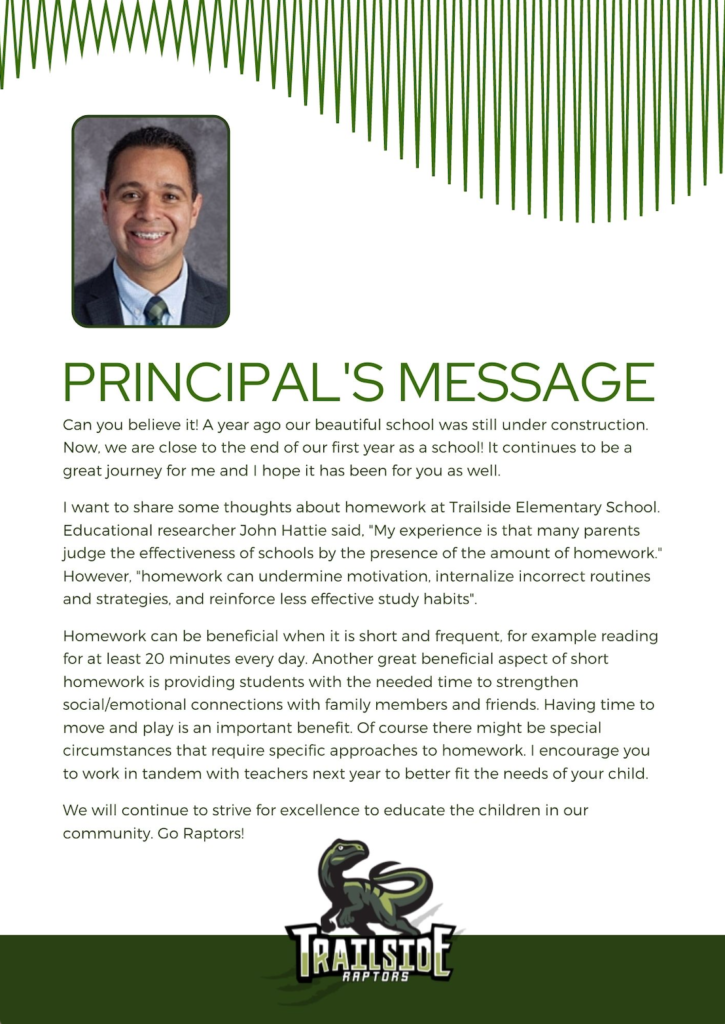

April 2022
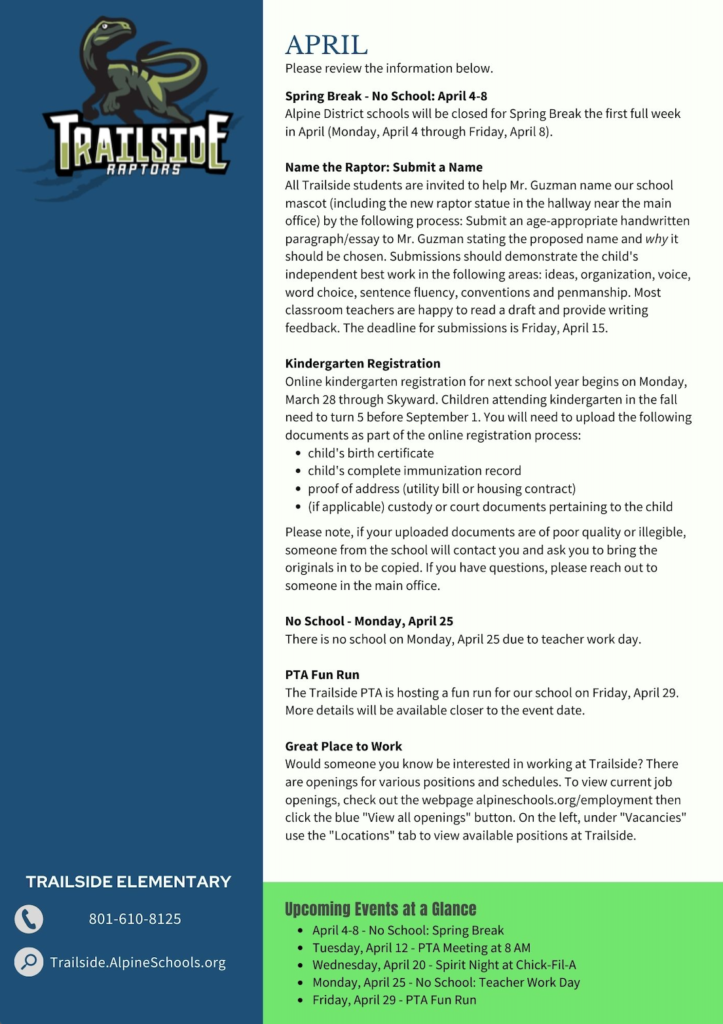
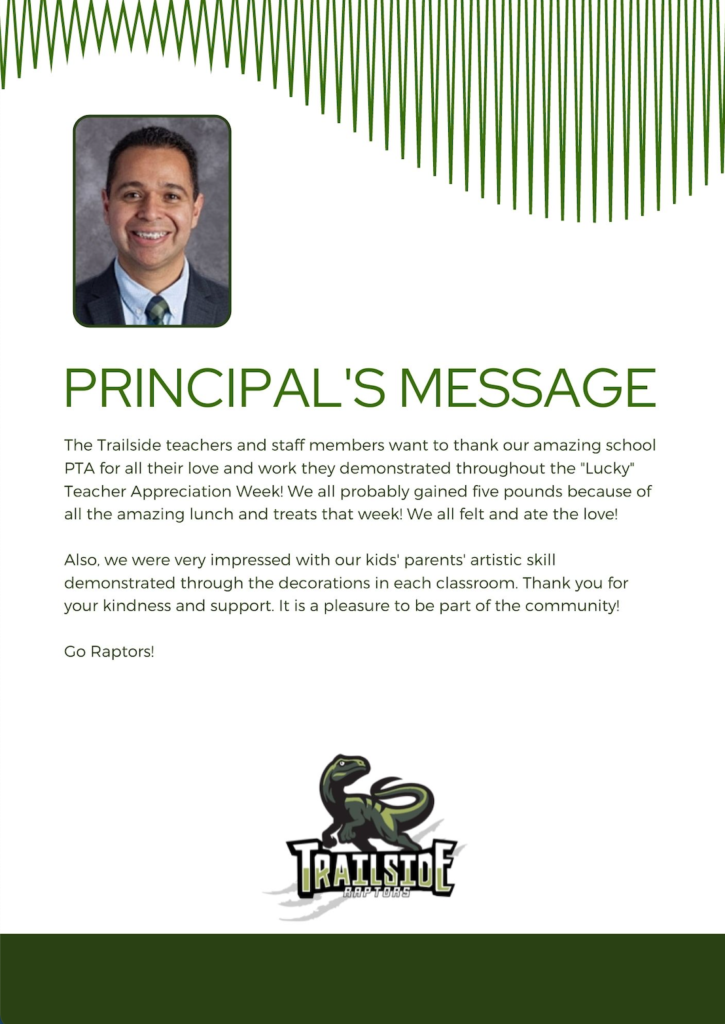

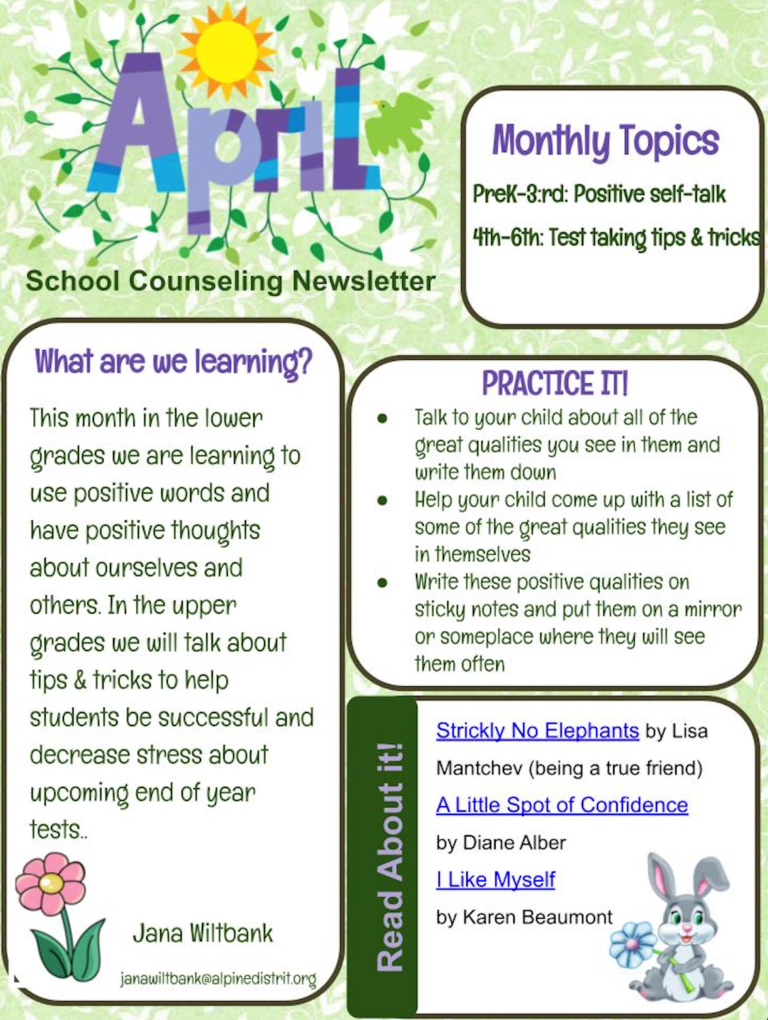
March 2022
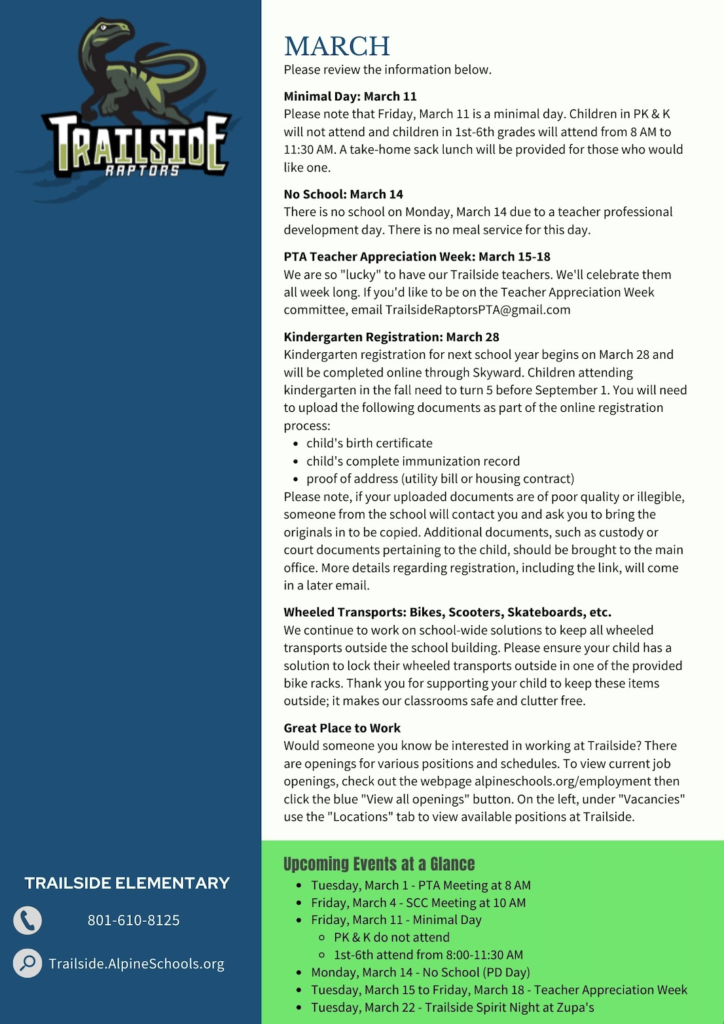
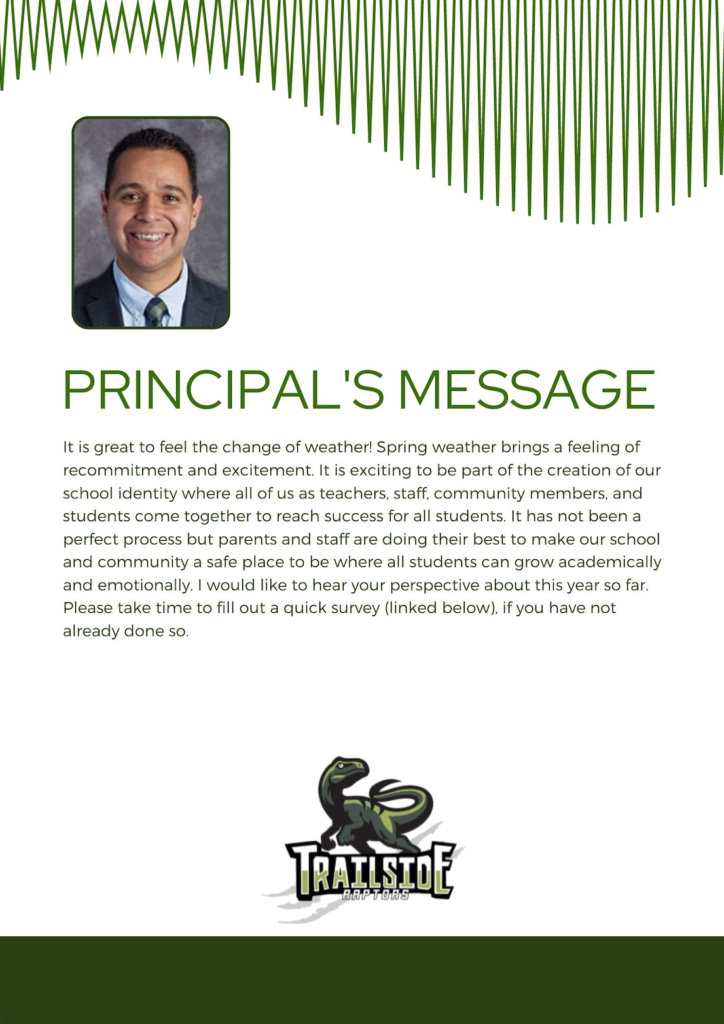

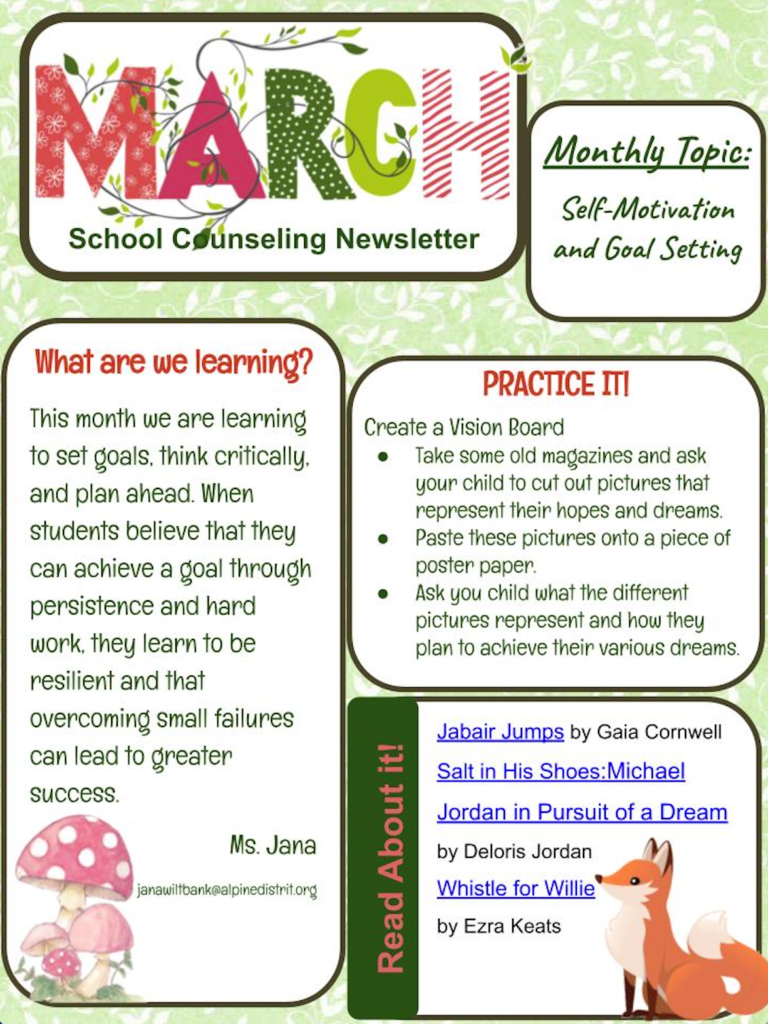
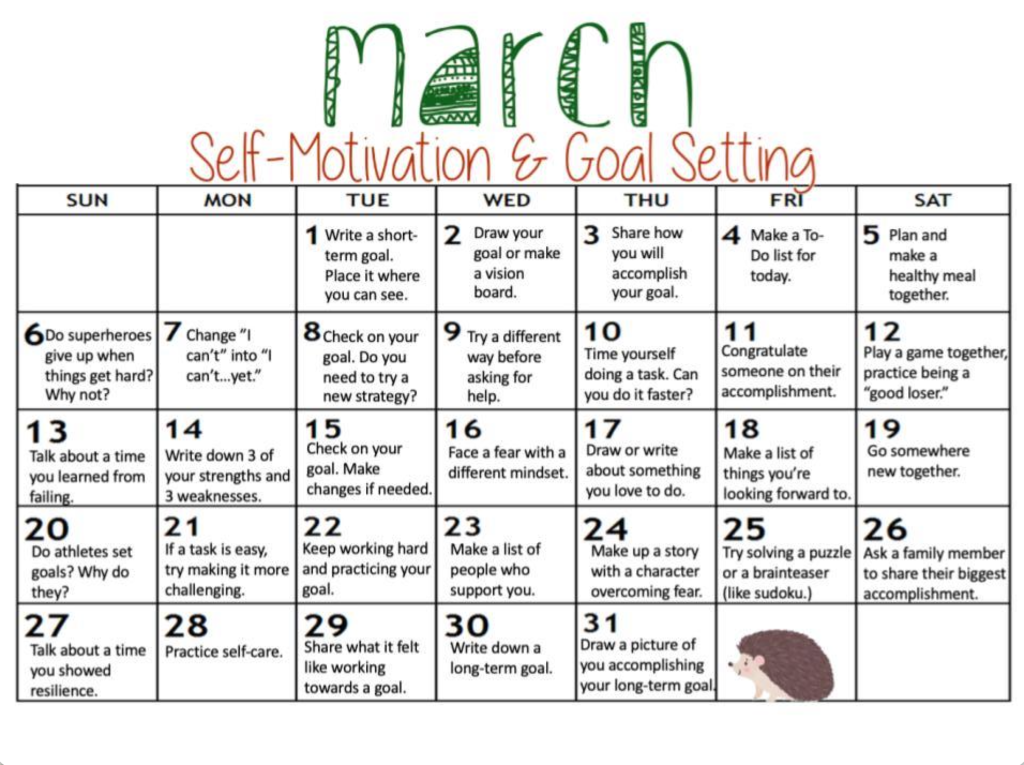
Everyday Strong
What’s the difference between creating safety and letting your child get away with binging TikTok on the couch all day?
Let’s say your child has anxiety around going to school. You might learn about how important it is to create emotional safety for your child and think, “okay, that means that I shouldn’t make them go to school because it makes them feel afraid.”
Of course, that isn’t really a viable option. They *do* have to go to school.
So what’s the difference between creating safety and letting your child get away with stuff?
Here’s an interesting fact: you should understand that with anxiety, it’s actually almost never beneficial to completely avoid doing the thing you’re afraid of. In fact, it only gives the anxiety more and more power the more you avoid it.
So, “meeting their need for safety” in this case isn’t about letting them avoid what they don’t like. Rather, it’s about providing support and encouragement while they do something that feels very, very, very hard.
Try meeting their needs in the following ways:
– help them feel safe to feel: reassure them that you can understand how very real and overwhelming this anxiety feels. It can feel like your heart is going to burst, like you will never survive. That feeling is very real in the moment.
– help them feel safe because you are in control: remind them that you are still the parent. Of course, they may not like this in the moment or react well. But in reality, all human beings long for stability and consistency. It’s okay that certain things are dealbreakers for you and in your household. Attendance at school is probably one of them. Rules actually can create safety, especially if you are consistent in applying them.
– help them feel safe to talk: ask open-ended questions and be very, very quiet while you wait for a response.
Ask questions like, “if you *could* stay home today, what would you do with your time?” If they say, “I would just sleep all day,” then perhaps they have a physical need that you could help care for. Or they might say, “I would just play video games” and maybe that means you need to figure out together how they can have more time outside of school to recreate and relax.
At the very least, when you ask open-ended questions, you really show how much you care.
– build confidence by trusting: how well this last one works will depend on your kid, their levels of anxiety, their age, etc. But you might try this. Say something like, “going to school is non-negotiable for a lot of reasons. But I want to help you. What do you think I could do that would make it easier for you to cope with these fear and stress?”
This takes it out of the top-down “you must do as I say” mode and into a partnership of problem-solving. Be prepared to follow up by doing as many of their ideas as you possibly can, even if the ideas seem silly to you. That’s what builds trust.


A common phrase people say when they are pregnant is “I don’t care what gender the baby is as long as it’s healthy.”
Oh boy: I feel all the feelings with that. We cannot imagine our tiny infants suffering in any way. Just the idea of it feels like too much to bear. We just want our baby to be okay.
It doesn’t necessarily get any better as they get older. Along with getting older comes the dangers of being a toddler and starting to walk; of mean kids at school; of driving. These are all frightening things that come with so much potential trouble.
What happens though when your child isn’t healthy or when something goes wrong? In particular, what happens if a mental health crisis happens? Suddenly, it can feel like all our hopes and dreams for our child have been ripped away from us. The things we hoped they would accomplish.
When this happens and we are still attached to our child being a certain way, it can make it very difficult to be there for our child. We have to go through our own grief of what we thought our life and our child’s life would be while also trying to support them.
What if from the very beginning, from the moment our child was born, we acknowledged that we can’t always stop bad things from happening? What if, instead of focusing on always making sure there’s a good outcome, we focused on what is within our control? Within our control is: our love, our care, our willingness to show up for our kid no matter what.
Try something like this out, the next time you are thinking about your hopes and dreams for your child:
“I don’t care what gender the baby is. I just want to love and provide for them.”
This mindset works even if your child is long past the baby stage.
– “It will be okay if my child has a health problem. I just want to love and provide for them.”
– “It will be okay if my child struggles to make friends. I just want to love and provide for them.”
– “It will be okay if my child struggles to hold down a job. I just want to love and provide for them.”
– “It will be okay if my child’s grades aren’t perfect. I just want to love and provide for them.”
We can’t always control the outcome, but we can control how we show up.
This will help reduce the chances of them feeling afraid to talk to you in the future.—
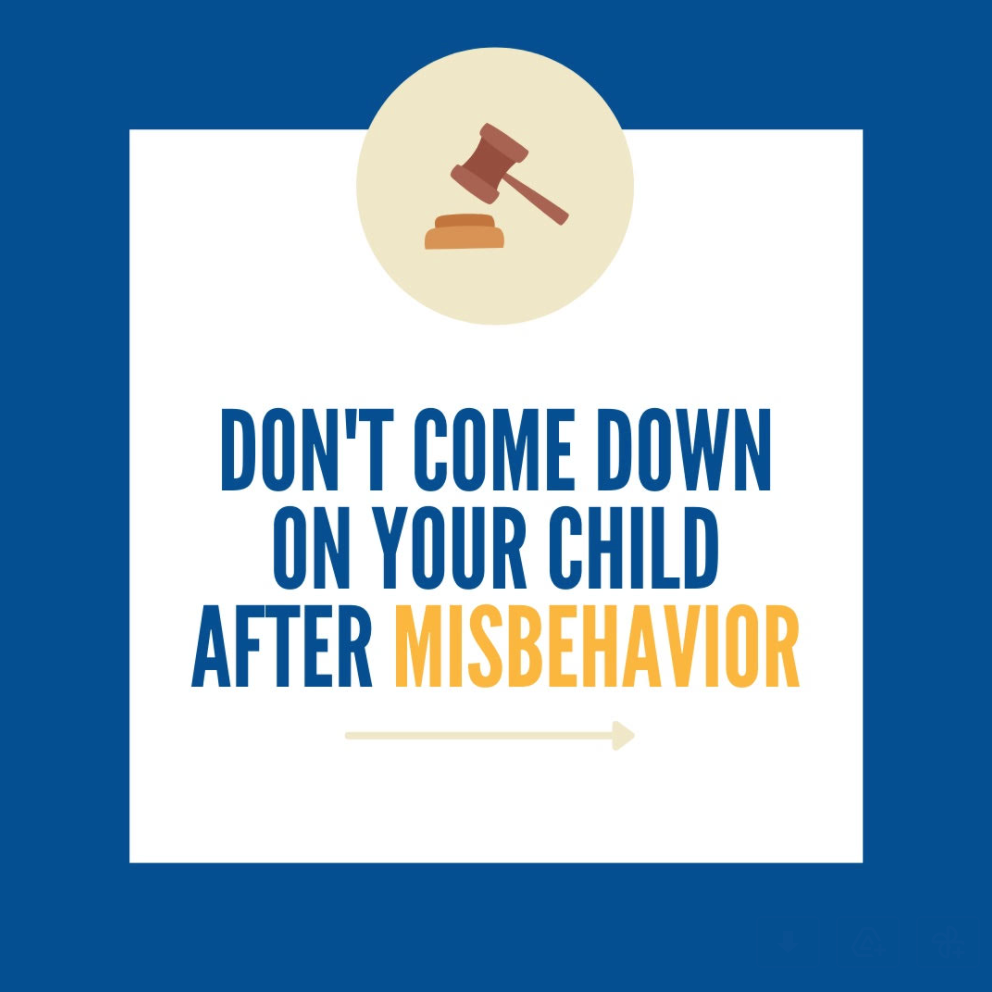
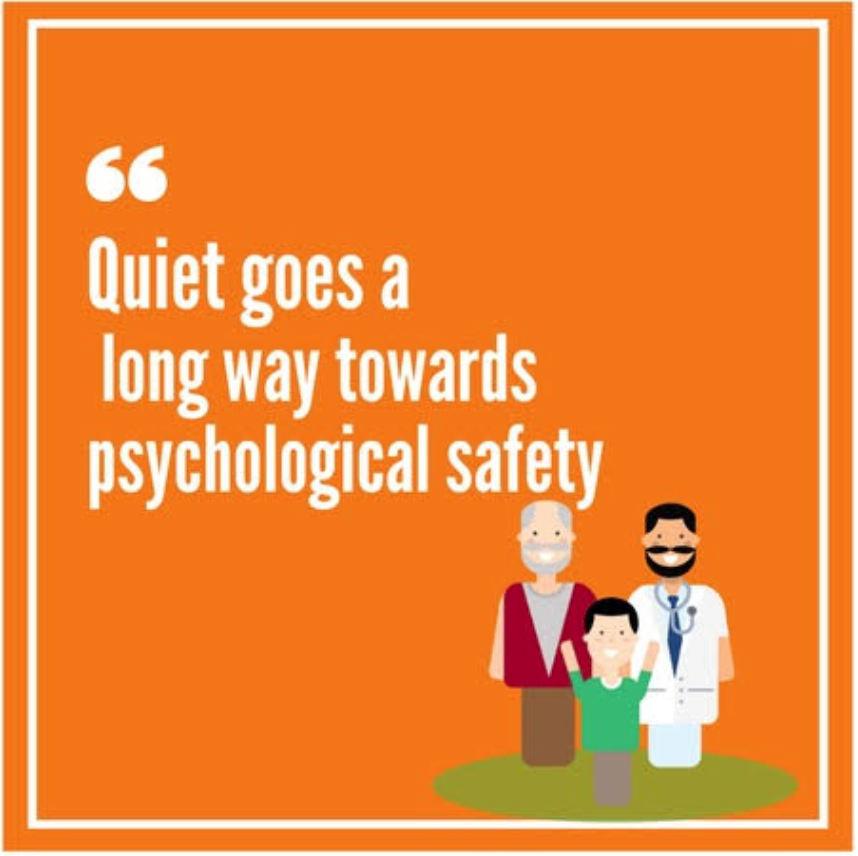
Help them to express themselves and guide them to be the child you want them to be. The more they are able to talk to you about their mental illness, the more you will know about what is going on in their lives. You offer a connection and love that your child cannot get anywhere else. They may have
Questions
Concerns
Problems
Ideas
Mistakes
that they want to speak with you. Offering quiet helps them feel that you are listening. That you are paying attention to them. Quiet gives them the confidence to speak upon those topics that are scary for them to speak about. Offer them silence. Offer them your time to talk about those things that bother them. Hold back your urge to speak and let them have the time to spew their feelings to you. You will be helping them thrive.
Have you ever had trouble dedicating time to play with your children?
It doesn’t need to be a lot of time. It can be minutes. Setting that time for them to do the things they love will help you learn more about them.
It can be difficult especially when you are juggling a job, household responsibilities, and your children’s extracurricular activities like sports.
However, you can show your love for your children through your time. When you dedicate time for them they feel cared for.
It will help you feel connected. Most importantly, it will help you and your children feel loved.

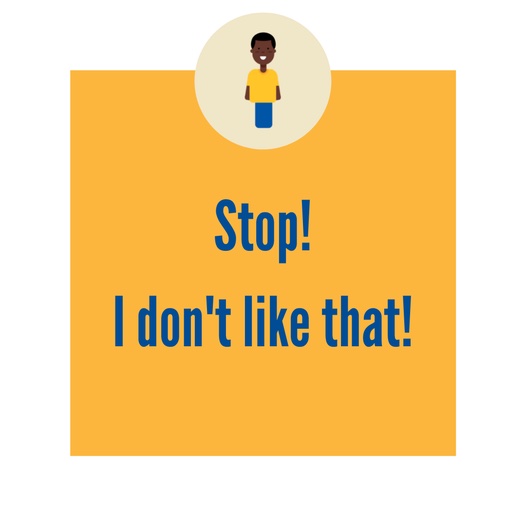
In a society where kids are often told that they always have to accept what their parents or other adults say or do, it is important that they can understand that they don´t always have to be ok with what an adult says or does and that it is safe to express what they might feel or think in these situations. We can give them the opportunity to be able to say, “you know what? I don’t like that. Stop!”. We can allow them to make some choices. By doing this, they will not only learn to make their own decisions, but they will also learn that it is ok to set boundaries with others.
Click our link below to learn more about from Kelli Stout, a therapist at the Children’s Justice Center in Provo, who talks more about all of this.
Thank you to our sponsor, Revere Health, for making this podcast possible.
Your capacity to care for your teenager’s emotional health is directly related to how much you are taking care of your own stress response. The more you learn how to soothe yourself and deal kindly with your own negative emotions and imperfections, the easier it will be for you to meet your teenager’s needs.
What can you do if your teenager constantly shuts down when you ask them questions?
Cassie Bess, a therapist in St. George, Utah, recently gave some great advice.
She said, teens can be incredibly sensitive to pressure. Do you secretly think you already know the answer, or secretly are you hoping for a particular answer?
For example, even something like “how was school?” we can be secretly hoping that they’ll just say, “great!” because we don’t have the energy for a negative response.
The same exact question can land completely differently depending on our motivation for asking it. Are we truly in a place of curiosity? Are we truly in a place where we can accept whatever the answer might be?
Try this: Go in with the mindset like the situation is brand new to you, even if you’ve had this same conversation with your child a thousand times before. What do you not know yet?
A good parent is the one who tries, and tries, and tries again. That’s how you create safety for your child. That’s how you create the kind of relationship you want with them.
I have a favorite skill that EveryDay Strong teaches on how you can help your child feel safe: safe to separate!
In our resilience handbook, we wrote “notice and comment on things you observe about your child when you’re apart. All people, especially children, carry fears of separation. They wonder, ‘do they think about me when I am away?’ or ‘will I be remembered?'”
I love this one because it is SO simple and it goes SO far for helping someone feel loved and safe with you.
Just a simple text can be all it takes: “hey, I was remembering just now how nice you were to me at breakfast.” Or picking up a treat to celebrate a small moment of effort, like a hard test, that they have coming up.
Sometimes I know people who keep a whole Apple Notes file with a list of things that the teenager in their life likes. Or use calendar reminders about important upcoming events.
We usually hear “separation anxiety” in relation to really small kids, but all human beings can feel afraid that they don’t matter enough for people to remember them. That’s a lonely feeling. You can care for their feeling of loneliness with something so small and simple.
You don’t have to keep feeling like you’re in a deadlock with your child.
Get a free workbook on helping your teen feel safe to explore: just one of the many skills EveryDay Strong can help you learn.
https://mailchi.mp/942229…/e
Whose needs matter the most?
Thinking carefully about your child’s needs and caring for them is the best way to build their resilience. We do this since the time they are small babies. They cry: we get creative about what could be going on (diaper change? nap? hungry? gentle bouncing? go for a drive? teething?). It’s not much different as they get older and, for example, get moody and isolated (hormones? friendship problems? need to talk? more sleep?).
The question I have for you is: do you ever feel resentful about all the needs your child has? Do you ever wish, just for a moment, that you could stop thinking about everything someone else needs from you?
It doesn’t make you a bad parent, teacher, or grandparent if you do. It just means you’re human.
Here’s the deal: we become resentful when our OWN needs aren’t being cared for. When we give and give without recognizing our own beautiful self’s needs.
Think about the following:
Your child comes to you on a Tuesday at 10:00 and says “I HAVE to get this project done RIGHT NOW that I completely forgot about!” You’re exhausted, though, and you desperately need some sleep.
Are you more likely to say: “sure, fine, yes” but be resentful, angry, frustrated the whole time?
Or have you ever said, “I love you, sweetheart, but this time you might have to make a bad grade because I really need some sleep?”
What about the middle ground: “I can help you for twenty minutes but then I have to go to bed.”
What’s difficult for you about thinking that your needs are AT LEAST as important as your child’s? When do you choose to sacrifice? Do you like your reasons for sacrificing? Do you choose to sacrifice because it makes you happy to see your child succeed? Or do you do it out of fear that other people will think you’re a “bad parent” if you don’t? Or because it’s too hard to deal with the overwhelming emotions that come when you say no?
We often talk about “boundaries” in parenting as something we put on our kids: like rules about what they can and can’t do. What about your boundaries for yourself? What are you willing to do or not do? Can you have your own back? Can you care about yourself at least as much as you care about your kids?
Most of us, as parents and caring adults, are doing the best gosh darn job we can on any given day.
AND there is always room to check in and see if we could grow.
One area of growth that almost ALL parents can push into is how much they are creating an environment where their teenager feels like they can talk to them.
Use the following questions for a self-evaluation:
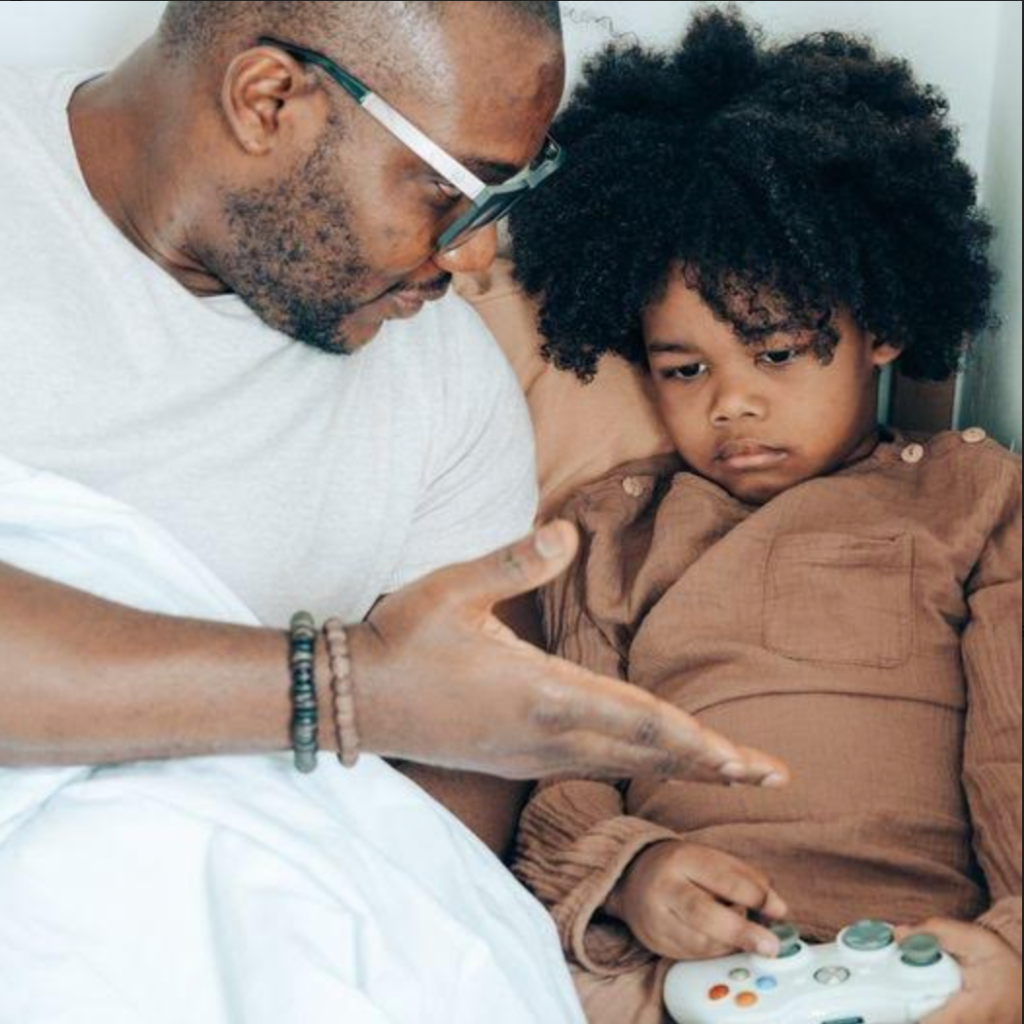
February 2022
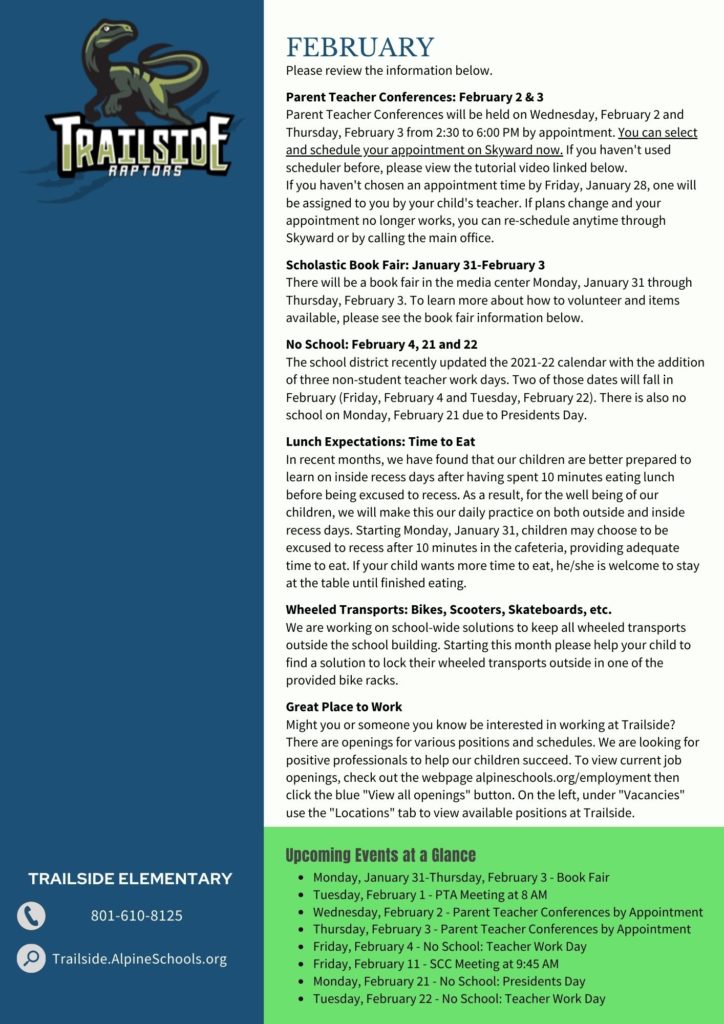
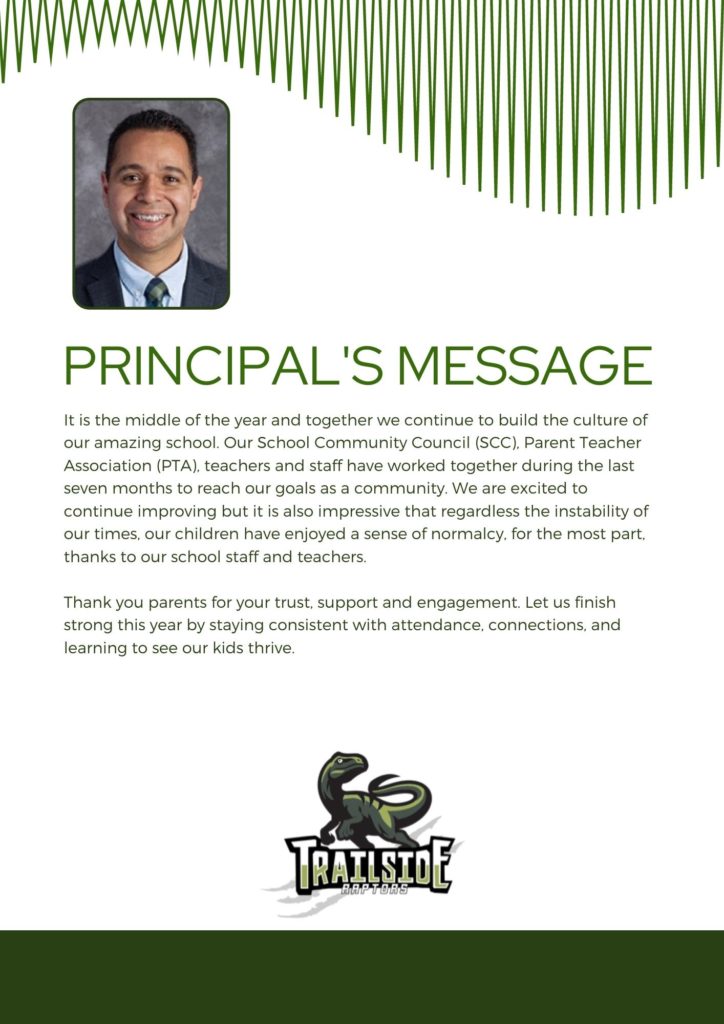


Everyday Strong


Today I was talking to a friend of mine about his teenager who is struggling with feeling broken and who feels like everyone is just faking it when they spend time with him.
There’s nothing about this situation that’s easy for anyone. We desperately want the magic bullet that will fix this and make it better.
We ask ourselves if it was our parenting, our insufficient love, the way we treated them when they were five that’s made them feel this way. If only we could crack the code, we could make everything better.
Of course, it doesn’t work like that. There isn’t a code to crack. This is the hardest gig on the planet: to just let these feelings exist. To not try to solve everything.
The stakes are so high.
But when I say “just let these feelings exist,” I don’t mean you shouldn’t do anything at all.
My favorite analogy about our relationships with our kids is to think about them as if they were plants to be nourished. Plants want to grow towards the light. We don’t have to *fix* anything or make the plant do anything.
Our job is just to cultivate a place where the plant can grow: to think about what the plants’ needs are. For our kids, rather than light/soil/water, it’s helping them feel emotionally safe with us; going out of our way to connect with them. Supporting them in getting enough sleep and enough to eat.
Why does this matter? Sometimes, the more we try to force a particular outcome, the more difficult things will get for everyone. Get soft. Get fluid. Roll with the punches. The only things that are hard, strict, and certain are dead: for example, rocks, or machinery. Humans, like plants, are soft, fragile, and when we go softly and gently with our kids, we give them the greatest chance of success.
Sometimes when people talk to a doctor about depression, they get a lecture. Like, “well, you need to make sure you’re going for a walk every day and getting enough sleep before I can prescribe you medication.”
And it’s like…. no kidding Sherlock!!!!! But how the heck am I supposed to get enough motivation to actually DO those things when I feel so terrible???? Those things won’t fix my depression!!!
It’s not about an overnight fix for a complex, difficult emotion: it’s about showing up consistently and demonstrating to your teenager, spouse, or friend that you are on their side, no matter what.
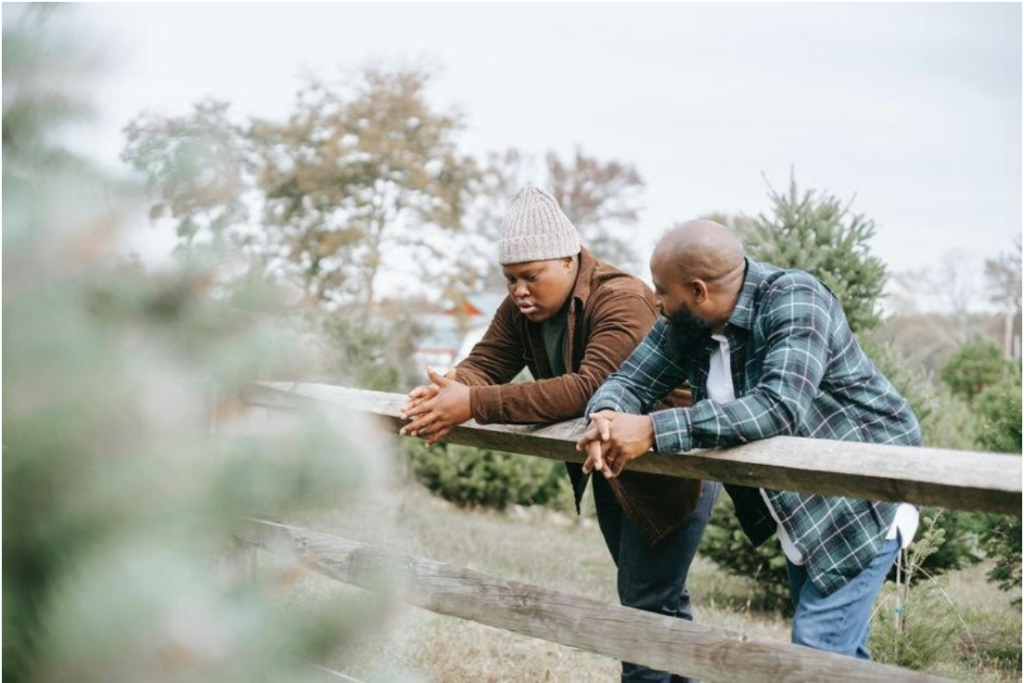
How often do you consider your own feeling of emotional safety when you’re parenting?
What do I mean by this?
You know those times when you fly off the handle because of some little thing that your kid or spouse said or did? Or when you feel like you’re melting and on the edge of tears all the time and just need to get away?
We have these responses because we are human and because we live in a world that causes our nervous system to be over-charged.
Resmaa Menakem, who is an author, artist, and psychotherapist, writes: “The body is where we live. It’s where we fear, hope, and react. It’s where we constrict and relax. And what the body cares most about are safety and survival. When something happens to the body that is too much, too fast, or too soon and we don’t get enough safety or regard, it overwhelms the body and can create trauma. Trauma is not a flaw or weakness. It is a highly effective tool of safety and survival.”
Those moments when you feel like you want to fight, for seemingly no reason at all? Or run away, for seemingly no reason at all? That’s your nervous system telling you, “I need safety, I need safety, I need safety.”
When you feel this, that’s your chance to give yourself safety. You can do it without fighting or fleeing. As lovingly as you would give a feeling of safety to your child. Take deep breaths. Bring yourself back to the present: notice one thing you can see, one thing you can smell, and one thing you can hear. And most of all, tell yourself, “I love you. You are safe.”
January 2022
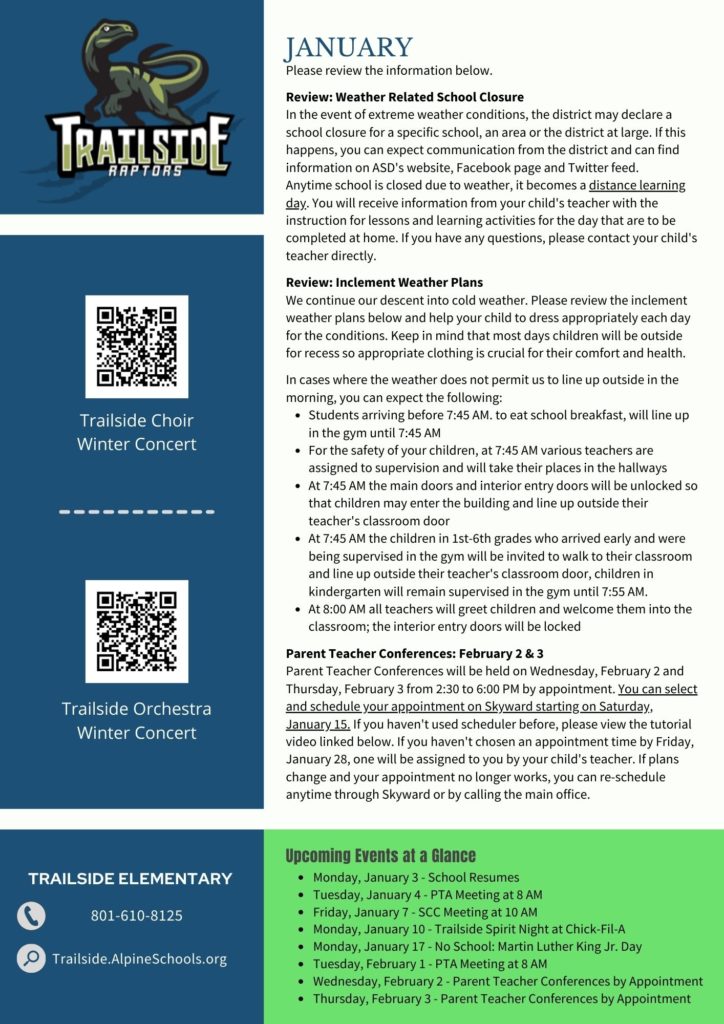
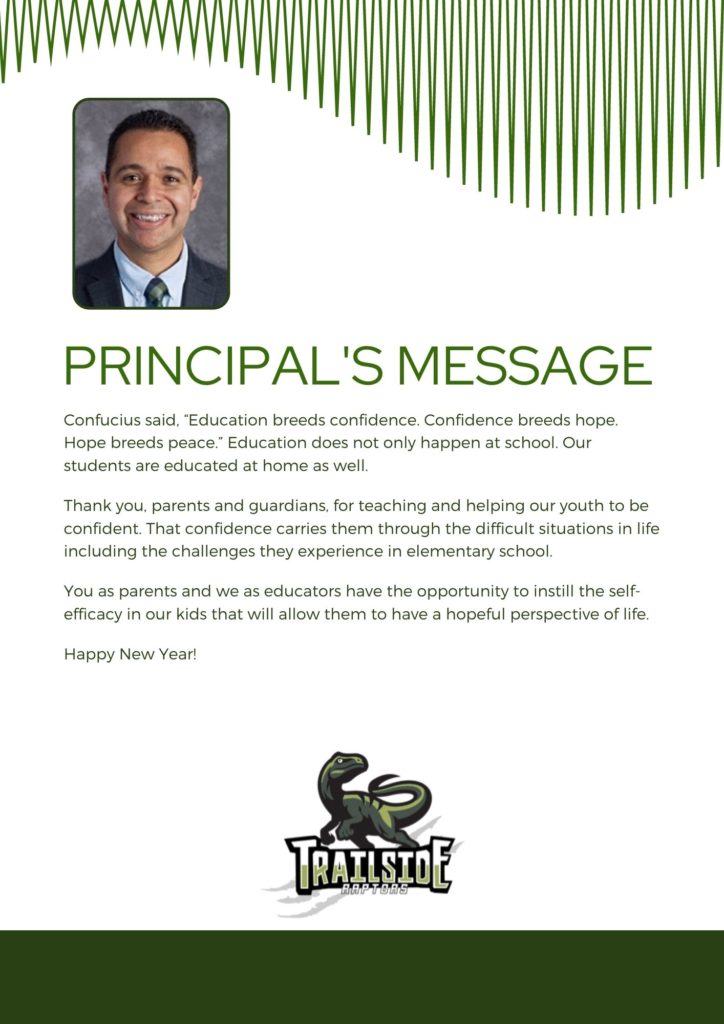

Everyday Strong Message
During difficult or stressful times, you might feel that you are all alone in your particular situation. You might feel guilty, sad, anxious, or depressed, which can cause your mindset to turn in, cascading you deeper into a hole you think that you can’t get out of.
But remember, these feelings are what it means to be human, to be alive, and to grow.
Just as you teach your little ones that there is someone always there for them, with love and open arms, there is someone there for you, too!
Opening up can be much easier when you feel safe and connected to someone. Remember to have self-compassion and that it is okay to reach out to another, for help. People are more eager to give a helping hand than we might think. Being mindful and understanding that suffering in life helps us be connected, and can help uplift you.
You are doing great! You are a wonderful parent! You are a wonderful person! Remember, your worth is still just as marvelous as your children’s!
Learn more about your worth in the link here.
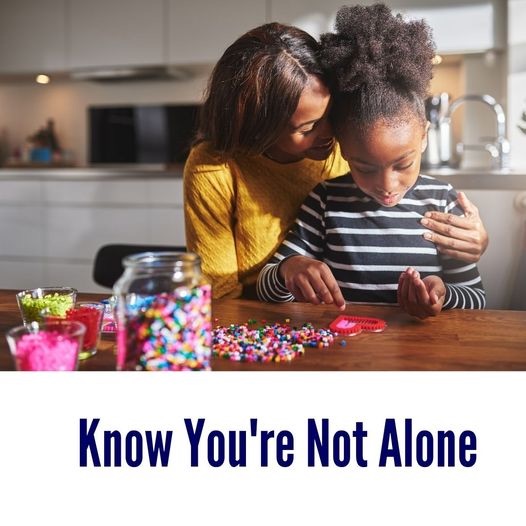
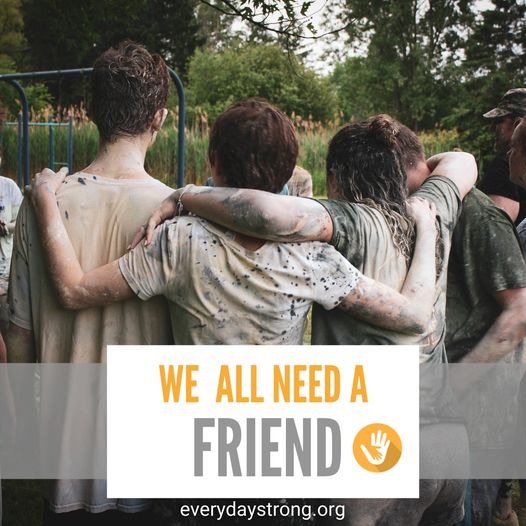
Sometimes, it can be hard to be a parent. It can be hard to meet your physical needs if you have to be up all night with a child, or are sick yourself but still have to be a mom or dad, make food, take the kids to school, go to work, etc. But meeting your own physical needs doesn’t have to be complex.
Just as you try to help your child meet their needs: to be to bed on time, eat good foods, exercise, and connect, you need it just the same. If you feel overwhelmed or stressed, try to be more mindful of your breathing or enjoy a sensory experience and take time out of the day for yourself. Take a nap, when your kids nap, or do a family exercise together.
Learn more about meeting your own physical needs by going to the link here
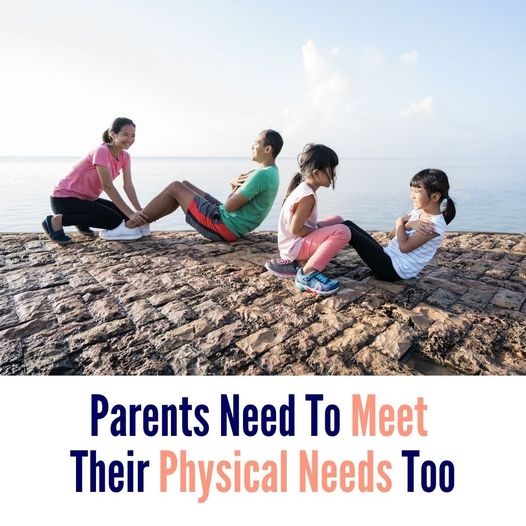
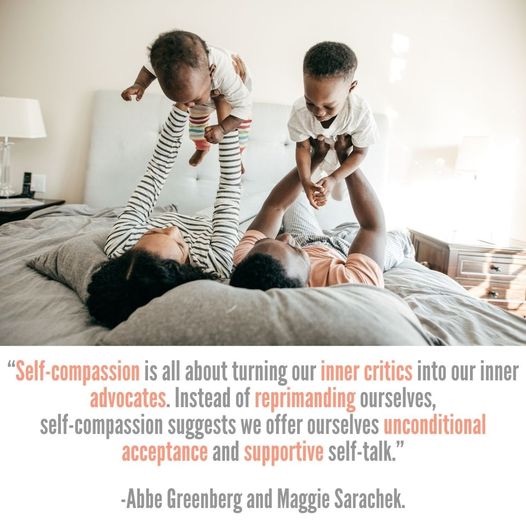
Sometimes it is hard to accept ourselves for who we are, with our flaws and mistakes as a parent—especially nowadays where social media and comparison are so prevalent. We are quick to be much kinder to someone else but not to ourselves.
We teach our children to be okay with failure, that it’s a normal part of life. We teach them to feel safe to be themselves and explore and try new things with no judgment behind any of them. We need to do the same for ourselves.
Remember that it is okay to feel sadness, anxiety, or fear. They are a normal part of life. You can either let them help you grow or be your demise. It’s your choice.
Learn more about gaining self-compassion by clicking the link here.
It’s a typical Tuesday night. Everybody is gathered around the table for dinner. You look around and notice your 11-year-old is keeping to herself, eyes down and barely touching her food.
“What’s wrong, Meg?” you ask, trying not to pry but still knowing something is amiss. She bursts into tears and emotionally vomits the tragedy of the day!
“During recess, Karissa came up and made fun of my pigtails. She said that only babies wear pigtails and called me baby Meg! Then, when we were walking back inside, all these other kids walked by and started crying like they were babies and called me baby meg too! When I got back from lunch, somebody drew a picture of a baby on a piece of paper with the name Meg on it put it in my tote tray!”
The rage boils within. The audacity of these 5th graders to make your child feel so insignificant and worthless. Any progress you’ve made in making your child feel safe is gone.
“First thing in the morning, I’m walking into your teacher’s office and having a word with them! I can’t believe it! I need to call Laura–she’s on the PTA. Wait till she hears about this.”
So. Did you help the situation? Did you make your daughter feel better? Did you soothe the broken heart? Did you make her feel safe?
When the world is breaking around us, the first thing we as parents need to do is calm ourselves. Put your own oxygen mask on before you help your child with theirs. Responding to sadness and anger with more sadness and anger doesn’t help our children to be able to pause and process, it only compounds the issue.
So remember: pause, breath, and listen.
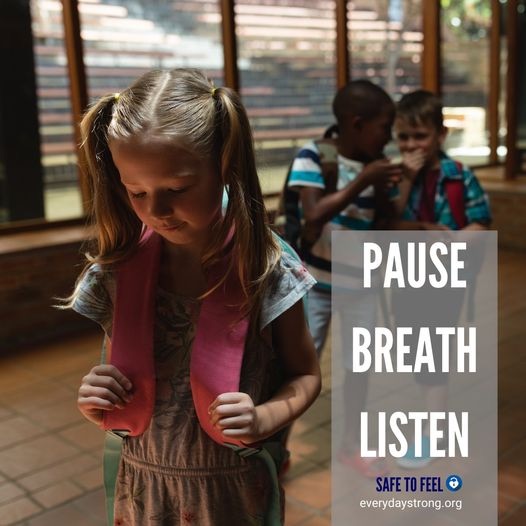
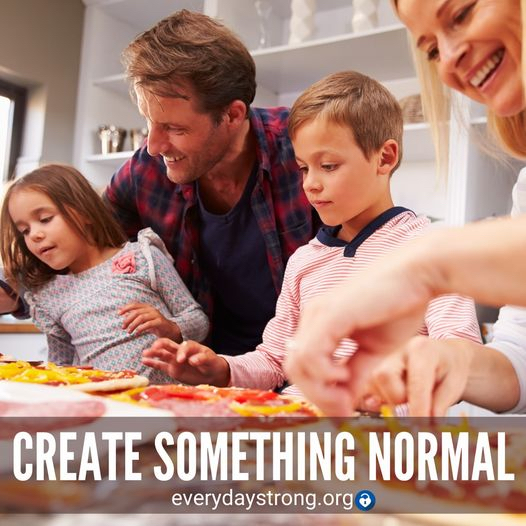
We’ve heard the joke, “I’m tired of living through unprecedented times.” The events of the last two years have been extraordinary and they seem to continue. However, to our kids, bizarre current events are becoming the norm.
Living in a constant state of confusion and chaos leads to fatigue and anxiety in young kids at rates not seen before. It’s difficult to feel safe in a world that seems unstable.
How can you help?
You can’t change the world. Golly, you can’t even shield your children from the craziness surrounding them. So, what you can do is create a foundation of normalcy at home and in your family–normalcy leads to a feeling of safety.
Weekly game nights.
Friday pizza dinners.
Marvel Monday.
Sodalicious after school.
If the world is too unreliable, create something normal.
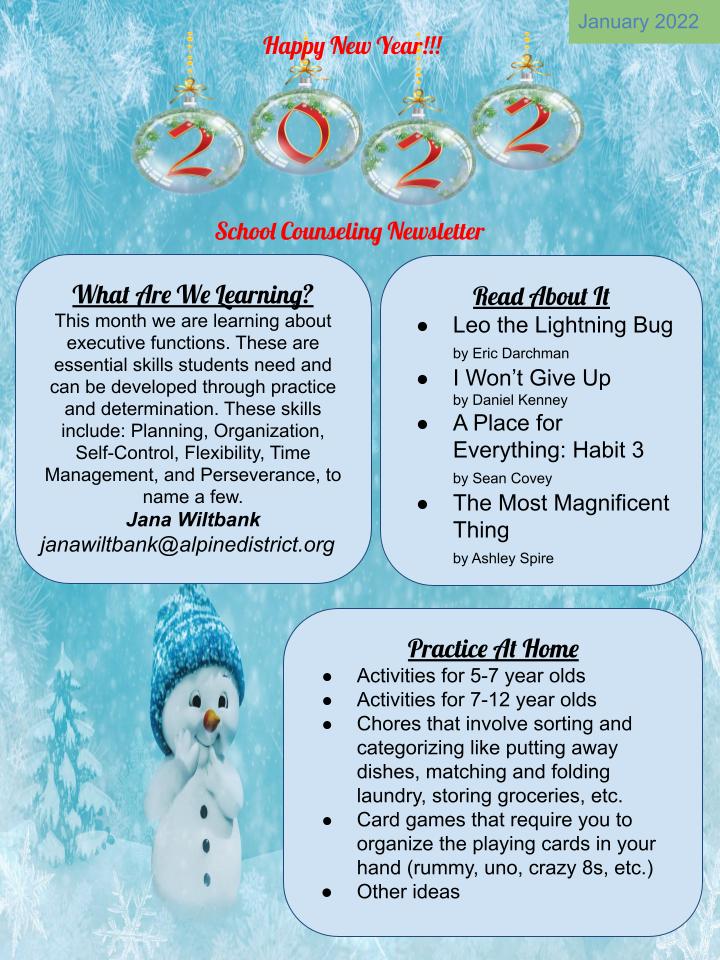

December 2021
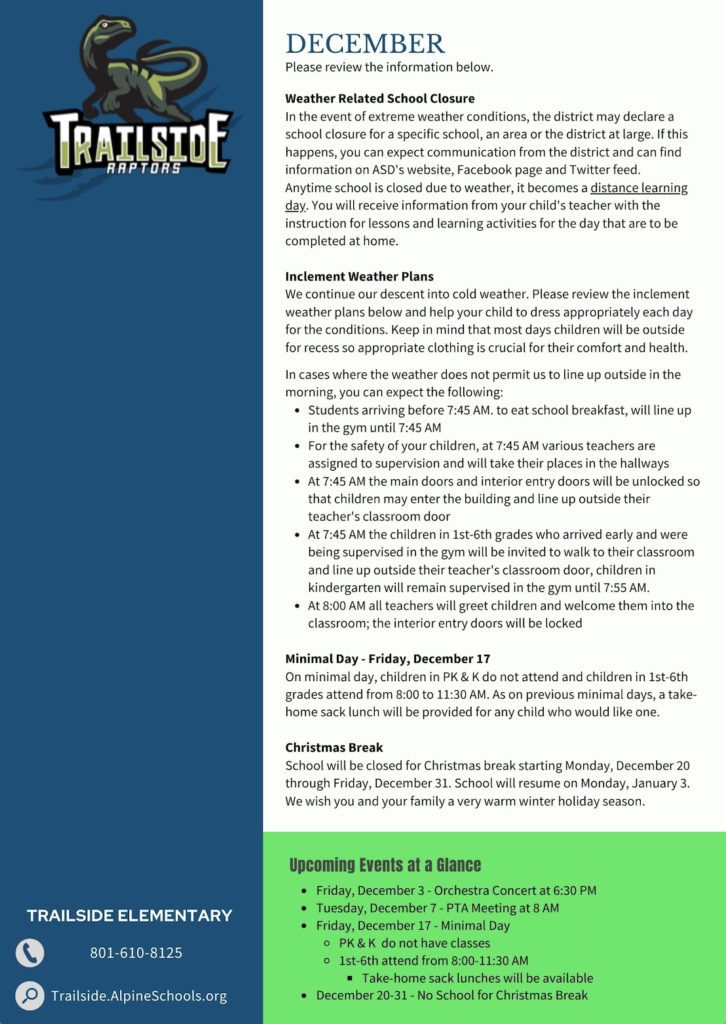
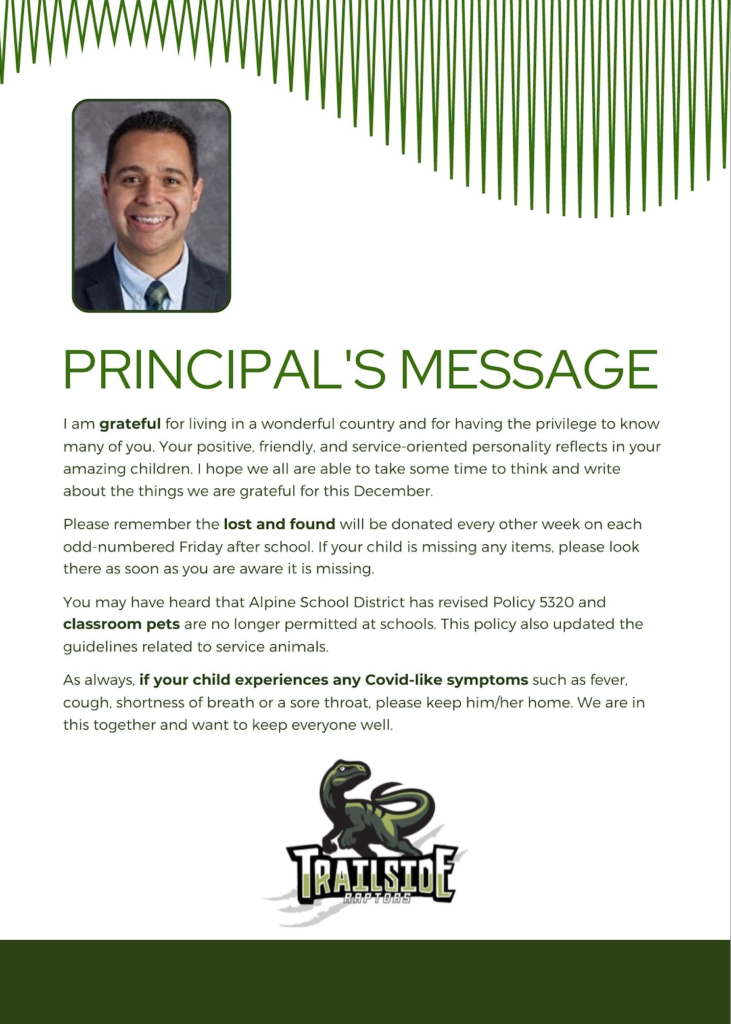



Everyday Strong
Safety is more than just being physically safe.
It is a feeling of being safe by being listened to and understood, being okay with being different from others, feeling emotions, or failing and being all right with it.
Feeling safe to be yourself can help a child know that they are important, loved, and cared for no matter what.
However, It might be hard not to try and fix these feelings of inadequacy, anxiety, or failure within your child. But by genuinely listening to your child, praising something unique about them, letting them know that they are loved no matter what choices they make, or helping them grow by failing can help the child feel calm and in control and able to be themselves in any circumstance.
Find out more ways to help your child feel safe in our resilience handbook. Download for free at uwayuc.org/starterhandbook.
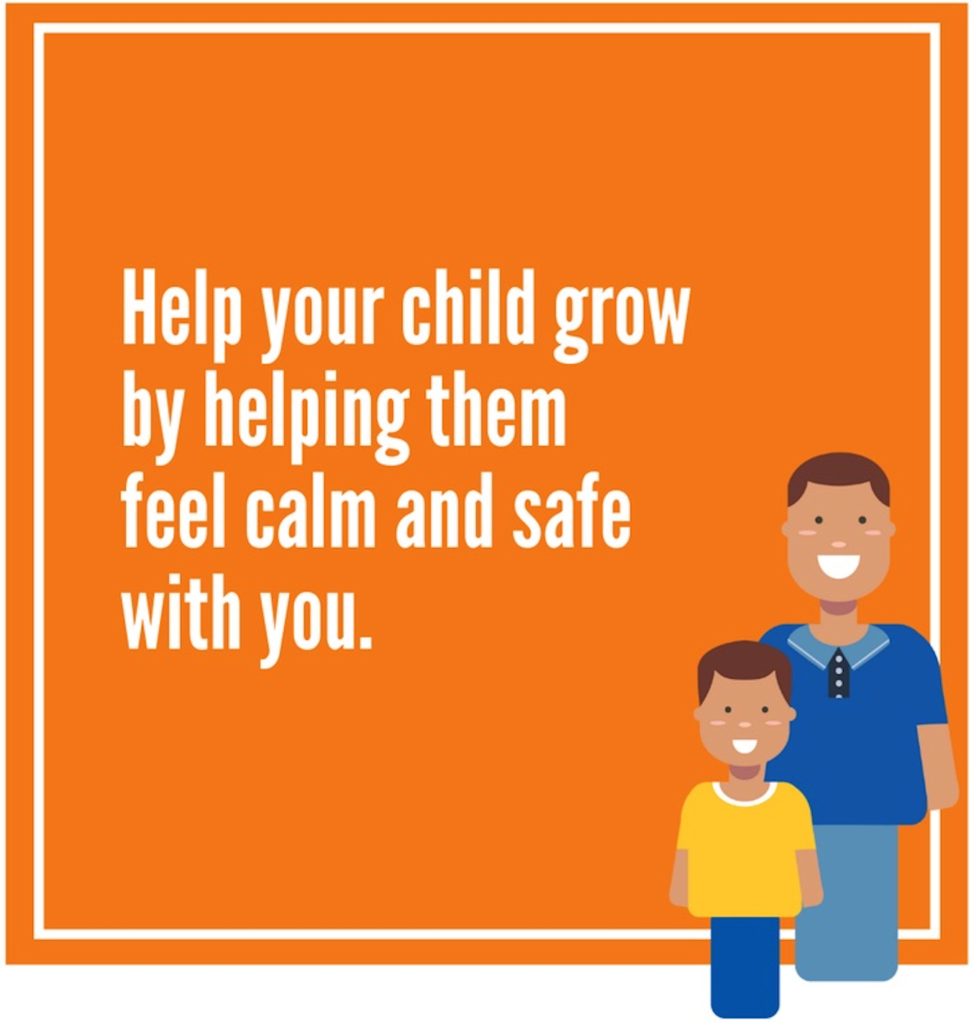
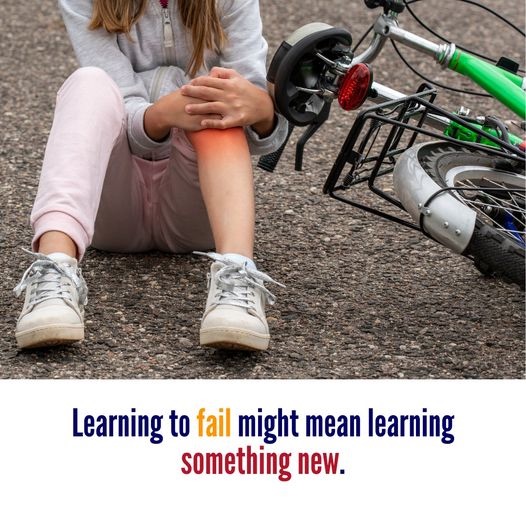
Failure.
A word that the world has put pressure on for no one to achieve. It can create anxiety, self-harm, self-loathing, and stress.
But what if I told you that failure makes resilience within anyone if they see it correctly?
Learning to fail, for one, might mean learning something new.
To get back up and try again.
To be resilient in trials.
To be okay with not winning.
As parents, we want our mission to help our kids succeed or to help fix their problems. However, being someone, they can look up to, show love and empathy, and create a feeling of safety in knowing that making mistakes and failing helps us grow and accomplish more than if we always won. It is okay to let our children step out of their comfort zone and learn from failure. It helps build resilience.
Learn more about how to teach your kids that failure is okay here: https://childmind.org/…/rais
Most of the time, the ones who are being bullied are those with unmet needs themselves. They might feel like they need to be mean first because they have had aggression towards them in the past. Or that they are longing for some type of connection but lack the social skills to do so.
Lynette Nelson, a licensed school counselor, said that a lot of what happens with bullying in school is not what is perceived. A lot of the time, those who bully are thinking of how they can fit in, make friends, or make their parents proud.
She also stated, “We can build connection when we help the aggressor understand they don’t have to be mean to be liked. Teach them to understand that these kids they have been bullying just want to be able to play games with them at recess or sit with them at lunch.”
Learn more about how to help resolve bullying in the EveryDay Strong podcast, linked here.
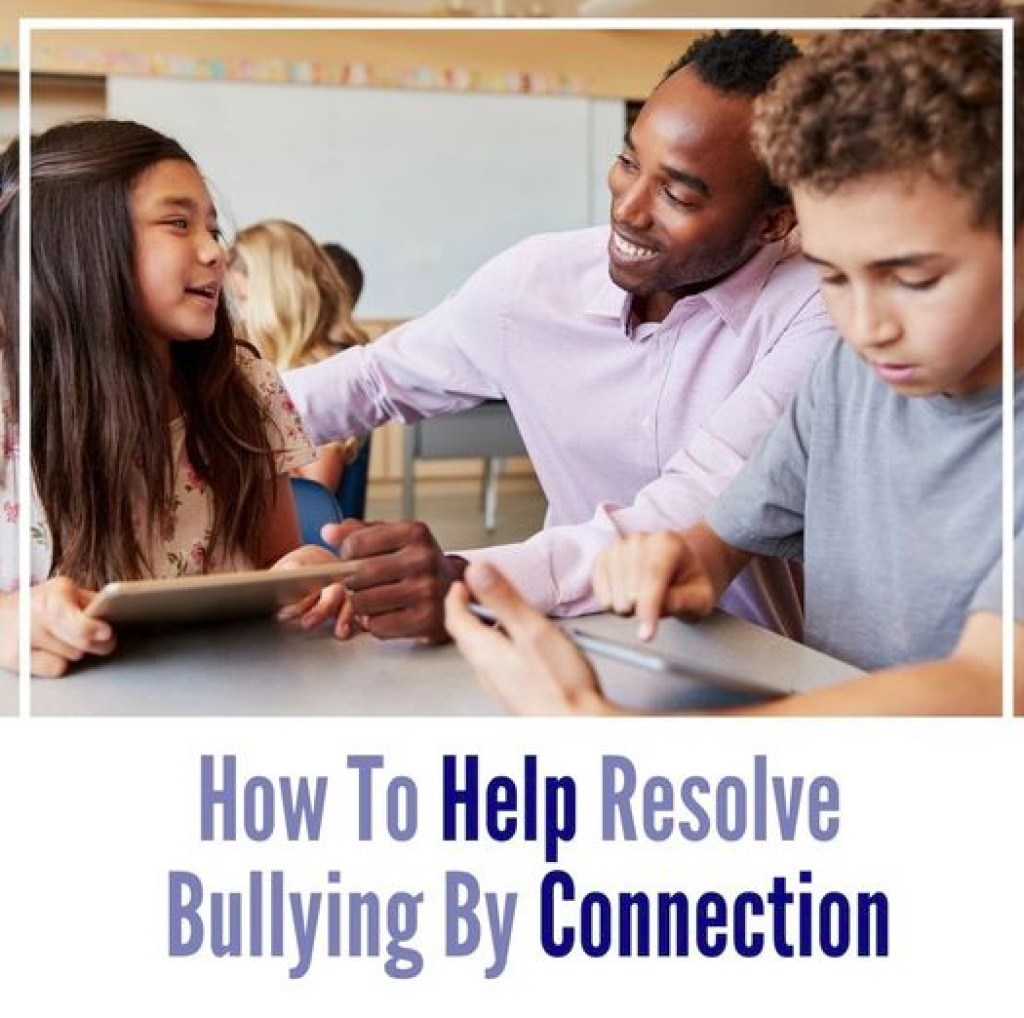

Let’s add a 6th love language, shall we? We all know about time, touch, gifts, words, and service. Well, how about shared laughter!
Taking time to laugh together and share in a vulnerable emotion such as joy brings us together in a way that simply being together in the same room can’t. It allows us the opportunity to connect about something deeper than common interests, but common emotions and sensations. It diffuses tension and relaxes our fears and worries.
So, take some time tonight to laugh with your family. Share the funny TikTok. Whatever it is, try to connect on a deeper level by sharing in humor.
Rejection and disappointment are tricky things we deal with in life but significantly harder if we don’t understand how to overcome them with resiliency or grit.
Here are a few ways to help your child feel safe even if they fail and build resilience.
1. Validate their feelings and experiences.
2. Let them know that failing is okay and a part of life.
3. If they fail, help them try again.
4. Help your child learn their value through who they are, not what they have accomplished.
5. Don’t intervene. Take a step back and allow them to solve the problem.
Remember, it is okay to fail. It is an inevitable option in life. But with some resilience to help anyone get back up and try again can help build characteristics needed to become successful in knowing who you are and your actual value.
Learn more about dealing with rejection here: https://childmind.org/art…/h
Counselor Corner
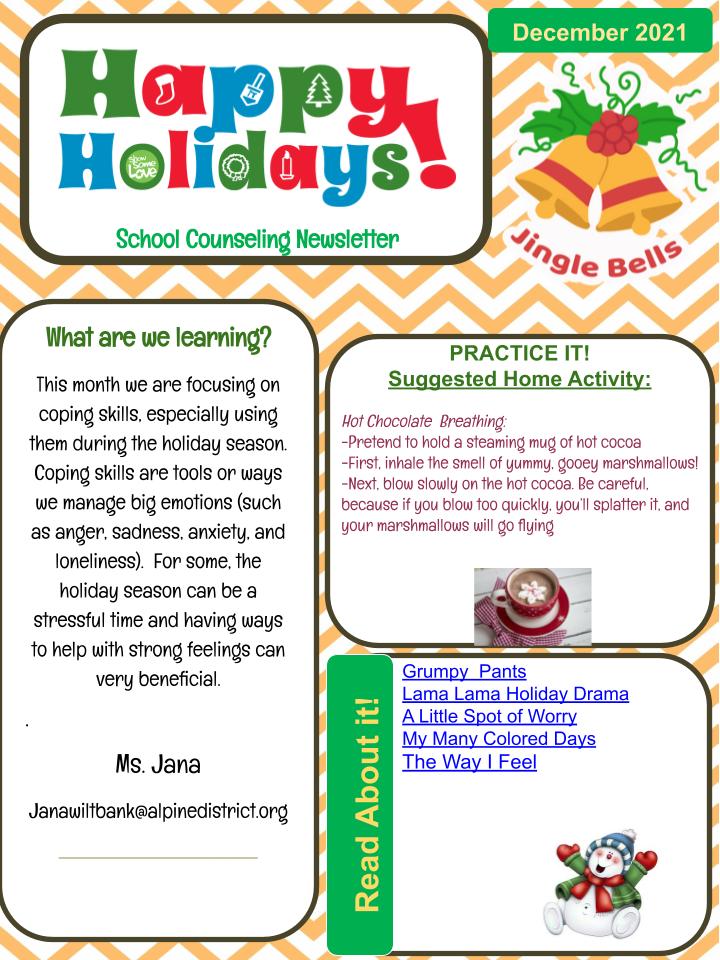
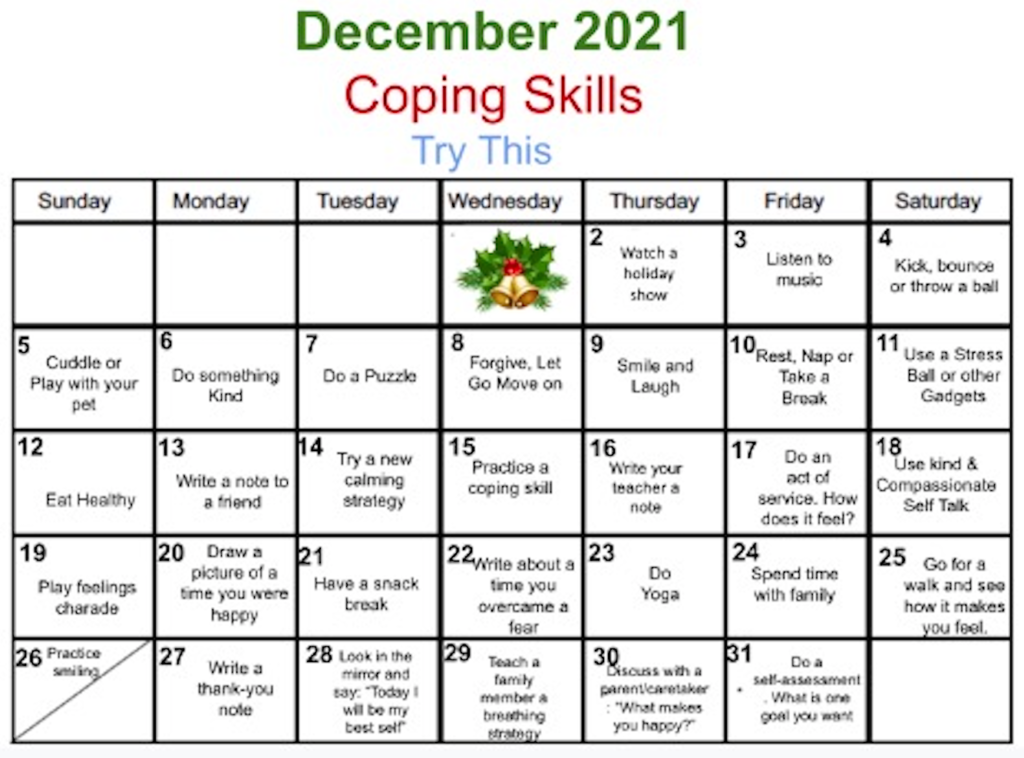
Native American Cultural Celebration


November 2021
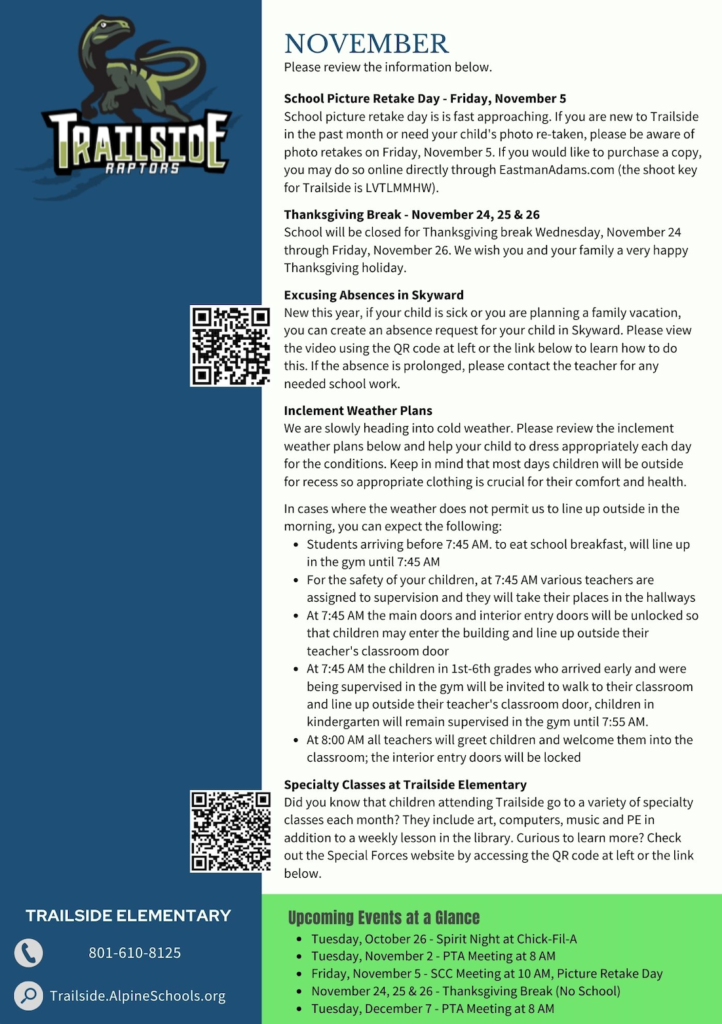
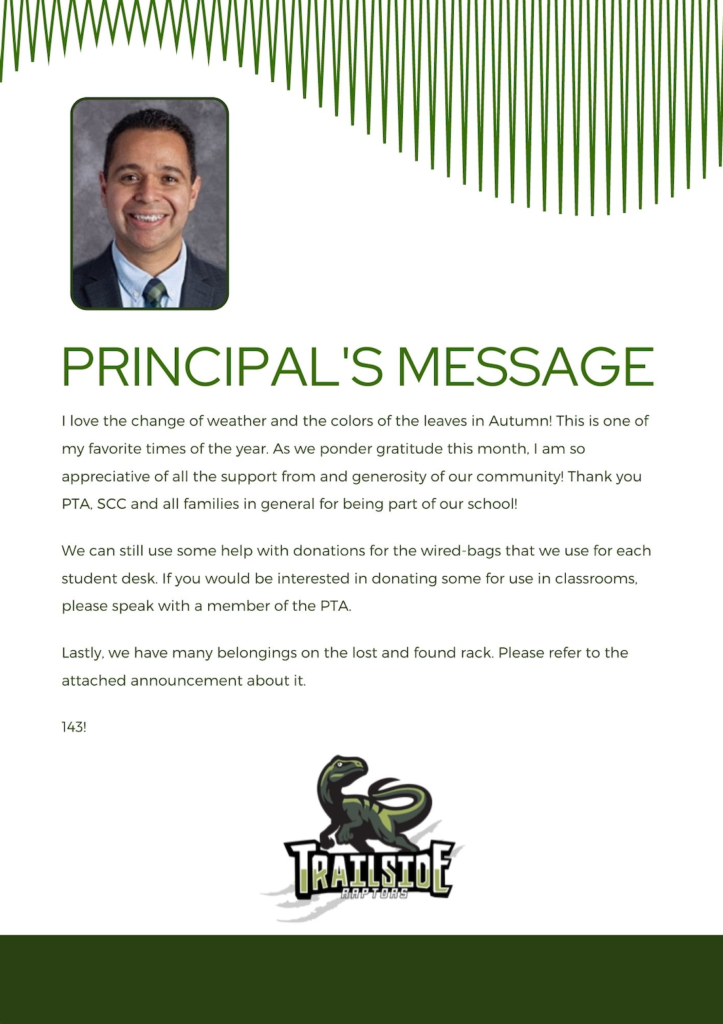
Everyday Strong
Your child seems grumpy and upset about something. They’re dragging their feet around, not wanting to do anything.
Or your child often complains about stomach aches or other physical ailments before school or a big event.
These are two examples of how physical symptoms are a manifestation of an emotional health concern. Helping a child feel safe, connected, or confident can help resolve some of these physical symptoms. Learn more ways about physical needs and emotional health in our Resilience Handbook.
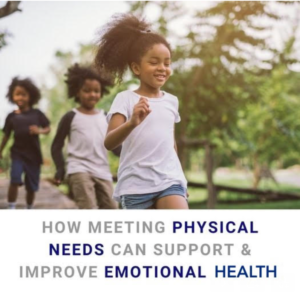

Sleep is essential for our kids. Chronic sleep deprivation isn’t a normal part of development. So, how can we help them develop a healthy relationship with sleep?
- Make the room cool and comfortable. Teach them that their bedroom is for sleeping, not relaxing, or watching TV.
- Once you establish a routine, stick to it.
- If your child wakes up in the middle of the night, walk them back to their bed. Help them learn to fall asleep on their own.
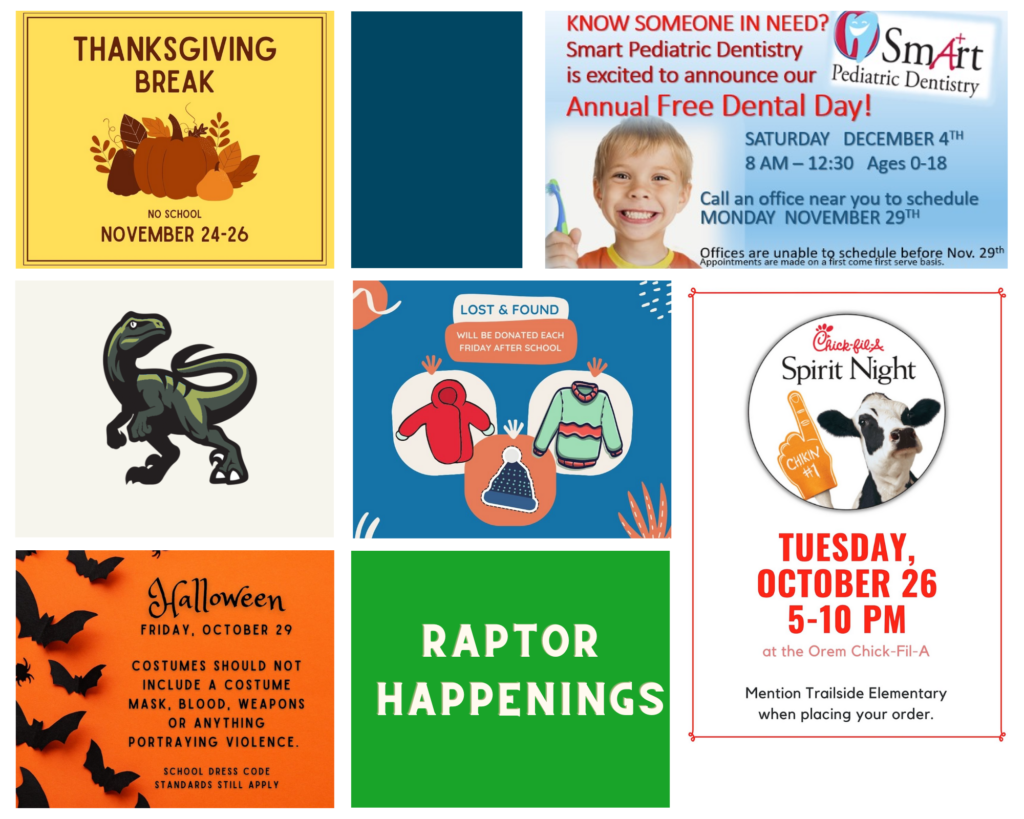
Counselor Corner
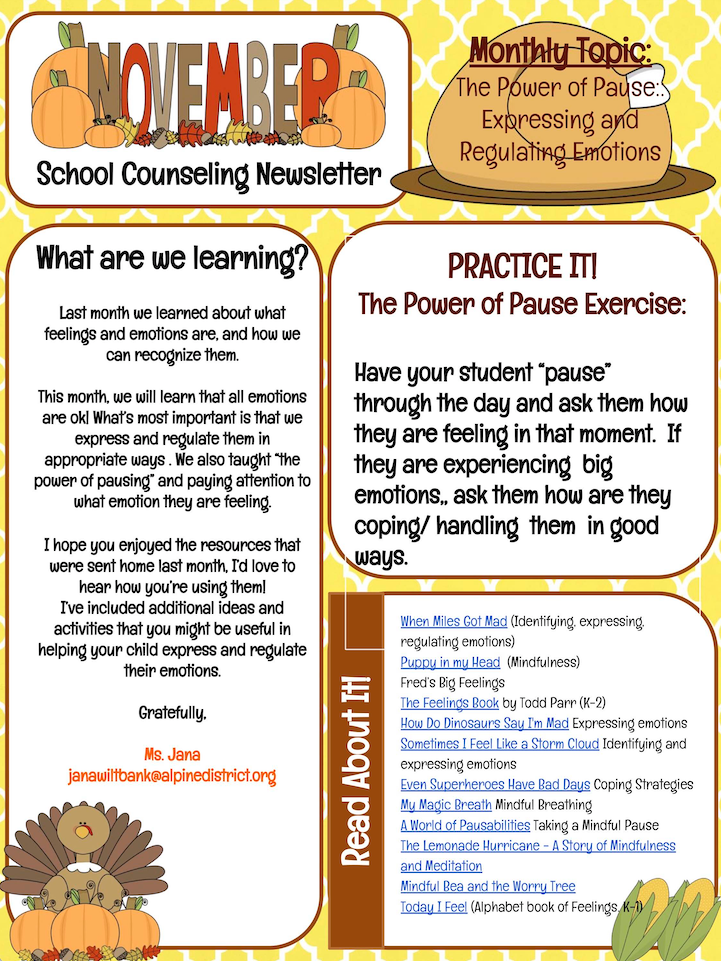
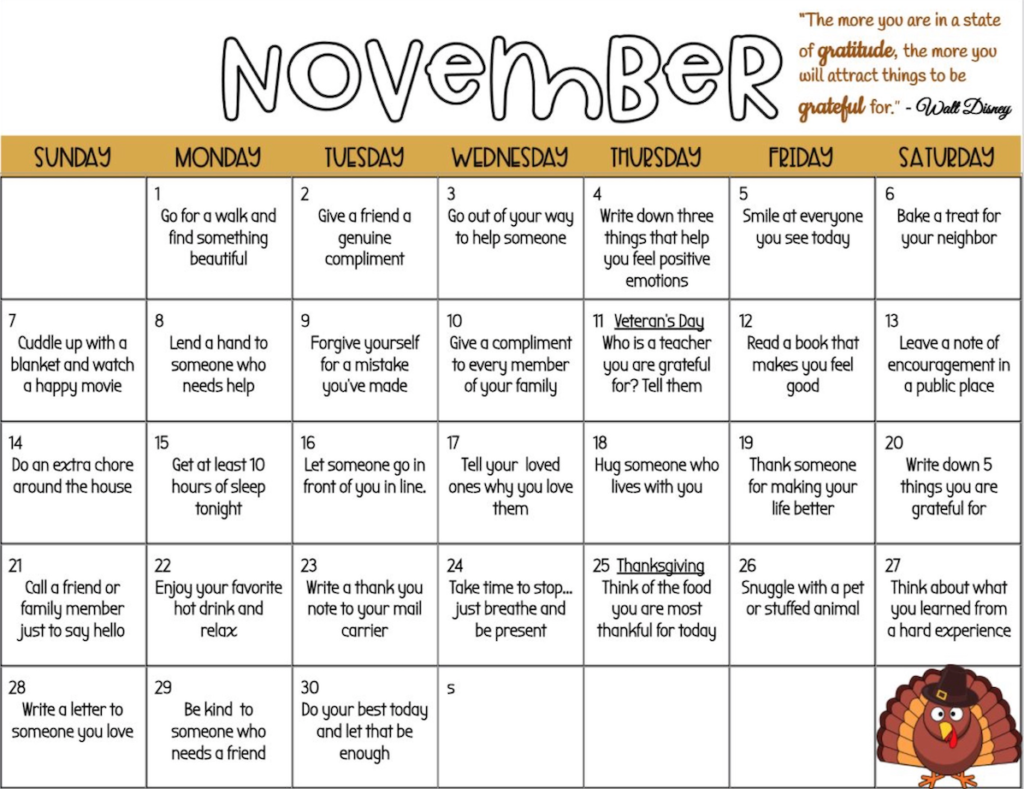

Rawwptor Haunt

October 2021
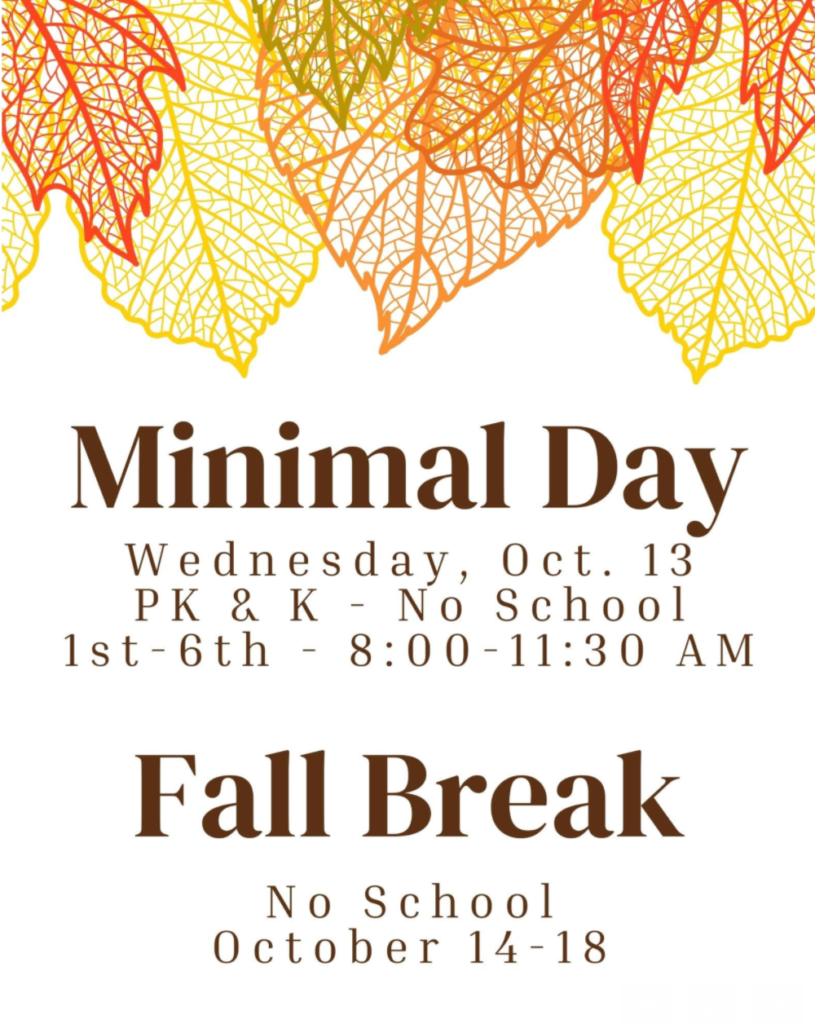

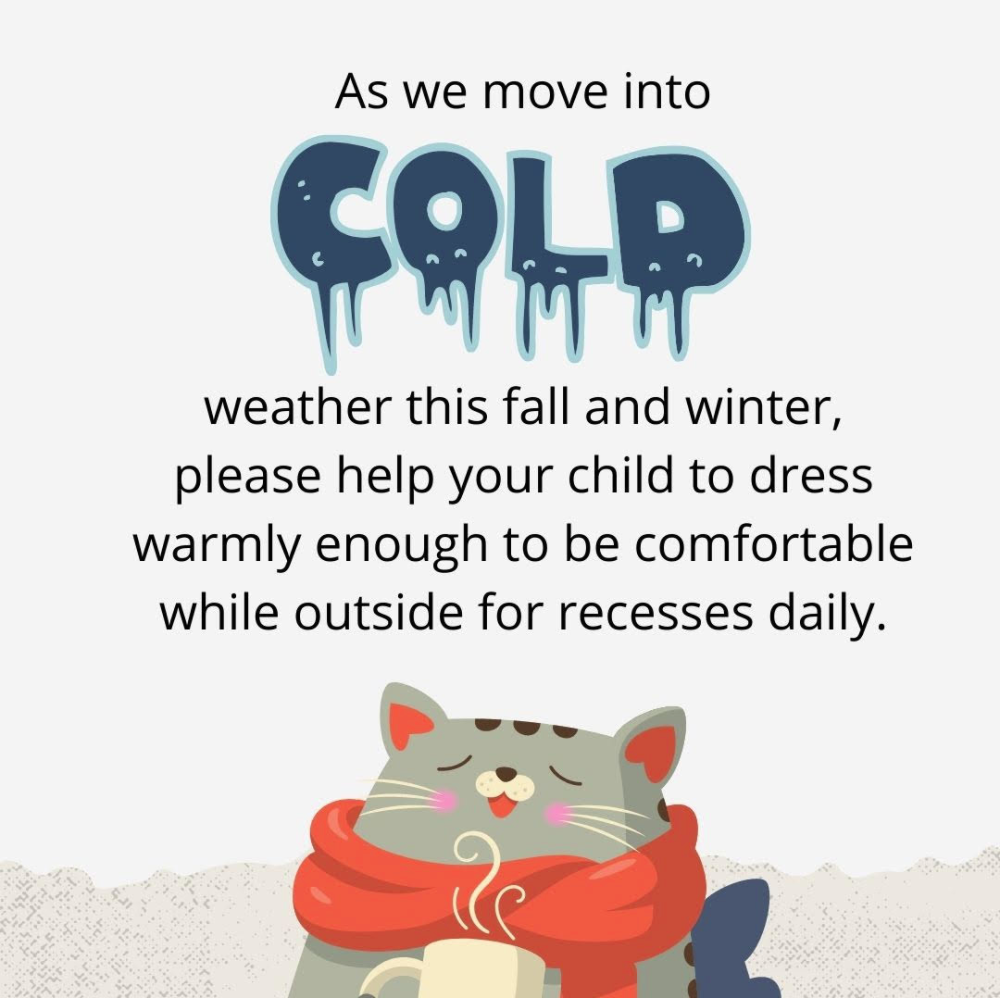
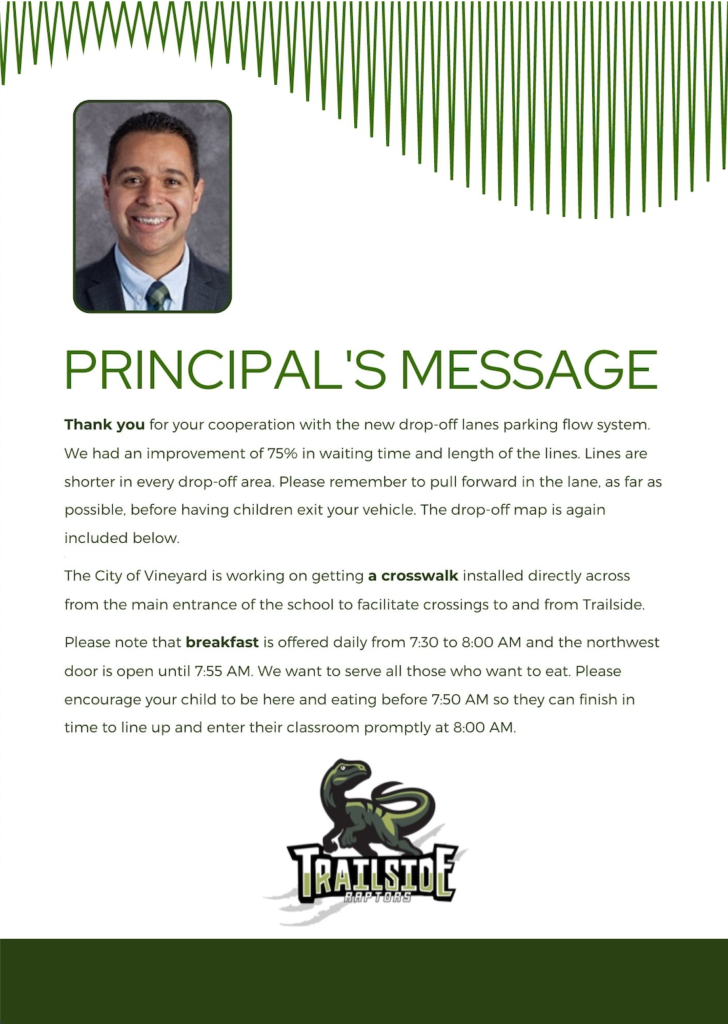
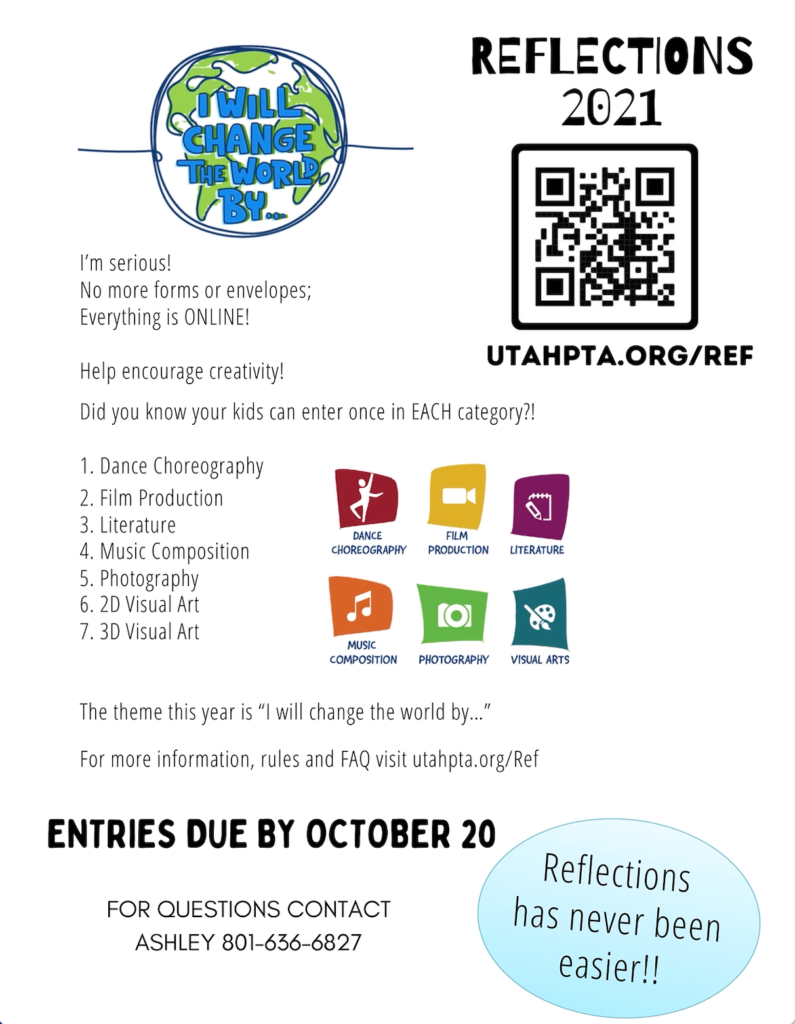
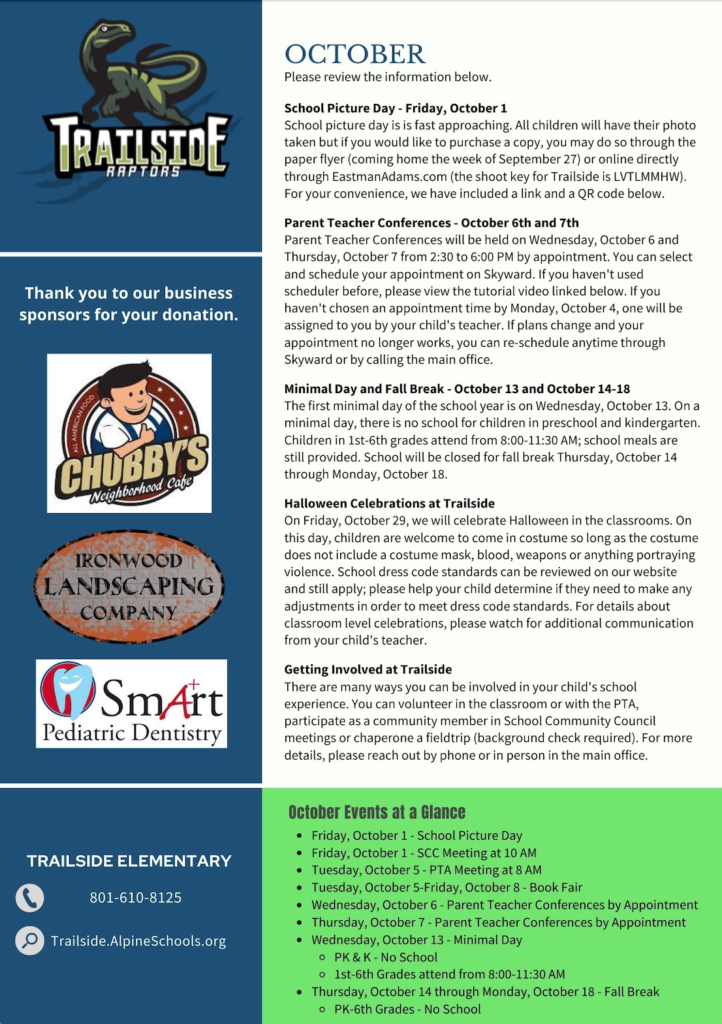
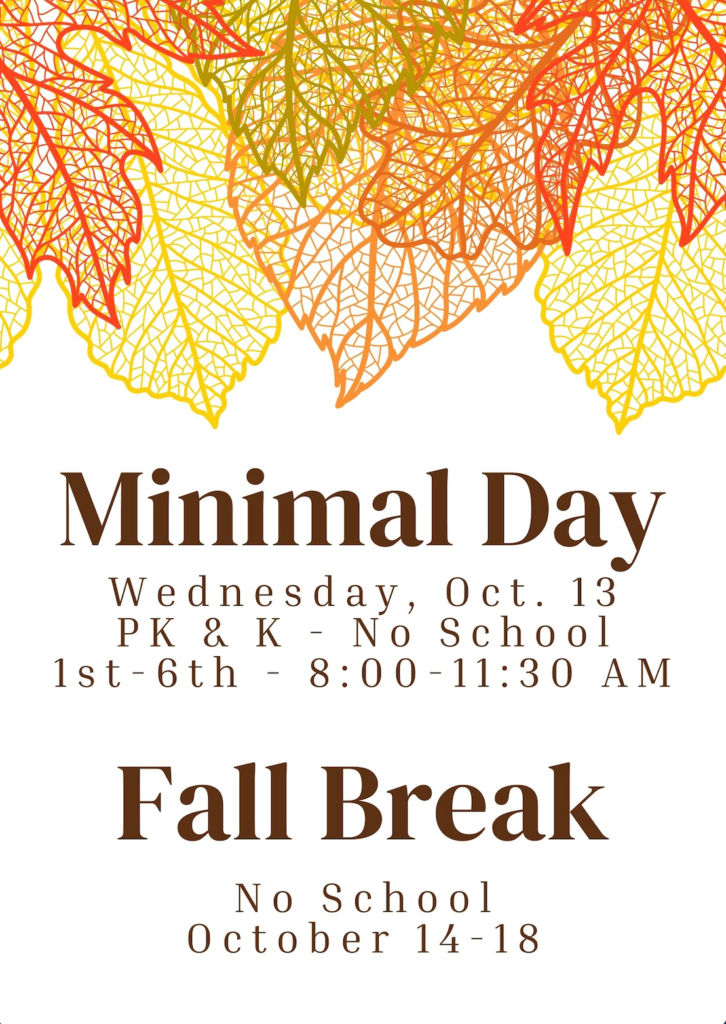
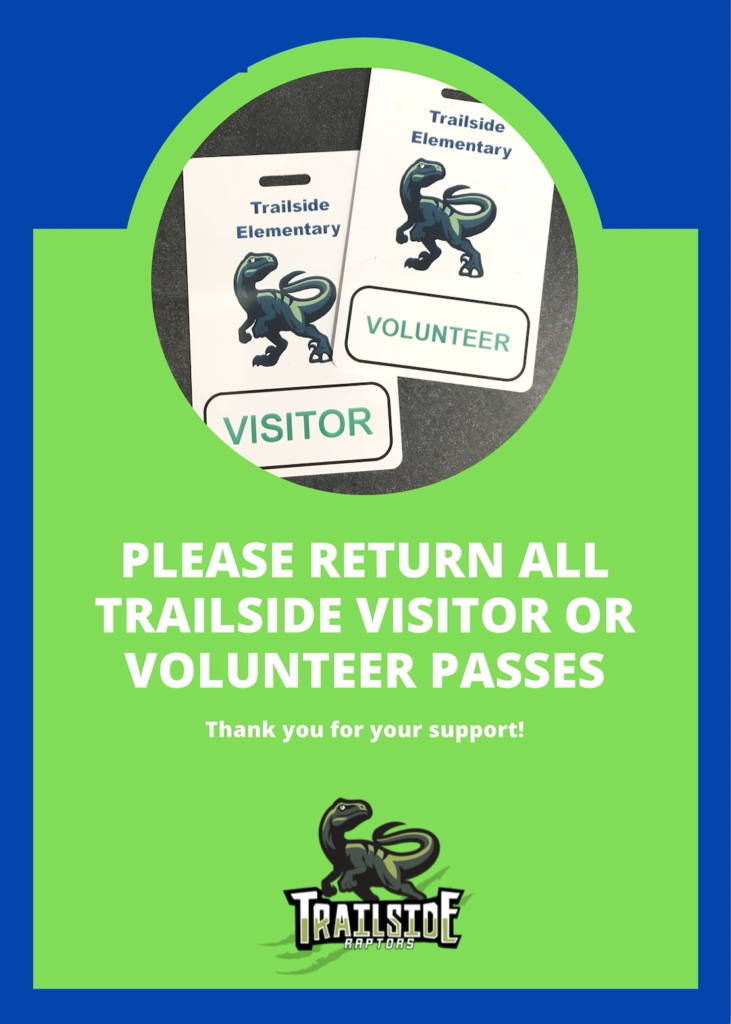

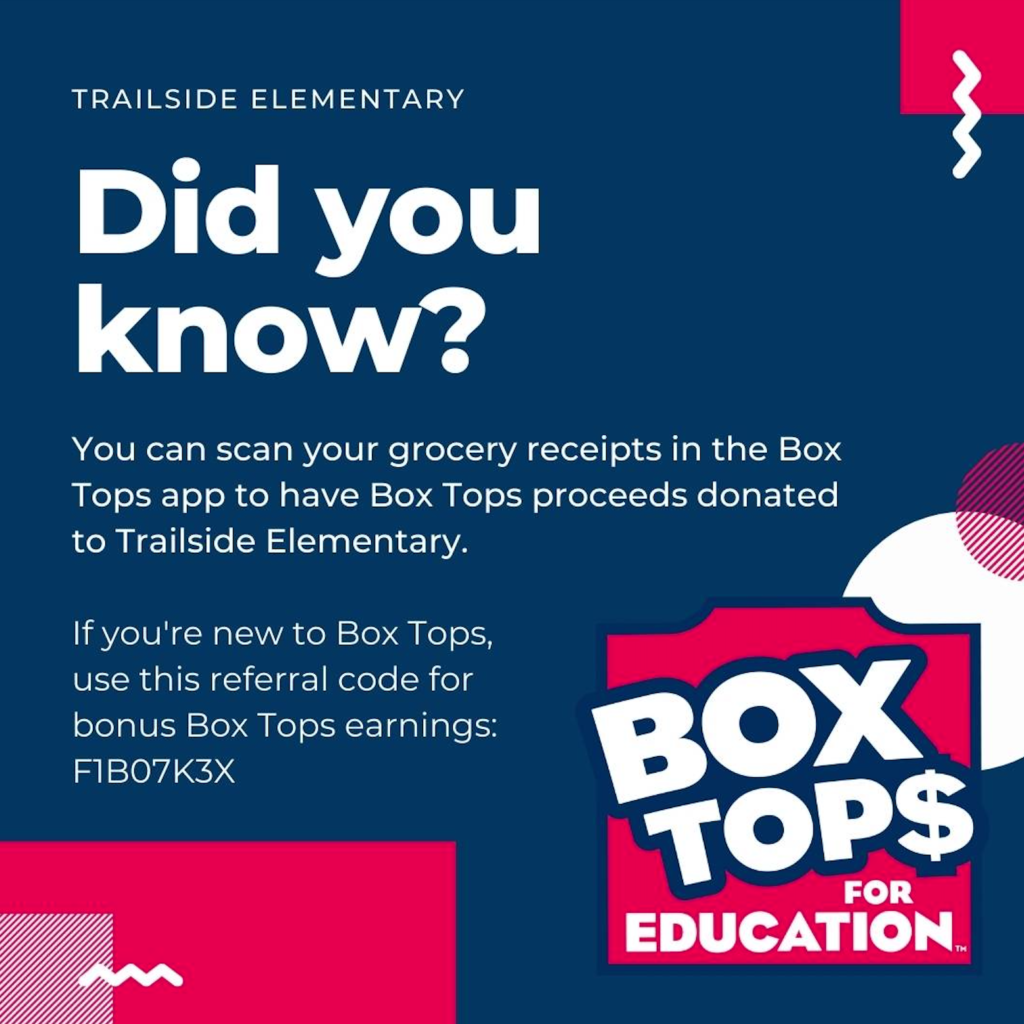


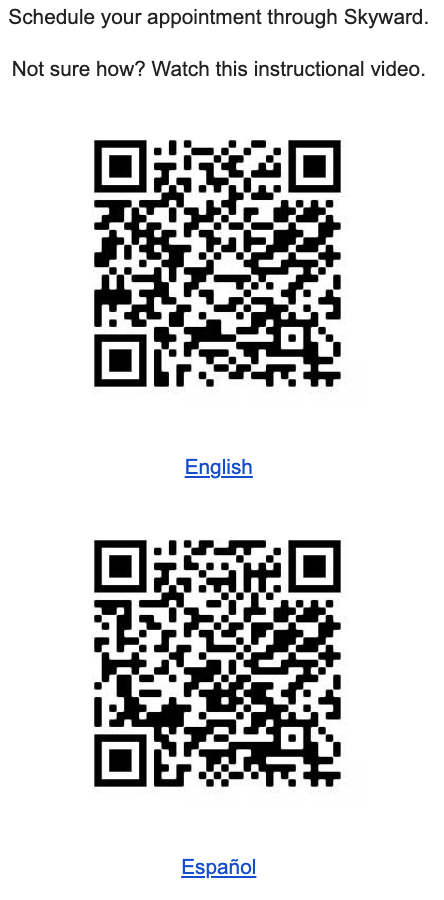
Please review the following information regarding changes to the drop-off lanes at Trailside Elementary. After reading, if you are willing to volunteer to help with drop-off and pick-up lane safety sometime in the first two weeks, please sign up here.
>>>
Starting on Monday, September 20 and in order to ensure the safety of our children and to allow for a good flow of traffic at drop-off and pick-up times, we will have designated turns out of the parking lots from 7:30-8:15 AM and 2:00-2:45 PM.
- The north parking lot (shown in blue) will be a RIGHT turn only exit.
- The south parking lot (shown in green) will be a LEFT turn only exit.
- The bus zone (shown in yellow) will be a LEFT turn only exit.
Safety Policies to Remember:
- Kids should exit/enter vehicle in drop-off zone only, not on streets
- Kids should exit/enter vehicle on the right side of the car only
- Come to a complete stop before kids exit/enter
- Pull all the way forward
- Driver should remain in vehicle in the drop-off zone; please park in a designated parking spot if you need to get out
Additional Kindergarten Policies:
- The official entrance for kindergarten will be the east gate (yellow zone); teachers will be out to open the gates
- Drop-off no earlier than 11:20 AM for afternoon kindergarten
- Do not park in drop-off zone; pull into a parking space if you need to get out
Every Day Strong
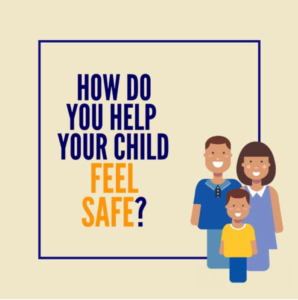
How do you calm an anxious mind?
When our kids are bothered by persistent fears and worries, what can you do to bring them back into the here and now? How can you help them feel safe when their world feels so threatening?
Teaching your kids mindfulness can help ground them. It can help them develop the stillness to calm their minds and focus. It teaches them that they are safe and secure even when surrounded by all the craziness.
But how can you teach a 10-year-old a skill many adults struggle to master?
Check out “The Power of Mindfulness” by the Child Mind Institute to learn how.
We’ll give you a hint. It all starts with stopping.

There is no good emotion. There is no bad emotion.
Emotions are merely messengers that inform. They inform us on how we are doing, what is happening, how we should respond.
Learn more about how we can work with our emotions in this week’s conversation with Jay Snyder.
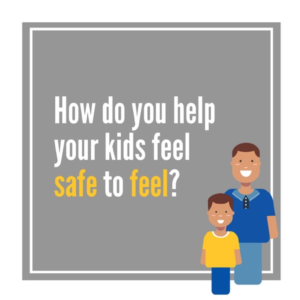
It’s Tuesday afternoon and your 9-year-old comes running through the door crying. She had to read her work aloud in class and everyone laughed.
She feels their judgments.
She feels shame.
She doesn’t feel safe.
How are you going to respond?
The way in which you listen and reply determines whether your child will feel safe sharing these emotions with you.
Learn more about how you can help your children feel “safe to feel” by watching our conversation with Jay Snyder LCSW. He describes how it’s ok to not be ok.
September 2021 Update
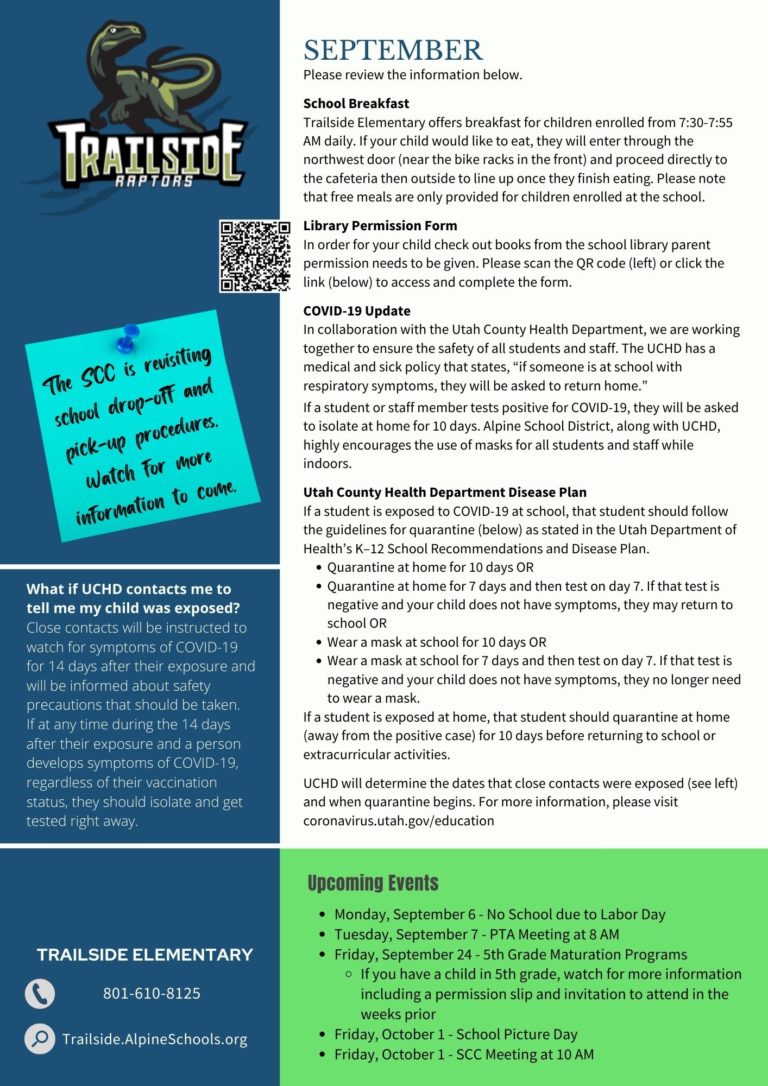
Zupas Foundraiser
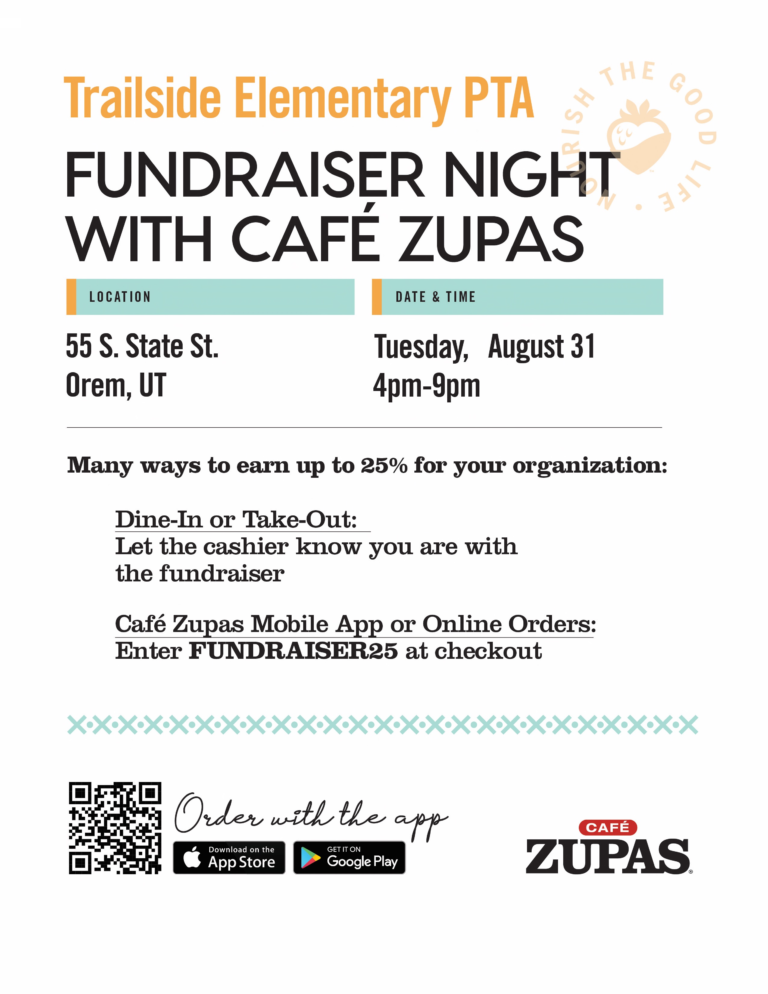
School Expectations

Kindergarten Class Lists
We are looking forward to the first day of kindergarten on Tuesday, August 24.
You will be able to view the name of the teacher your child will have in Skyward as of 10:30 AM on Monday. We are working to get all information entered. If you don’t know how to login to Skyward, you can call the main office on Monday between 8:00 AM and 3:30 PM to obtain your login credentials.
Back to School Night for kindergarten will be held on Monday evening from 5:30-7:30 PM. Be sure to stop by and meet your child’s teacher.
First Day of School
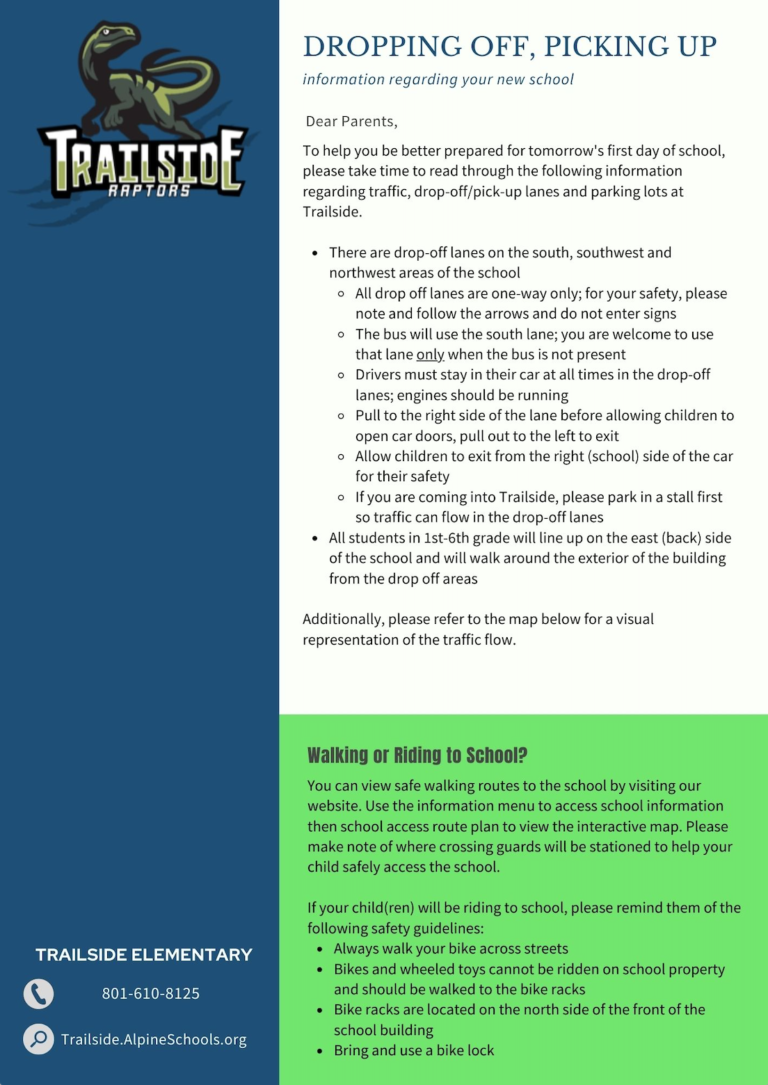

Back to School Night 2021
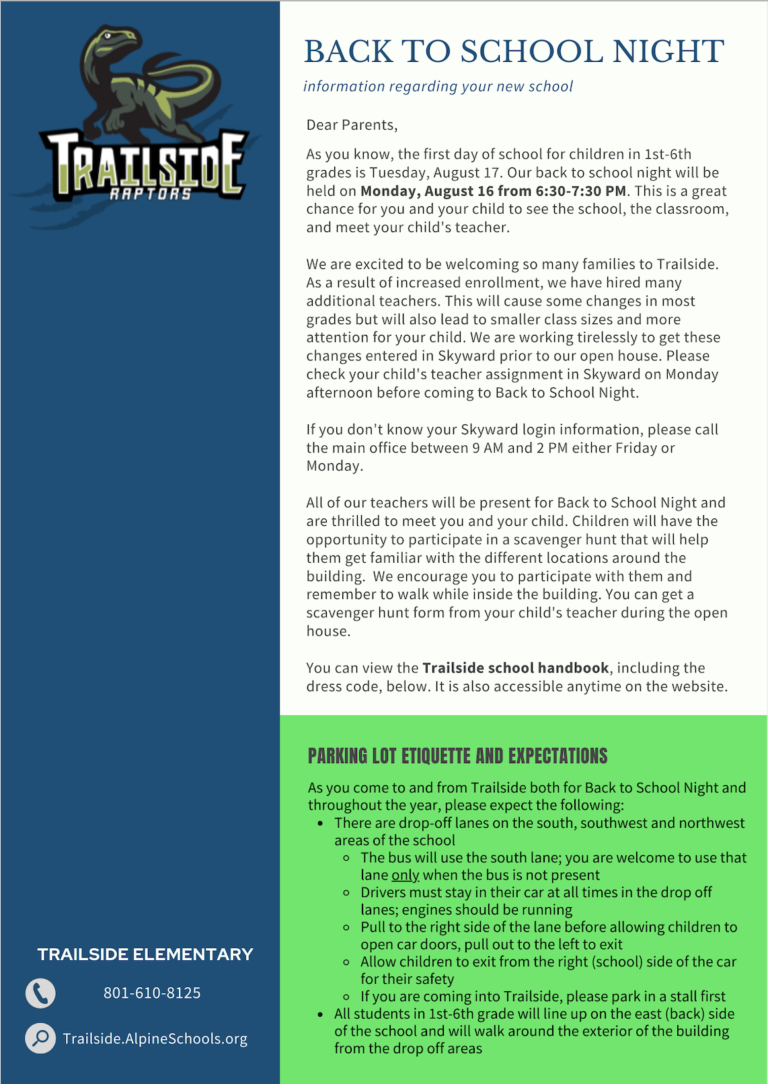
August 2021
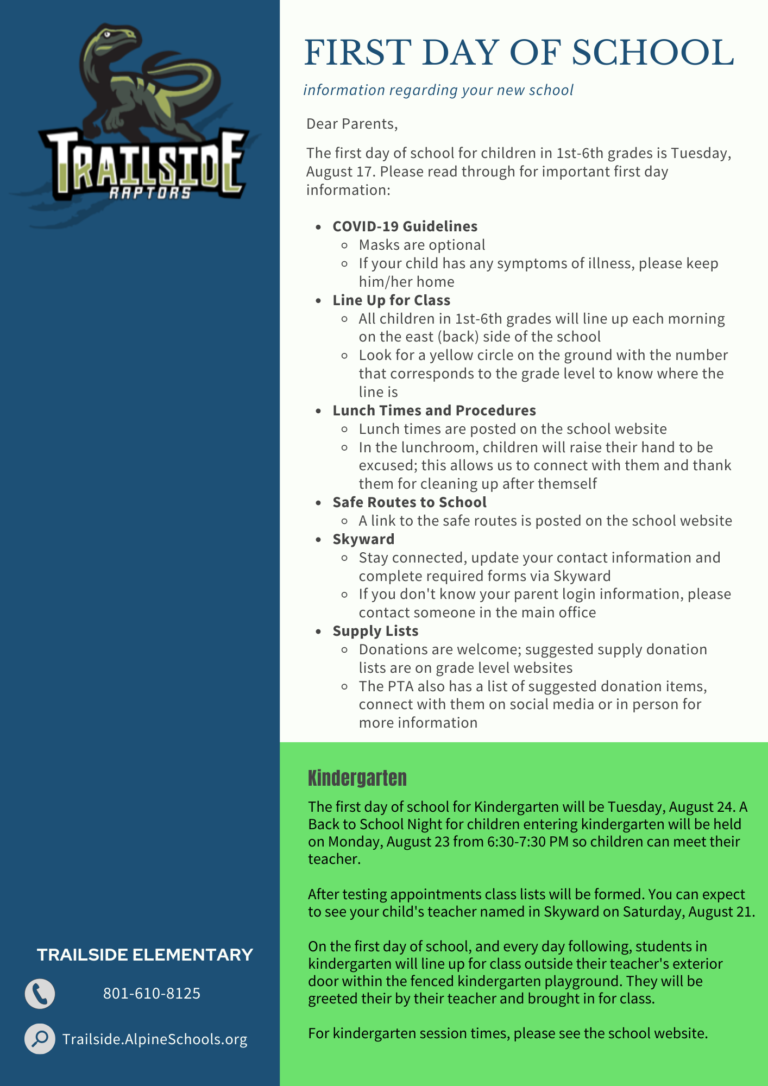
Open House Invitation

July 2021
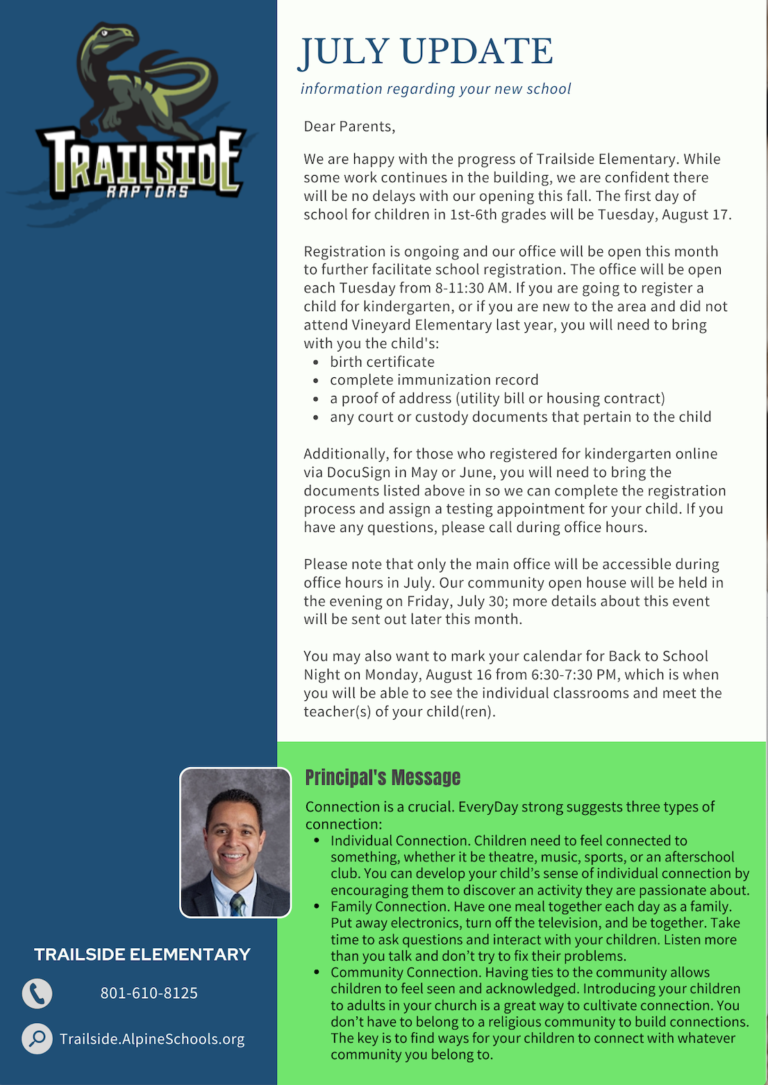
SCC Results
The election results are in! The following community members have been elected to serve on the School Community Council (SCC) for Trailside Elementary in the 2021-22 school year:
- Nikki Bristow
- Whitney Durfee
- Tawny Gause
- Jessica Walker
- Makenna Young
The council will meet later today and determine by council vote who will serve as SCC Chair, SCC Vice Chair and SCC Secretary as well as which members will serve one year and two year terms.
Thank you for your support of Trailside!
SCC Elections
It is time to vote for School Community Council Members (SCC) to serve at Trailside Elementary. We will have a council of seven, five community members and two faculty members. Of the five community members elected to serve, three will serve a two year term and two will serve a one year term to facilitate elections next year. The nominations came from the survey previously sent.
Click here to vote for SCC members. The election will be open from 1:00 PM to 11:59 PM (midnight) on Tuesday, May 25. Those elected will be notified on Wednesday, May 26.
Note: Only parents of students at the school vote for the parent positions and faculty members will vote for those willing to serve in faculty positions of the SCC.
May 2021

April 2021







